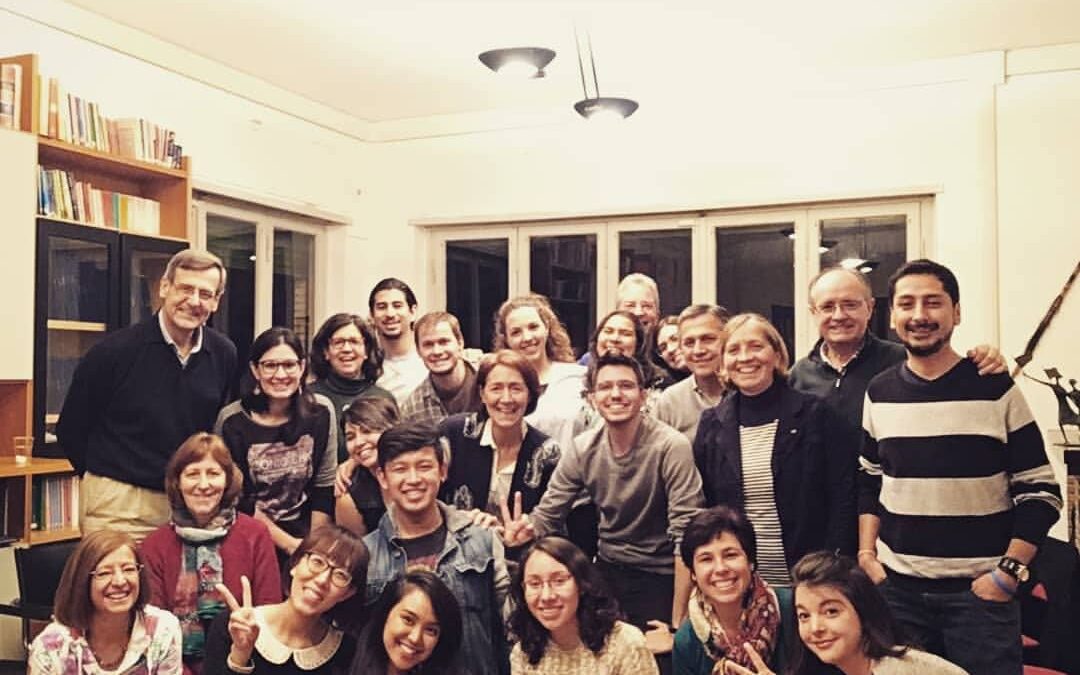
Feb 2, 2018 | Focolare Worldwide
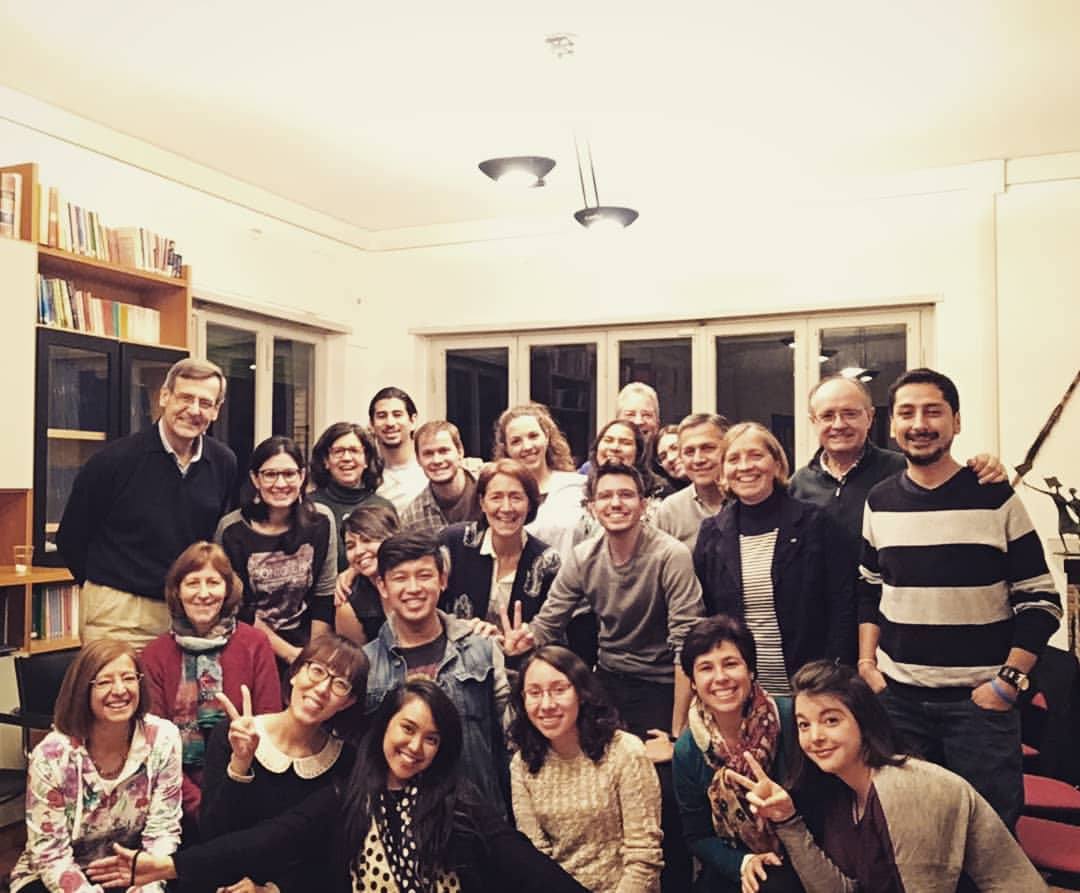 “I’m working in Italy working with some other young people my age for the upcoming 2018 Genfest in Manila.” Preparations are in full swing for the first Genfest ever held outside Europe. Nelson joined the international group of teenagers who were already at work, ever since he arrived in Italy in 2017 – first in Loppiano and then at the international Gen2 centre near Rome where we are interviewing him. “I come from El Salvador, the least expansive but most populated country in Central America. It’s a beautiful place, but has recently been hit by a civil war that lasted for 12 years and ended in 1992, leaving the country completely destroyed.” Nelson explains; “After the end of the war, many families found themselves looking for a place to settle and many parents emigrated, leaving their children with relatives or anyone who would take them in. But in the midst of the overall bewilderment, this resulted in an entire generation of boys and teenagers who were left without guidance or direction, or even anyone to show some genuine interest in them. To that was added the complication of getting the money earned outside the country to its destination in El Salvador. Many of these boys were left deprived of everything and began to leave school and roam the streets, seeking in delinquency the attention that they hadn’t found anwhere else. In short, recruiting adolescents, some of them quite young, they formed into many criminall groups who became more and more rooted and dangerous, each with its own name and symbolism, rituals and gestures.” “To uproot what seemed at first a simple problem to solve, the government launched a plan, which was also very violent, inprisoning anyone with a tatoo. The result was an unprecedented escalation of ferocious violence from the gangs that began to kill for no reason, to threaten more and more young people, forcing them into their groups. Before moving to Italy, I worked in San Miguel at a Salesian school which was dedicated to more than a thousand students who come from outside the city every week. Many of them have serious family problems, or parents enlisted in criminal groups, or even worse, they themselves are on the verge of joining. I taught physical education. One day, during swimming class, a boy wanted to jump into the pool without removing his shirt, even though that was against the rules. He was nervous and afraid. So I took him aside so that I could talk to him alone. I asked him the reason why. He told me that he had had himself tattooed with the symbol of a group, and didn’t want anyone to know. I gave him permissioin to get into the water with the shirt on, but afterwards, in class, I returned to the topic and we began to talk about ways of finding alternatives to criminality. Then, for the rest of the year, we tried to explain to him all of us together, that there’s always a way out, another way to live, far from violence. A few months later I saw him proudly wearing a work uniform, he had managed to leave the group which, thanks be to God had left him in peace. Now he’s providing for his family. ‘Thanks Prof. Thanks to all of you who helped me to realize that I could be a different person from what I started out to be. Thank you mostly for helping me to change the direction of my life.’” Chiara Favotti
“I’m working in Italy working with some other young people my age for the upcoming 2018 Genfest in Manila.” Preparations are in full swing for the first Genfest ever held outside Europe. Nelson joined the international group of teenagers who were already at work, ever since he arrived in Italy in 2017 – first in Loppiano and then at the international Gen2 centre near Rome where we are interviewing him. “I come from El Salvador, the least expansive but most populated country in Central America. It’s a beautiful place, but has recently been hit by a civil war that lasted for 12 years and ended in 1992, leaving the country completely destroyed.” Nelson explains; “After the end of the war, many families found themselves looking for a place to settle and many parents emigrated, leaving their children with relatives or anyone who would take them in. But in the midst of the overall bewilderment, this resulted in an entire generation of boys and teenagers who were left without guidance or direction, or even anyone to show some genuine interest in them. To that was added the complication of getting the money earned outside the country to its destination in El Salvador. Many of these boys were left deprived of everything and began to leave school and roam the streets, seeking in delinquency the attention that they hadn’t found anwhere else. In short, recruiting adolescents, some of them quite young, they formed into many criminall groups who became more and more rooted and dangerous, each with its own name and symbolism, rituals and gestures.” “To uproot what seemed at first a simple problem to solve, the government launched a plan, which was also very violent, inprisoning anyone with a tatoo. The result was an unprecedented escalation of ferocious violence from the gangs that began to kill for no reason, to threaten more and more young people, forcing them into their groups. Before moving to Italy, I worked in San Miguel at a Salesian school which was dedicated to more than a thousand students who come from outside the city every week. Many of them have serious family problems, or parents enlisted in criminal groups, or even worse, they themselves are on the verge of joining. I taught physical education. One day, during swimming class, a boy wanted to jump into the pool without removing his shirt, even though that was against the rules. He was nervous and afraid. So I took him aside so that I could talk to him alone. I asked him the reason why. He told me that he had had himself tattooed with the symbol of a group, and didn’t want anyone to know. I gave him permissioin to get into the water with the shirt on, but afterwards, in class, I returned to the topic and we began to talk about ways of finding alternatives to criminality. Then, for the rest of the year, we tried to explain to him all of us together, that there’s always a way out, another way to live, far from violence. A few months later I saw him proudly wearing a work uniform, he had managed to leave the group which, thanks be to God had left him in peace. Now he’s providing for his family. ‘Thanks Prof. Thanks to all of you who helped me to realize that I could be a different person from what I started out to be. Thank you mostly for helping me to change the direction of my life.’” Chiara Favotti

Feb 1, 2018 | Non categorizzato
 An Immediate Response We bought firewood and kerosene for the winter, in early summer. But it was already autmn and we didn’t have the money for the heating. One day, talking among ourselves in the family, we said: “The Eternal Father knows our needs and the important thing is trust in Him.” We hadn’t even finished saying it, when our friend arrived with an envelope full of money from a collection that had been taken. It had never happened to us before, to receive such a quick answer from God who cares for his children! I.S. – Serbia From the Dentist There was a boy in our community with very bad teeth, but being from a poor family he couldn’t afford to get them fixed. One day, we took him to a dentist, but when we got to the dentist’s office, we realized that all the patients were wealthy people. Trustin in Providence, we went in anyway. After the visit, the doctor asked us if we could afford such a costly procedure. We explained that we and our friends had held held a sale to help cover the expenses. The doctor became curious and wanted to know more. “You can pay me what you have,” she concluded. As we were leaving, she called us back and said: “You know, I’m going through a lot of problems and I thought I could do it for free, if you pray for me.” That’s what we did. Some time later the doctor told us that our presence brought a note of peace and joy to her work. G.B. – Pilippines Meetings in Jail Aware that there were many lonely people who needed someone to accompany them, we decided to go and visit the patients in a hospital, prisoners and teenagers in an orphanage. We brought toys and clothes for the orphans. Then we said: Why not use the means of communication to reach out to the most people possible? We obtained a half hour of radio time from a local radio. Many listeners were listening to our programm. When we went back to the jail, they welcomed us saying that, after listening to our radio program, they were waiting for us to come. Usually kids like us aren’t allowed into the jail, but they made an exception for us. With songs and dances, we shared our expeirences of living the Gospel, with men and women detainees, a dozen or so guards. They invited us to come back again. The local newspaper covered the news of this encounter in the jail. A group of friends – Uganda Illness When I learned that Monique had ALS disease, even though we hadn’t seen one another for two years, I went back to get in touch with her and see if there was anything I could do. We had been greatly in love, but for various reasons had drifted apart. Monique’s simple faith clashed with my agnosticism. Being at her side as she accepted the new situation with peace and serenity, I went through a complete change of mentality. A Christian would call it conversion. By the time her illness reached the terminal stage, I found myself completely changed. I’m not saying that I found the fith, but the respect for Monique had created a new space in my. J. M. – France
An Immediate Response We bought firewood and kerosene for the winter, in early summer. But it was already autmn and we didn’t have the money for the heating. One day, talking among ourselves in the family, we said: “The Eternal Father knows our needs and the important thing is trust in Him.” We hadn’t even finished saying it, when our friend arrived with an envelope full of money from a collection that had been taken. It had never happened to us before, to receive such a quick answer from God who cares for his children! I.S. – Serbia From the Dentist There was a boy in our community with very bad teeth, but being from a poor family he couldn’t afford to get them fixed. One day, we took him to a dentist, but when we got to the dentist’s office, we realized that all the patients were wealthy people. Trustin in Providence, we went in anyway. After the visit, the doctor asked us if we could afford such a costly procedure. We explained that we and our friends had held held a sale to help cover the expenses. The doctor became curious and wanted to know more. “You can pay me what you have,” she concluded. As we were leaving, she called us back and said: “You know, I’m going through a lot of problems and I thought I could do it for free, if you pray for me.” That’s what we did. Some time later the doctor told us that our presence brought a note of peace and joy to her work. G.B. – Pilippines Meetings in Jail Aware that there were many lonely people who needed someone to accompany them, we decided to go and visit the patients in a hospital, prisoners and teenagers in an orphanage. We brought toys and clothes for the orphans. Then we said: Why not use the means of communication to reach out to the most people possible? We obtained a half hour of radio time from a local radio. Many listeners were listening to our programm. When we went back to the jail, they welcomed us saying that, after listening to our radio program, they were waiting for us to come. Usually kids like us aren’t allowed into the jail, but they made an exception for us. With songs and dances, we shared our expeirences of living the Gospel, with men and women detainees, a dozen or so guards. They invited us to come back again. The local newspaper covered the news of this encounter in the jail. A group of friends – Uganda Illness When I learned that Monique had ALS disease, even though we hadn’t seen one another for two years, I went back to get in touch with her and see if there was anything I could do. We had been greatly in love, but for various reasons had drifted apart. Monique’s simple faith clashed with my agnosticism. Being at her side as she accepted the new situation with peace and serenity, I went through a complete change of mentality. A Christian would call it conversion. By the time her illness reached the terminal stage, I found myself completely changed. I’m not saying that I found the fith, but the respect for Monique had created a new space in my. J. M. – France
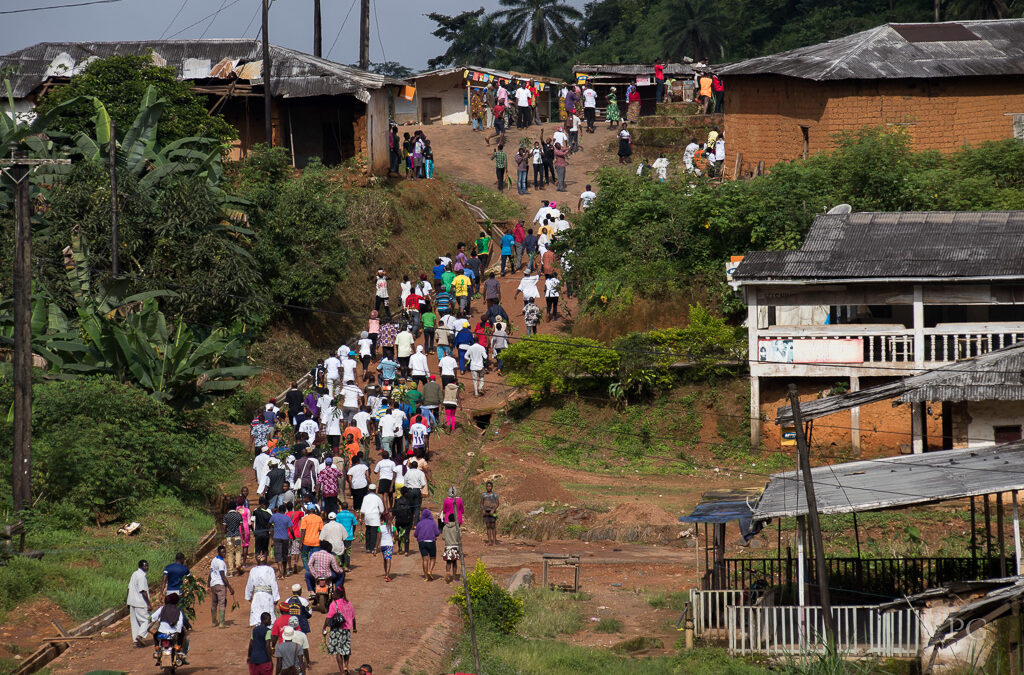
Jan 31, 2018 | Focolare Worldwide
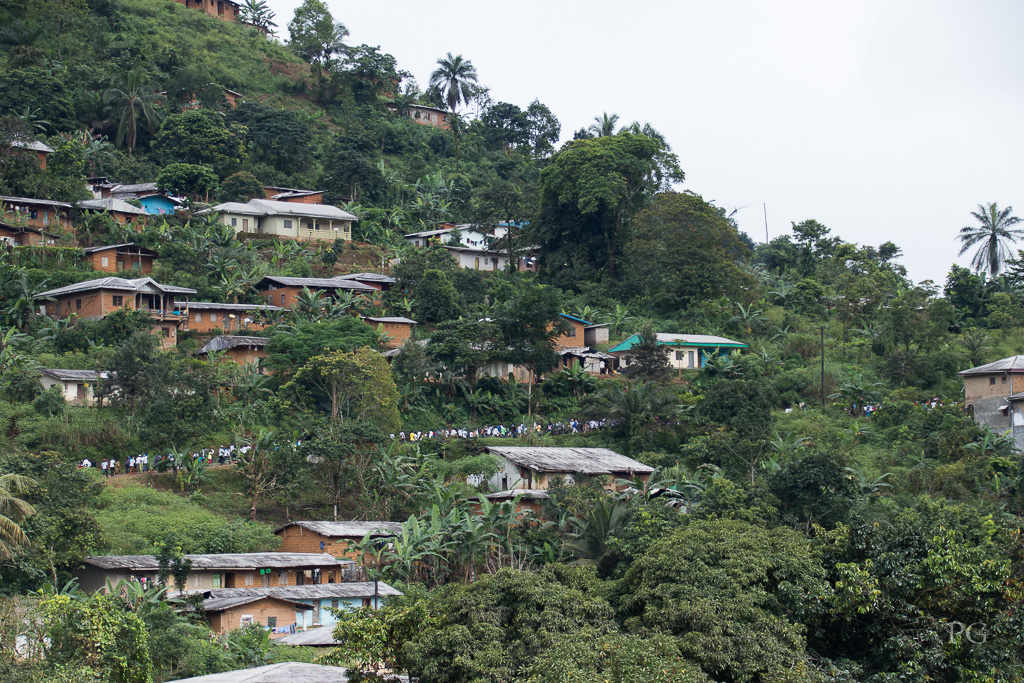 Cameroon, in the equatorial region of West Africa, is composed of two groups of regions that speak French and English respectively. The differences between them are not limited to language, but also some aspects of public administration. An escalation of violence is threatening the country of 23 million people livining within a territory of 475 thousand square kilometers. Raphaël Takougang, a Cameroonian lawyer and member of the Focolare, who now lives in Italy, explains: “The francophone part became independent on January 1, 1960. For the English-speaking part there was a referendum on October 1, 1961 to decide whether or not to join neighbouring Nigeria, which was already Anglophone, or stay with Cameroon. The northern part of this region chose to join Nigeria, the south preferred to stay with Cameroon. Thus was born a Federal Republic with two states, East Cameroon and South Cameroon, each with its own institutions – Parliament, government, legal systems – and others at the federal level. On May 20, 1972, another referendum resulted in the United Republic of Cameroon. In 1984, a small change in the Constitution removed the word “united” and, from then on, the country has been called the Republic of Cameroon. Ever since 1972 the malaise has been growing among the Anglophones who are a strong minority in the country, and there is even a name for it: the Anglophone problem.
Cameroon, in the equatorial region of West Africa, is composed of two groups of regions that speak French and English respectively. The differences between them are not limited to language, but also some aspects of public administration. An escalation of violence is threatening the country of 23 million people livining within a territory of 475 thousand square kilometers. Raphaël Takougang, a Cameroonian lawyer and member of the Focolare, who now lives in Italy, explains: “The francophone part became independent on January 1, 1960. For the English-speaking part there was a referendum on October 1, 1961 to decide whether or not to join neighbouring Nigeria, which was already Anglophone, or stay with Cameroon. The northern part of this region chose to join Nigeria, the south preferred to stay with Cameroon. Thus was born a Federal Republic with two states, East Cameroon and South Cameroon, each with its own institutions – Parliament, government, legal systems – and others at the federal level. On May 20, 1972, another referendum resulted in the United Republic of Cameroon. In 1984, a small change in the Constitution removed the word “united” and, from then on, the country has been called the Republic of Cameroon. Ever since 1972 the malaise has been growing among the Anglophones who are a strong minority in the country, and there is even a name for it: the Anglophone problem. 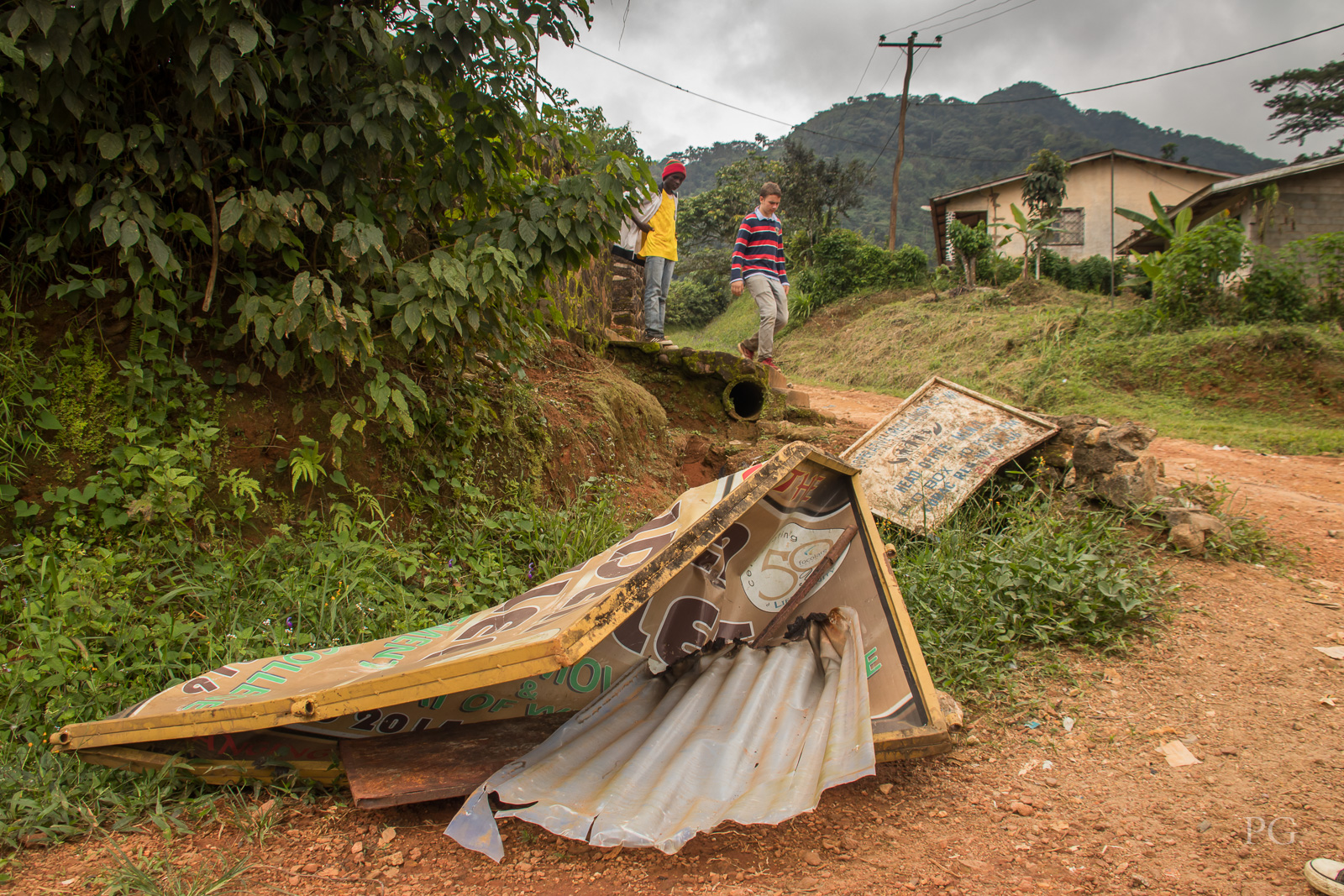 Ever since 2016 the crisis situation in the Anglophone region set off a series of strikes, first against teachers, then against lawyers. The people of the Mariapolis in Fontem, in the very heart of the Cameroon forest, explain: “While on the one hand the bishops had always encouraged dialogue, the boycotting of educational and justice institutions had an unexpected result on the crisis, which worsened with an escalation of strikes also among commercial businesses and transportation systems, in accordance with a strategy known as “Dead City.” No students showed up for the beginning of the last year school year. Despite the threats of reprisals against transgressors, here and there, some schools courageously opened their doors and others followed their example. The OLSW College in Fontem also resumed classes.” The Mariapolis in Fontem was born from the testimony of concrete love of some doctors, who arrived there in 1966, after the local bishop appealed to Chiara Lubich to take care of the Bangwa people, who were suffering from a very high infant mortality rate that was leading to their extinction. In a short time, thanks to the contribution of people from all over the world, Fontem equipped itself with schools, a hospital and other service facilities. Since then, the Bangwa people and several other neighbouring peoples have set out on the path of fraternity, which can be seen now in other citadels that have begun on the African continent. With its 80 thousand citizens, Fontem is a meeting and training place for people from all over Africa and the world. Here they experience how the exchange and collaboration among men and women of different races, cultures and traditions can bear fruits of brotherhood even in regions battered by conflicts.
Ever since 2016 the crisis situation in the Anglophone region set off a series of strikes, first against teachers, then against lawyers. The people of the Mariapolis in Fontem, in the very heart of the Cameroon forest, explain: “While on the one hand the bishops had always encouraged dialogue, the boycotting of educational and justice institutions had an unexpected result on the crisis, which worsened with an escalation of strikes also among commercial businesses and transportation systems, in accordance with a strategy known as “Dead City.” No students showed up for the beginning of the last year school year. Despite the threats of reprisals against transgressors, here and there, some schools courageously opened their doors and others followed their example. The OLSW College in Fontem also resumed classes.” The Mariapolis in Fontem was born from the testimony of concrete love of some doctors, who arrived there in 1966, after the local bishop appealed to Chiara Lubich to take care of the Bangwa people, who were suffering from a very high infant mortality rate that was leading to their extinction. In a short time, thanks to the contribution of people from all over the world, Fontem equipped itself with schools, a hospital and other service facilities. Since then, the Bangwa people and several other neighbouring peoples have set out on the path of fraternity, which can be seen now in other citadels that have begun on the African continent. With its 80 thousand citizens, Fontem is a meeting and training place for people from all over Africa and the world. Here they experience how the exchange and collaboration among men and women of different races, cultures and traditions can bear fruits of brotherhood even in regions battered by conflicts. 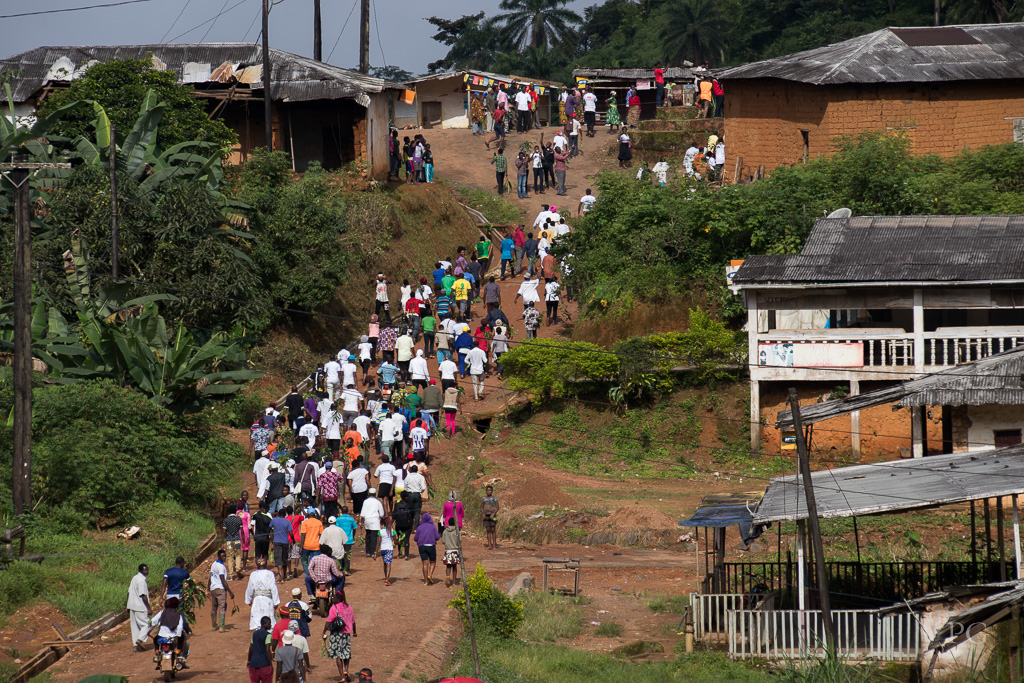 “The Catholic college in Fontem suffered an attack,” the locals have reported, “but many people of the village have come to help students and teachers, even at the risk of their own lives. With the approach of the anniversary of the aforementioned referendum, of October 1, which is such an historical date for the Anglophone region of Cameroon, violent demonstrations were feared, and the Focolare community organized prayer groups that included people from other regions of the country and from abroad. There has been no loss of life in Fontem. Every occasion is good for building relationships with the various civil, traditional and ecclesial authorities. We try to help those near to us to go beyond the fears, to create family moments, starting from those closest to us, who are often confused by the many voices and the media. The young people have organized “talent show” evenings and the “Sports for Peace” event to promote a more positive spirit “. “All during this period, even in the midst of difficulties – they conclude – the life of the Focolare community has continued. We hope that this challenge of love for all will enable us to discern and to act for the good of our country “.
“The Catholic college in Fontem suffered an attack,” the locals have reported, “but many people of the village have come to help students and teachers, even at the risk of their own lives. With the approach of the anniversary of the aforementioned referendum, of October 1, which is such an historical date for the Anglophone region of Cameroon, violent demonstrations were feared, and the Focolare community organized prayer groups that included people from other regions of the country and from abroad. There has been no loss of life in Fontem. Every occasion is good for building relationships with the various civil, traditional and ecclesial authorities. We try to help those near to us to go beyond the fears, to create family moments, starting from those closest to us, who are often confused by the many voices and the media. The young people have organized “talent show” evenings and the “Sports for Peace” event to promote a more positive spirit “. “All during this period, even in the midst of difficulties – they conclude – the life of the Focolare community has continued. We hope that this challenge of love for all will enable us to discern and to act for the good of our country “.
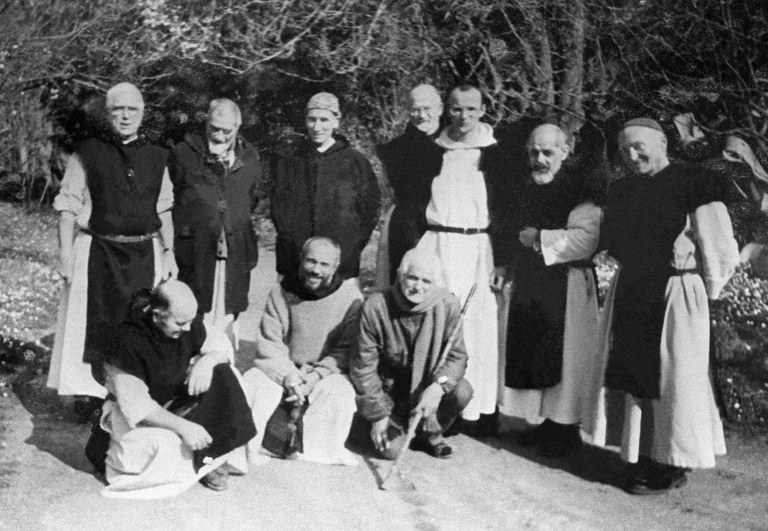
Jan 31, 2018 | Focolare Worldwide
 The Vatican has promulgated the decree attesting to the martyrdom of the 7 monks of Tibhirine, among whom Msgr Pierre Claverie, Bishop of Orano, and the other 11 male and female consecrated religious, killed between 1994 and 1996 during the Algerian civil war which caused the death of thousands of innocent people among which journalists, writers, Imams and common folk. A movie entitled “Of Gods and Men” was made about the 7 Trappist monks who were abducted from their abbey of Our Lady of Atlante (80 km from Algiers) and slain in still obscure circumstances. These vicissitudes reached their peak in August 1996, when the Dominican Bishop of Orano, fervid defender of the reconciliation between Muslims and Christians, was killed together with his Muslim driver, by a bomb at the entrance of his house. The spokesman of the French Bishops’ Conference said “They are martyrs of love because they loved up to the end, giving their lives for their Algerian friends. For us it is a sign that love is not vain and will triumph.” The Algerian bishops commented “Our Church is rejoicing” associating to their homage “the thousands of people who were not afraid to risk their own lives for their fidelity in the faith in God, their country and their conscience.”
The Vatican has promulgated the decree attesting to the martyrdom of the 7 monks of Tibhirine, among whom Msgr Pierre Claverie, Bishop of Orano, and the other 11 male and female consecrated religious, killed between 1994 and 1996 during the Algerian civil war which caused the death of thousands of innocent people among which journalists, writers, Imams and common folk. A movie entitled “Of Gods and Men” was made about the 7 Trappist monks who were abducted from their abbey of Our Lady of Atlante (80 km from Algiers) and slain in still obscure circumstances. These vicissitudes reached their peak in August 1996, when the Dominican Bishop of Orano, fervid defender of the reconciliation between Muslims and Christians, was killed together with his Muslim driver, by a bomb at the entrance of his house. The spokesman of the French Bishops’ Conference said “They are martyrs of love because they loved up to the end, giving their lives for their Algerian friends. For us it is a sign that love is not vain and will triumph.” The Algerian bishops commented “Our Church is rejoicing” associating to their homage “the thousands of people who were not afraid to risk their own lives for their fidelity in the faith in God, their country and their conscience.”
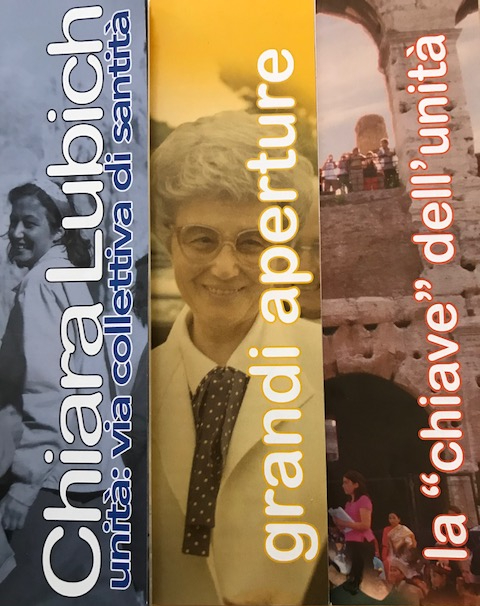
Jan 30, 2018 | Non categorizzato
I n the framework of the Cause of Beatification of the Servant of God Chiara Lubich, which opened on 27 January 2015 in the Diocese of Frascati, a practical brochure with all-encompassing contents on the figure of the Founder of the Focolare Movement has been released, and is momentarily available in Italian. The new publication aims at illustrating, in a simple communicative language, her intense life and the numberless works and initiatives she promoted. It is structured in three parts: Chiara and the charism of unity; the “great openings or dialogues in the ecumenical, interreligious and contemporary cultural fields; and her spiritual insight into the mystery of “Jesus Forsaken,” which she understood, lived and proposed as the “key” to achieving unity with God, and among peoples. The idea of preparing a biographic Profile arose from the need to divulge some of the intense work of the “collection” which the Postulation of the Cause of beatification of Chiara is doing, starting from what she said about sanctity, and of how she lived it and proposed it to all, starting from the letters she wrote in the early years of the movement. The drafting of the text was shared along all the phases of elaboration, not only by the members of the Postulation but also by experts, friends, elderly and the youth. Those who wish to receive one or more paper copies may address: Postulation of the Cause of Beatification of Chiara Silvia Lubich Focolare Movement Via Frascati, 306 – 00040 Rocca di Papa (RM) – Italia Telefono +39 06 947 981 39 – Cell. +39 389 343 9529 E-mail: postulazionechiaralubich@focolare.org
n the framework of the Cause of Beatification of the Servant of God Chiara Lubich, which opened on 27 January 2015 in the Diocese of Frascati, a practical brochure with all-encompassing contents on the figure of the Founder of the Focolare Movement has been released, and is momentarily available in Italian. The new publication aims at illustrating, in a simple communicative language, her intense life and the numberless works and initiatives she promoted. It is structured in three parts: Chiara and the charism of unity; the “great openings or dialogues in the ecumenical, interreligious and contemporary cultural fields; and her spiritual insight into the mystery of “Jesus Forsaken,” which she understood, lived and proposed as the “key” to achieving unity with God, and among peoples. The idea of preparing a biographic Profile arose from the need to divulge some of the intense work of the “collection” which the Postulation of the Cause of beatification of Chiara is doing, starting from what she said about sanctity, and of how she lived it and proposed it to all, starting from the letters she wrote in the early years of the movement. The drafting of the text was shared along all the phases of elaboration, not only by the members of the Postulation but also by experts, friends, elderly and the youth. Those who wish to receive one or more paper copies may address: Postulation of the Cause of Beatification of Chiara Silvia Lubich Focolare Movement Via Frascati, 306 – 00040 Rocca di Papa (RM) – Italia Telefono +39 06 947 981 39 – Cell. +39 389 343 9529 E-mail: postulazionechiaralubich@focolare.org

Jan 30, 2018 | Non categorizzato
 A national conference will be held on February 10 in the city of Loreto, Italy. The title of the conference will be “The City: is it a place for fellowship and solidarity?” The event is organized by the Città per la Fraternità organization which was started in 2008 and inspired by the thought of Chiara Lubich and by the life of the Focolare Movement. It currently brings together some 140 large and small municipal administrations, in spreading the spirit of unity in the local authorities. Every year the Association presents the Chiara Lubich International Fellowship Award, which is assigned to one or more municipalities. The Award is given for a project that succeeds at applying one or more aspects of the principle of brotherhood in the public sphere, and is able to show the participation of citizens in building a culture of active and inclusive citizenship. The conference will include the participation of civil and religious leaders. In the afternoon, Elena Granata, an urban scholar at the Politech University of Milan and Marco Luppi, history scholar at Sophia University Institute (SUI) will give presentations that deal with the topic of living fellowship and solidarity and to do so in a city environment
A national conference will be held on February 10 in the city of Loreto, Italy. The title of the conference will be “The City: is it a place for fellowship and solidarity?” The event is organized by the Città per la Fraternità organization which was started in 2008 and inspired by the thought of Chiara Lubich and by the life of the Focolare Movement. It currently brings together some 140 large and small municipal administrations, in spreading the spirit of unity in the local authorities. Every year the Association presents the Chiara Lubich International Fellowship Award, which is assigned to one or more municipalities. The Award is given for a project that succeeds at applying one or more aspects of the principle of brotherhood in the public sphere, and is able to show the participation of citizens in building a culture of active and inclusive citizenship. The conference will include the participation of civil and religious leaders. In the afternoon, Elena Granata, an urban scholar at the Politech University of Milan and Marco Luppi, history scholar at Sophia University Institute (SUI) will give presentations that deal with the topic of living fellowship and solidarity and to do so in a city environment
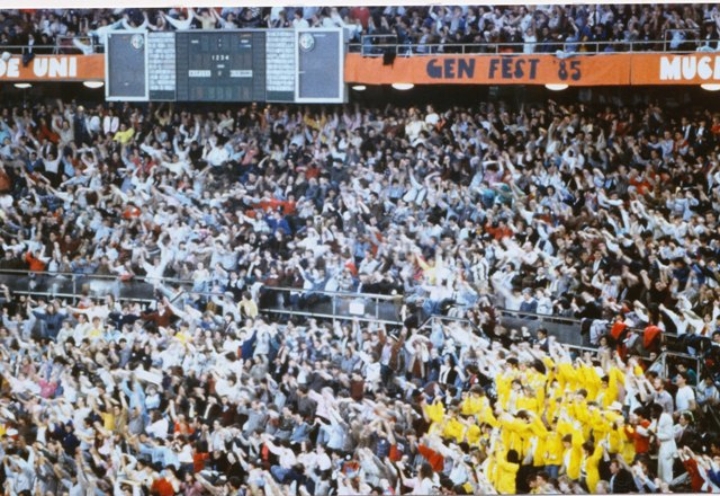
Jan 30, 2018 | Non categorizzato
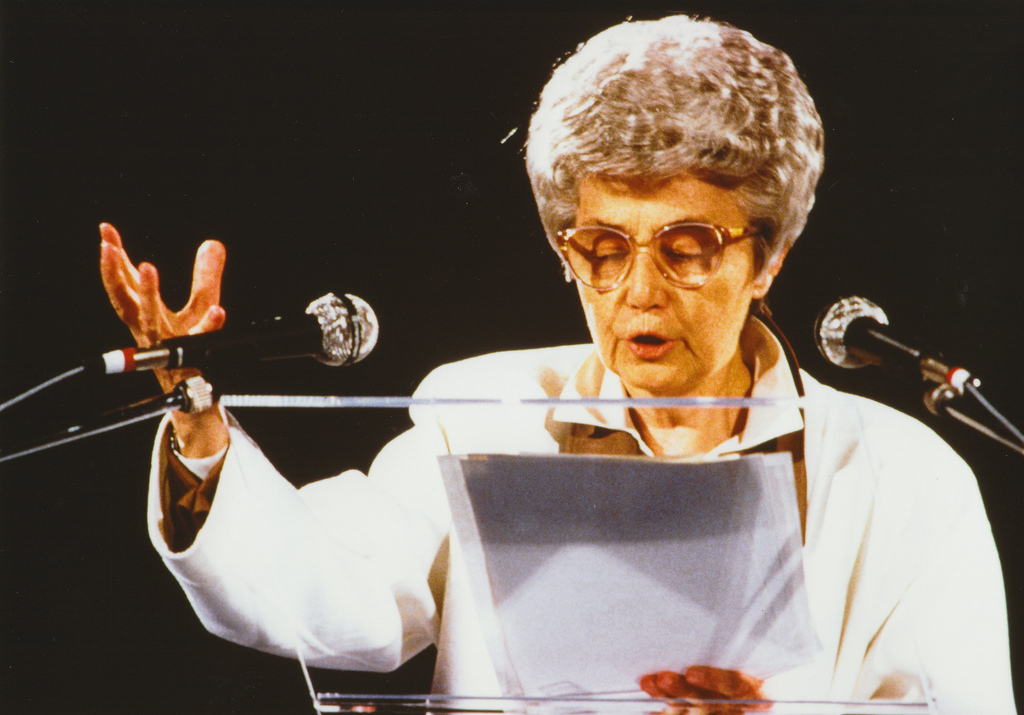 Inspired by our experience of Genfest 1980 , Andrew Basquille, Eugene Murphy and I, all students at University College Dublin at the time, started to dedicate more time to playing music together and entered a period of sustained creativity that resulted in the composition of many songs both individually and collectively. “Yes to You”, the song that we performed at the GenFest in 1985 dates from this time. Here’s how it came to be written. Chiara Lubich visited London in 1981 and most of the Focolare Community in Ireland travelled to Great Britain for the event. One afternoon, as a group of us took lunch together close to the venue where Chiara was speaking, I started to play simple chords on the piano and developed a nice melody using a slightly unusual C / Dm / G progression (on guitar I wouldn’t have naturally played such a sequence). A volunteer, Joe McCarroll, a gifted songwriter in his own right, joined me and sang the lines “So many times that I’ve said maybe” to the emerging melody.
Inspired by our experience of Genfest 1980 , Andrew Basquille, Eugene Murphy and I, all students at University College Dublin at the time, started to dedicate more time to playing music together and entered a period of sustained creativity that resulted in the composition of many songs both individually and collectively. “Yes to You”, the song that we performed at the GenFest in 1985 dates from this time. Here’s how it came to be written. Chiara Lubich visited London in 1981 and most of the Focolare Community in Ireland travelled to Great Britain for the event. One afternoon, as a group of us took lunch together close to the venue where Chiara was speaking, I started to play simple chords on the piano and developed a nice melody using a slightly unusual C / Dm / G progression (on guitar I wouldn’t have naturally played such a sequence). A volunteer, Joe McCarroll, a gifted songwriter in his own right, joined me and sang the lines “So many times that I’ve said maybe” to the emerging melody.  I continued with the line “So many times that I said no” and continued with the melody when Andrew joined and completed the lyric which then became the verse. Over the next two days between Andrew and myself we completed about 3 verses but didn’t know where to go for a chorus. This was eventually added – melody and lyric together – by Eugene who stamped his musical sophistication on the song by taking the chorus to Am and then to a beautiful minor / major interplay in E that reflected and emphasised a new level of conviction in the choice – “Yes to you”. We were the asked to perform the song at the Genfest and spend months practising it. On the day we waited patiently for our turn to sing but began to realise that the show was running behind time. Sure enough, we were informed that our intervention had been cut and, bitterly disappointed, I started to pack up my guitar accordingly, months of effort and practice gone down the drain. But then, very suddenly, the decision was reversed and we found ourselves taking our positions on a vast stage without a sound check and unable to make eye contact with each other. I didn’t have time to take my own guitar and was given a Spanish guitar with nylon strings, a type I was not used to playing! So we played “Yes to you” at Genfest 1985 completely out of our comfort zone, forced to depend on the strength of our relationship with each other and our desire to have Jesus in our midst. My experience at Genfest 1985 was one of validation and verification – validation of my choice to live for unity and verification that it was possible. I had many experiences of large scale events – festivals, football matches, concerts – but at Genfest there was no hatred, hostility and enmity like when rival factions meet at soccer games and the fleeting alcohol / drug induced euphoria that’s common at festivals and concerts was replaced by a deeper, more lasting joy.
I continued with the line “So many times that I said no” and continued with the melody when Andrew joined and completed the lyric which then became the verse. Over the next two days between Andrew and myself we completed about 3 verses but didn’t know where to go for a chorus. This was eventually added – melody and lyric together – by Eugene who stamped his musical sophistication on the song by taking the chorus to Am and then to a beautiful minor / major interplay in E that reflected and emphasised a new level of conviction in the choice – “Yes to you”. We were the asked to perform the song at the Genfest and spend months practising it. On the day we waited patiently for our turn to sing but began to realise that the show was running behind time. Sure enough, we were informed that our intervention had been cut and, bitterly disappointed, I started to pack up my guitar accordingly, months of effort and practice gone down the drain. But then, very suddenly, the decision was reversed and we found ourselves taking our positions on a vast stage without a sound check and unable to make eye contact with each other. I didn’t have time to take my own guitar and was given a Spanish guitar with nylon strings, a type I was not used to playing! So we played “Yes to you” at Genfest 1985 completely out of our comfort zone, forced to depend on the strength of our relationship with each other and our desire to have Jesus in our midst. My experience at Genfest 1985 was one of validation and verification – validation of my choice to live for unity and verification that it was possible. I had many experiences of large scale events – festivals, football matches, concerts – but at Genfest there was no hatred, hostility and enmity like when rival factions meet at soccer games and the fleeting alcohol / drug induced euphoria that’s common at festivals and concerts was replaced by a deeper, more lasting joy.
Padraic Gilligan
Jan 29, 2018 | Non categorizzato
A martyred country without peace, the terrorist groups compete with one another to claim the attacks. Three attacks in a week have provoked a great number of victims among the civilian population: reports talk of about 150 deaths in Kabul and Jalalabad, with over 400 wounded. In Kabul the first target was a hotel, and the second target was the Higher Council for Peace, which was not hit since the terrorist made himself explode at a checkpoint. In Jalalabad they attacked the headquarters of Save the Children, the international organization that has been operating in that area for many years. According to the UN data, last year in the country, 17 humanitarian operators lost their lives, 33 were wounded and 48 were kidnapped. Pope Francis spoke of the attacks during the Angelus of 28 January: “Up to when – he asked himself – will the Afghan people have to bear with this inhuman violence? Let us pray in silence for the victims and their families, and that those in that country will continue to work to build peace.” The Focolare Movement expresses its solidarity with the Afghan people, in the hope that a peace resolution may soon bring serenity to the country.
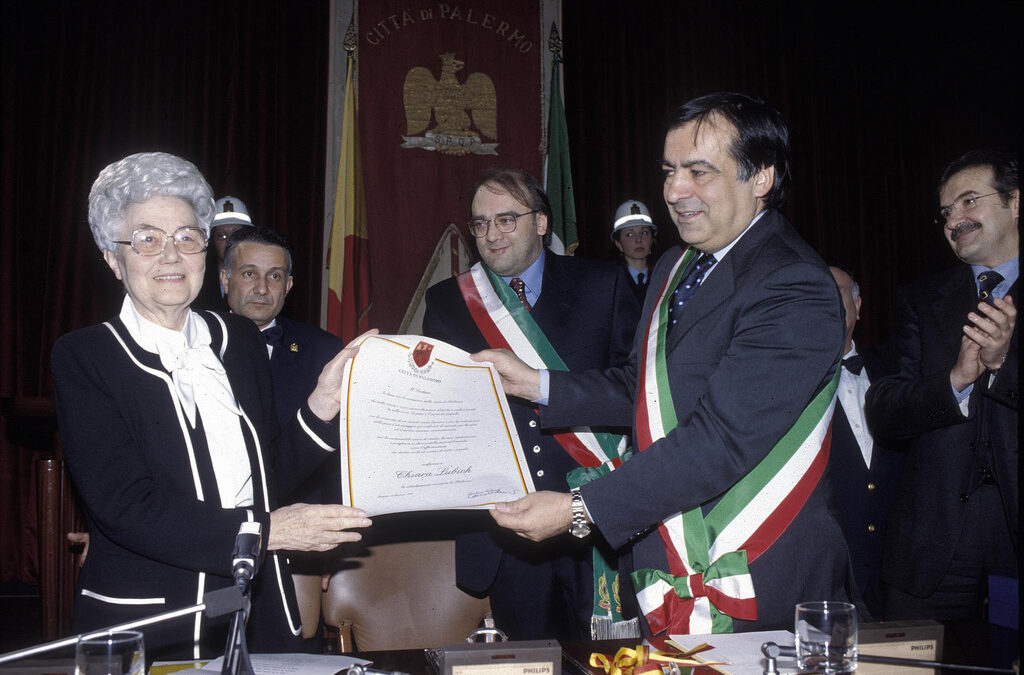
Jan 29, 2018 | Focolare Worldwide
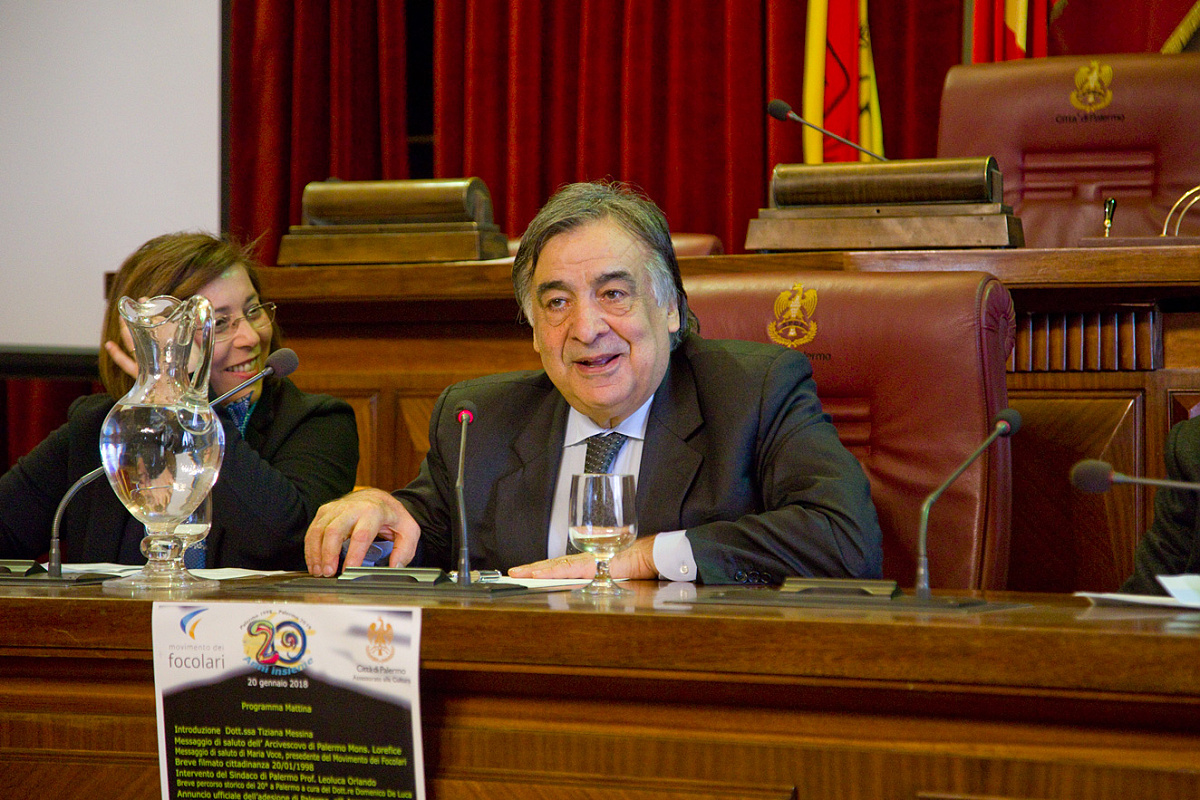 January 1998. Palermo prepared for the Grand Jubilee of the year 2000 attracting to itself the signs of light and shadow. It was a mute city, bloodied by the past and recent massacres of the mafia, but also a city determined to redeem itself and show its true countenance. January 2018. Today, the Sicilian capital appears as a “mosaic city,” an advanced expression of the dialogue between the various European cultures and the Arab world, and an outpost of Middle East culture within the European fabric. In the presence of Mayor Leoluca Orlando and the authorities of some representatives of the institutions, on 20 January the city wanted to “commemorate” – as a “commitment” to proceed in the same direction – an event which was for the city a step in its “magnificent providential design,” according to the words Chiara Lubich expressed then. During the various speeches, some aspects of the life of the Focolare over the last 20 years emerged: the social commitment and in the field of schooling, especially in some outskirt districts like Ballarò, Brancaccio and Zen, the promotion of events and the reflection on some grand themes like ecumenism, commitment toward the new generations with the start-up of schools of civil participation, and the discussion with personalities from the economic, political, cultural and art sectors. In these years the Focolare community has contributed to the journey of the entire city towards the construction of a “city of reception and rights,” with the values of fraternity and the continual pursuit of dialogue.
January 1998. Palermo prepared for the Grand Jubilee of the year 2000 attracting to itself the signs of light and shadow. It was a mute city, bloodied by the past and recent massacres of the mafia, but also a city determined to redeem itself and show its true countenance. January 2018. Today, the Sicilian capital appears as a “mosaic city,” an advanced expression of the dialogue between the various European cultures and the Arab world, and an outpost of Middle East culture within the European fabric. In the presence of Mayor Leoluca Orlando and the authorities of some representatives of the institutions, on 20 January the city wanted to “commemorate” – as a “commitment” to proceed in the same direction – an event which was for the city a step in its “magnificent providential design,” according to the words Chiara Lubich expressed then. During the various speeches, some aspects of the life of the Focolare over the last 20 years emerged: the social commitment and in the field of schooling, especially in some outskirt districts like Ballarò, Brancaccio and Zen, the promotion of events and the reflection on some grand themes like ecumenism, commitment toward the new generations with the start-up of schools of civil participation, and the discussion with personalities from the economic, political, cultural and art sectors. In these years the Focolare community has contributed to the journey of the entire city towards the construction of a “city of reception and rights,” with the values of fraternity and the continual pursuit of dialogue. 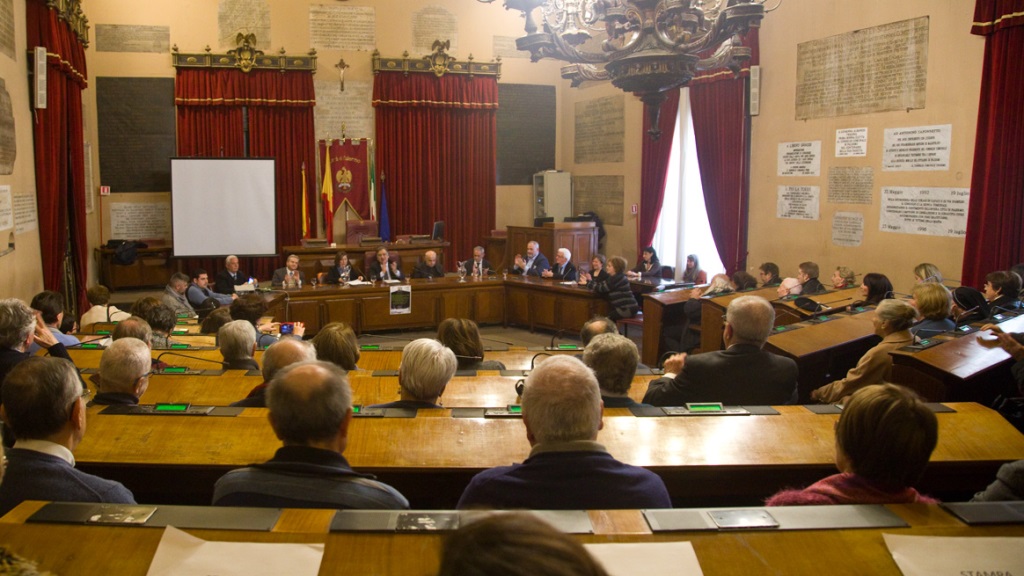 “The memory of the honorary citizenship given to Chiara Lubich,” affirmed Mayor Orlando, “is an occasion to see the city’s progress, in the name of respect for the human being and the construction of a community founded on the values of unity and brotherhood: those on which Chiara had founded her movement and which today brings together millions of people worldwide. Today those values are part of the daily life of Palermo, with reception and solidarity which are the testing grounds, but also an extraordinary occasion to confirm the will of the Palermo people to build a city on a human scale and that welcomes others, as is continually demonstrated in civil society’s undertakings.”
“The memory of the honorary citizenship given to Chiara Lubich,” affirmed Mayor Orlando, “is an occasion to see the city’s progress, in the name of respect for the human being and the construction of a community founded on the values of unity and brotherhood: those on which Chiara had founded her movement and which today brings together millions of people worldwide. Today those values are part of the daily life of Palermo, with reception and solidarity which are the testing grounds, but also an extraordinary occasion to confirm the will of the Palermo people to build a city on a human scale and that welcomes others, as is continually demonstrated in civil society’s undertakings.” 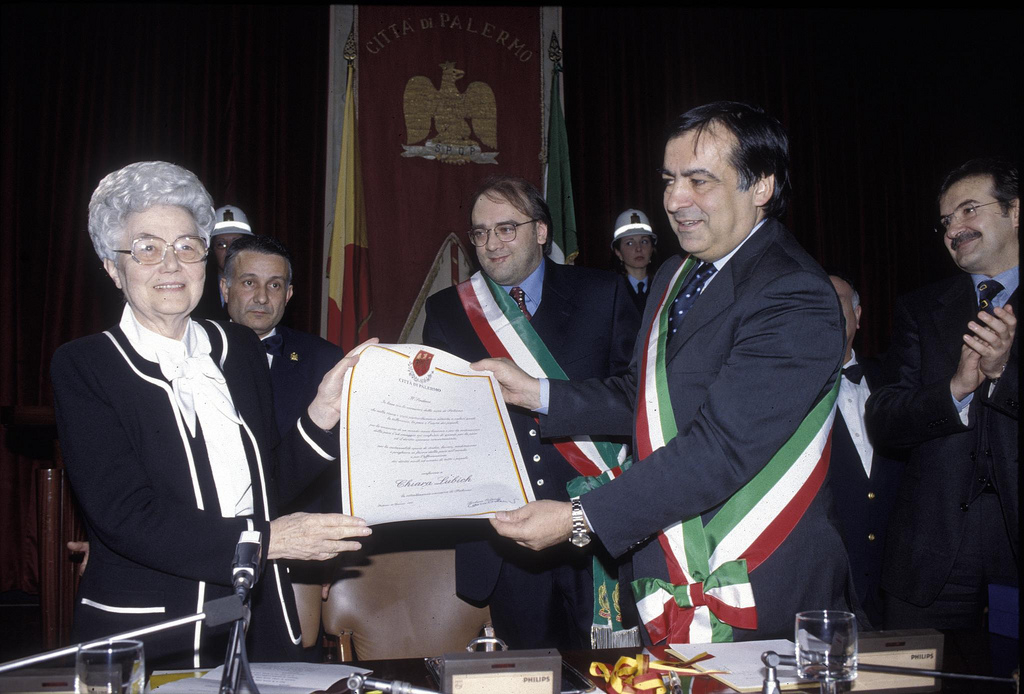 The Archbishop of Palermo, Bishop Corrado Lorefice, encouraged all to continue along this path of fraternity through dialogue at all levels, towards a goal “indicated prophetically by Chiara Lubich: that Palermo may become a city on the hill, to which one can refer for the achievement of God’s design for the community of people.” He added, “the celebration of such an event expresses the deep harmony between the city of Palermo and the values contained in Chiara’s charism: work for the reconstruction of unity of the human family.” Maria Voce, President of the Focolare, encouraged all in a message to “share the many moments of fraternity that have been consolidated all these years to promote acceptance, lawfulness and peace,” with the hope “that the city may increasingly stand out for its active testimony on the various fronts of dialogue, multiplying initiatives and imbuing hope and valorising the talents of all in the perspective of unity.” The adhesion to the “City for fraternity” Association, created by the Municipality of Palermo, further commits its citizens to draw inspiration from universal fraternity in every future decision and action.
The Archbishop of Palermo, Bishop Corrado Lorefice, encouraged all to continue along this path of fraternity through dialogue at all levels, towards a goal “indicated prophetically by Chiara Lubich: that Palermo may become a city on the hill, to which one can refer for the achievement of God’s design for the community of people.” He added, “the celebration of such an event expresses the deep harmony between the city of Palermo and the values contained in Chiara’s charism: work for the reconstruction of unity of the human family.” Maria Voce, President of the Focolare, encouraged all in a message to “share the many moments of fraternity that have been consolidated all these years to promote acceptance, lawfulness and peace,” with the hope “that the city may increasingly stand out for its active testimony on the various fronts of dialogue, multiplying initiatives and imbuing hope and valorising the talents of all in the perspective of unity.” The adhesion to the “City for fraternity” Association, created by the Municipality of Palermo, further commits its citizens to draw inspiration from universal fraternity in every future decision and action.
Jan 28, 2018 | Non categorizzato, Word of
https://www.focolare.org/gb/files/2018/01/201802WOL.mp3 Word of life for ages 4-8 | for ages 9-17 | Print | Audio This Word of Life has been selected by Christians from various churches in Germany to put into practice throughout the year. St John wrote the Book of Revelation to console and to encourage the Christians of his time, who were facing widespread persecution. The book is rich in symbolic images and reveals God’s view on history, and its fulfilment at the end of time with God’s definitive victory over every power of evil. Revelation celebrates a full and glorious point of arrival: the goal God has destined for humanity. It is the promise of liberation from all suffering. God himself “will wipe every tear from their eyes … Death will be no more; mourning and crying and pain will be no more” (Rev 21:4). “To the thirsty I will give water as a gift from the spring of the water of life.” The first signs of this final goal can already be seen now, by those who have sincerely begun to live their life searching for God and his Word that reveals his plans. They can be found by those thirsting for truth, justice, and fraternity. God sees this thirsting and searching positively, as a good start and he even promises to give us the spring of the water of life. The water God promises is given freely. It is not given only to those who hope to please God through their own efforts, but also to all those who feel the burden of their weakness and entrust themselves to his love, believing that they will be cured and will find the fullness of life and happiness. Let us ask ourselves then, what do we thirst for? Moreover, to which springs do we go to quench our thirst? “To the thirsty I will give water as a gift from the spring of the water of life.” Perhaps we are thirsting for acceptance, for an important role in society, for our plans to work out … These legitimate aspirations can push us toward the polluted wells of selfishness and being wrapped up in our own interests to the point of oppressing the weak. Populations suffering a shortage of fresh water wells are acutely aware of the disastrous effects of the lack of this resource, which is indispensable for life and health. Yet by going deeper into our hearts, we find another kind of thirst that God himself has put there; the thirst to live our life as a gift we have received and that must be shared. Let us then draw from the pure source of the Gospel, freeing ourselves from all the debris that may cover us, and allow ourselves to be transformed into fountains of generous, welcoming and freely given love for all, without stopping before inevitable difficulties along the way. When Christians put the commandment of reciprocal love into practice, we allow God to intervene in a very special way, as Chiara Lubich wrote in 2002: “Every time we try to put the Gospel into practice, it is like drinking a drop of that living water. Every gesture of love for our neighbour is a sip of that water. “Yes, because that water, which is so alive and precious, is special for it gushes from our hearts every time we open up to love everyone. It is a spring — God’s spring — that pours out water in the measure that its deep streams quench the thirst of others, through small or big acts of love. If we continue to love, this fountain of peace and life will give ever more abundant water, without ever drying up. “Jesus revealed another secret to us, like a bottomless well we can draw from. When two or three are united in his name, loving one another with his same love, he is in their midst (cf. Mt 18:20). “Then we will feel free, full of light, and streams of living water will flow from within us. Jesus’s promise will be fulfilled because the thirst-quenching water that wells up for eternity, flows from Jesus himself present among us.”
Letizia Magri
Read more:
- Lubich, Chiara. God’s Word to Us. New City Press: Hyde Park, New York, 2011.
- Lubich, Chiara. “The Word that gives life,” Essential Writings. New City Press: Hyde Park, New York, 2007, pp 120-128.
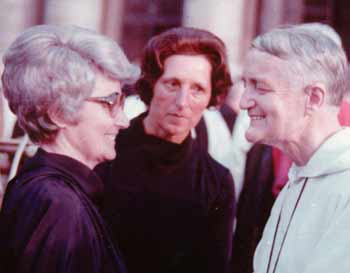
Jan 27, 2018 | Non categorizzato
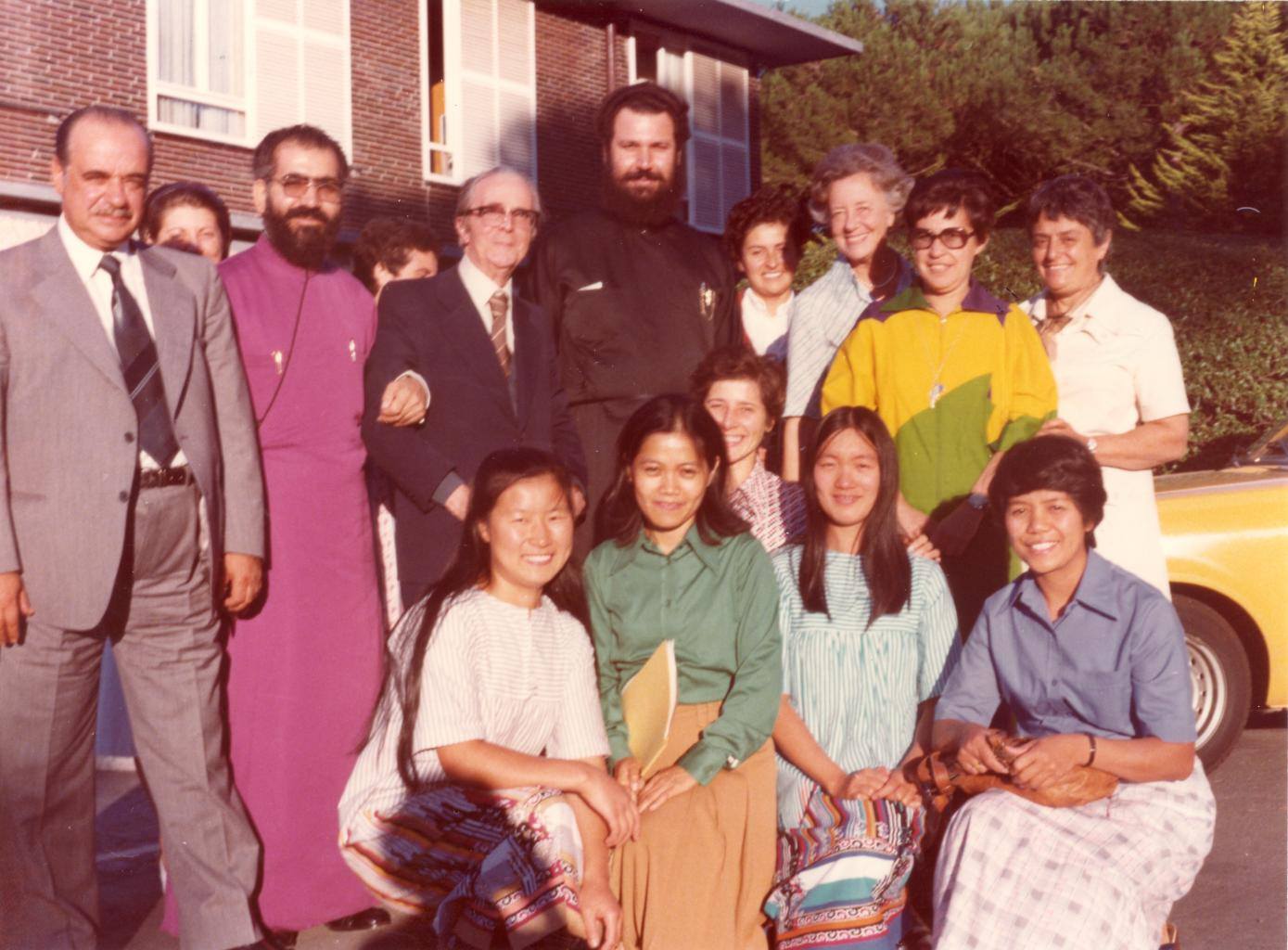 There is one event in the life of Igino Giordani that urges us to pause and reflect: the first biography written about him in 1985 was not written by a Catholic, but by a Scottish Baptist pastor, Edwin Robertson[1]. We should not see this as an irony of history [. . .] if such a friendly gesture towards Giordani had merit in the eyes of Heaven and in front of human history. Giordani had already presided at a conference of ecumenists back in the fall of 1967, at the headquarters of the Movement in Rocca di Papa, Italy. The Very Reverend Archimendrite, Eleuterio Fortino was also present. Years later in 2004, he gave the following testimony: “Because of his own interior serenity, Giordani was able to calm the heated tones of the debates at that conference; and he clarified the theological and pastoral aspects of the Second Vatican Council’s Unitatis redintegratio (1965), bringing down the last resistance of the Italian opposition to common prayer among all Christians during the Week of Prayer for the Unity of Churches[2]. Giordani had already been following the Week of Prayer, which was actually an Octave, beginning on January 18 (feast of the Chair of St. Peter in Rome) to January 25 (feast of the Conversion of St. Paul). In 1940 Giordani writes: “During the preparations of the Octave, news spread that was at first uncertain, that at a certain monastery of Trappist nuns in Rome, they were praying intensely for an end to the divisions among Christians. I came to learn that a young nun of that monastery had offered her life for the unity of the Church and that her sacrificial death had deeply touched a community of separated brothers in England. The news, even though it was so vague, greatly expanded – at least in my eyes – the horizon of the unitary movement and opened new prospects that appeared as patches of blue breaking through the gray and stormy heavens over a brawling humanity. It placed the Octave and its goals in their true light. Those nuns probably didn’t know anything about all the debates and commissions and committees that were held on the topic. Placed in front of the problem of the secession, they had contemplated it in simplicity, in the light of the Rule that never changes: they saw that unity is to be sought where it is found, that is, at its source, at the matrix. In other words it has to be asked of the Father in whom – and only in whom – brothers unite. This means that those humble women whom you’ll never meet at any conference, knew immediately what had to be done, and they placed the unity movement on the most direct path. Some might be tempted to ask it from Hegel, Loisy or even Marx; and in the news and in the conferences the names of such people came up, who had not and can not provide anything but partial solutions. Unity is not the work of men, but of God: not of study, but of grace. Even so, Father, accept this too, above all for your Church, that you might deign to purify her, preserve her, and unify her …”[3].
There is one event in the life of Igino Giordani that urges us to pause and reflect: the first biography written about him in 1985 was not written by a Catholic, but by a Scottish Baptist pastor, Edwin Robertson[1]. We should not see this as an irony of history [. . .] if such a friendly gesture towards Giordani had merit in the eyes of Heaven and in front of human history. Giordani had already presided at a conference of ecumenists back in the fall of 1967, at the headquarters of the Movement in Rocca di Papa, Italy. The Very Reverend Archimendrite, Eleuterio Fortino was also present. Years later in 2004, he gave the following testimony: “Because of his own interior serenity, Giordani was able to calm the heated tones of the debates at that conference; and he clarified the theological and pastoral aspects of the Second Vatican Council’s Unitatis redintegratio (1965), bringing down the last resistance of the Italian opposition to common prayer among all Christians during the Week of Prayer for the Unity of Churches[2]. Giordani had already been following the Week of Prayer, which was actually an Octave, beginning on January 18 (feast of the Chair of St. Peter in Rome) to January 25 (feast of the Conversion of St. Paul). In 1940 Giordani writes: “During the preparations of the Octave, news spread that was at first uncertain, that at a certain monastery of Trappist nuns in Rome, they were praying intensely for an end to the divisions among Christians. I came to learn that a young nun of that monastery had offered her life for the unity of the Church and that her sacrificial death had deeply touched a community of separated brothers in England. The news, even though it was so vague, greatly expanded – at least in my eyes – the horizon of the unitary movement and opened new prospects that appeared as patches of blue breaking through the gray and stormy heavens over a brawling humanity. It placed the Octave and its goals in their true light. Those nuns probably didn’t know anything about all the debates and commissions and committees that were held on the topic. Placed in front of the problem of the secession, they had contemplated it in simplicity, in the light of the Rule that never changes: they saw that unity is to be sought where it is found, that is, at its source, at the matrix. In other words it has to be asked of the Father in whom – and only in whom – brothers unite. This means that those humble women whom you’ll never meet at any conference, knew immediately what had to be done, and they placed the unity movement on the most direct path. Some might be tempted to ask it from Hegel, Loisy or even Marx; and in the news and in the conferences the names of such people came up, who had not and can not provide anything but partial solutions. Unity is not the work of men, but of God: not of study, but of grace. Even so, Father, accept this too, above all for your Church, that you might deign to purify her, preserve her, and unify her …”[3].  Chiara Lubich called the ecumenism that has come from her, an “ecumenism of life”. It is still practiced by the Focolare and has well developed experiences of its own experiences, developing in the light of great men like John XXIII, Paul VI, and in the light of the Second Vatican Council. It became one of the main priorities of Igino Giordani during the final years of his life. For Giordani, all Christians were already long-lost brothers and sisters. He lived and spread an ecumenical spirit that was composed of love and aimed at communion, in the certainty that “from the unity of hearts comes unity of minds”.[4]. It is rather touching to see how his article on ecumenism, The Journey Towards Unity, was written by in December 1979, four months before his departure for Heaven. In that gesture he continued to tenaciously cultivate a prophetic vision, in which he set the unity of Christians as the basis and the leaven that would “give an impetus to the ideal of universal unity among all peoples [5]. (Compiled by: Tommaso Sorgi, Il percorso ecumenico di Igino Giordani, “Nuova Umanità” No.199). ________________________________________ [1] E. Robertson, Igino Giordani, Città Nuova, Rome 1985. Ed. English edition entitled: The Fire of love. A life of Igino Giordani ‘Foco’, New City, London 1989. [2] E. Fortino, Igino Giordani e la preghiera per l’unità dei cristiani, in “Besa-Fede”, Greek-Albanese Journal, Rome, February 2004, pp. 7-9. [3] I. Giordani, Questa ottava, in: M. G. Dore, Suor Maria Gabriella (1914-1939), Morcelliana, Brescia 1940, pp. 9-25. [4] I. Giordani, Sette giorni per l’unità, “Città Nuova”, 1978, n. 23, p.30. [5] I. Giordani, Il viaggio verso l’unità, “Città Nuova”», 1979, n. 23, p.27.
Chiara Lubich called the ecumenism that has come from her, an “ecumenism of life”. It is still practiced by the Focolare and has well developed experiences of its own experiences, developing in the light of great men like John XXIII, Paul VI, and in the light of the Second Vatican Council. It became one of the main priorities of Igino Giordani during the final years of his life. For Giordani, all Christians were already long-lost brothers and sisters. He lived and spread an ecumenical spirit that was composed of love and aimed at communion, in the certainty that “from the unity of hearts comes unity of minds”.[4]. It is rather touching to see how his article on ecumenism, The Journey Towards Unity, was written by in December 1979, four months before his departure for Heaven. In that gesture he continued to tenaciously cultivate a prophetic vision, in which he set the unity of Christians as the basis and the leaven that would “give an impetus to the ideal of universal unity among all peoples [5]. (Compiled by: Tommaso Sorgi, Il percorso ecumenico di Igino Giordani, “Nuova Umanità” No.199). ________________________________________ [1] E. Robertson, Igino Giordani, Città Nuova, Rome 1985. Ed. English edition entitled: The Fire of love. A life of Igino Giordani ‘Foco’, New City, London 1989. [2] E. Fortino, Igino Giordani e la preghiera per l’unità dei cristiani, in “Besa-Fede”, Greek-Albanese Journal, Rome, February 2004, pp. 7-9. [3] I. Giordani, Questa ottava, in: M. G. Dore, Suor Maria Gabriella (1914-1939), Morcelliana, Brescia 1940, pp. 9-25. [4] I. Giordani, Sette giorni per l’unità, “Città Nuova”, 1978, n. 23, p.30. [5] I. Giordani, Il viaggio verso l’unità, “Città Nuova”», 1979, n. 23, p.27.
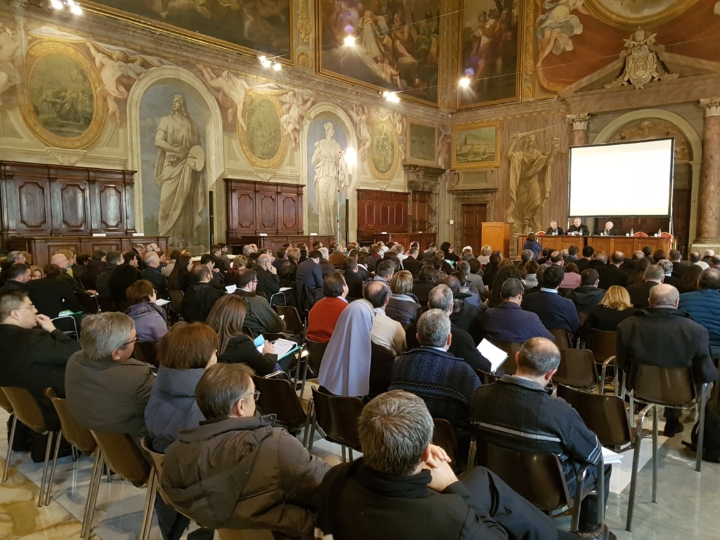
Jan 26, 2018 | Non categorizzato
 On the first day of the week dedicated to Christian unity (18 – 25 January), under the splendid vault frescoed in just a hundred days by the famed painter Vasari, in the renaissance Roman Chancery building, an invocation to the Holy Spirit opened the study day which the ecclesial Movements and Communities dedicated to “Charism and Institutions.” Promoted by the Focolare Movement, New Horizons, Family of Hope, the Catholic Shalom Community, The Emmanuel Comminity and Pope John 23rd Community, together with upper education Evagelii Gaudium” Centre of the “Sophia” University Institute and under the patronage of the The Canon Law Association of Italy, the day represented a new phase of the deep “affective and effective synergy” between Movements and ecclesial realities, as underlined by opening speech of Maria Voce who represented all the promoters: “We are committed to facing, day after day, coherently with all the charisms received, the challenges that lead the way towards the fullness of Christian life and the perfection of charity, in the effort to enhance communion within our Movements and between us all.” At the same time, the day was the occasion to deepen a specific theme regarding the relationship between charisms, gifts of the Spirit, and the institutional forms, in the light of the document of the Congregation for the Doctrine of the Faith, “Iuvenescit Ecclesia” (May 2016), which defines the charismatic and hierarchic gifts as “co-essential:” while “the presence of the institutions guarantee that the announcement of the Gospel will never be lacking – underlined Cardinal Kevin Joseph Farrell, President of the Council for the Laity, Family and Life – the presence of the charisms guarantee that there will always be those who receive them with openness of heart.” After their birth in the heart of the Church, “with that bit of surprise and upheaval which their unexpected and unprecedented appearance had provoked,” and their approval, often the fruit of a long and painful pathway, now the Movements – said Piero Coda, Rector of the IUS – “are fording a third phase, where charismatic effervescence is committed to finding the suitable channels for a balanced institutionalisation (…) to express at best their own specific contribution.” A still open issue regards the nature of the ecclesial movements, which in force of their founding charism do not demand a new juridical form of association (the Codes of Canon Law in force do not contain the terms “ecclesial movements and communities” and therefore these are lawfully placed under the “associations of the faithful), but also in the distinctions of juridical nature able to support at best the charismatic richness and specificity of each. In fact, we have to take into account, that these “associations” are made up of laity, priests and religious, forming what Bishop Christoph Hegge, Auxiliary Bishop of Münster defines a “communitarian unity,” with reference to the “communitarian testimony” which all the members of the movement, with “resilience and flexibility of belonging,” offer together as the people of God, accepting and living the proclamation of the Church in our time. On the need to differentiate the juridical statutes regarding the variety and specificity of the charisms, His Eminence Luis Navarro, Rector of the Pontifical University of Santa Croce, said “There is no unitary juridical solution. Each needs to tailor a made-to-measure vest.” But to do so, we need to “know and study a charism in its concrete ecclesial life.” “In the history of the Church, the Movements have always been the answer to a need,” affirmed Laurent Landete, married and father of six children, the French leader of the Emmanuele Community, among the participants of the afternoon round table dedicated to the presentation of the Movements and ecclesial realities operating at all latitudes. If the future of their Statutes is the basic theme of the reflection, the freshness, actuality and variety of the ways with which they operate, driven by the Spirit, in the streets of the world, arouse marvel and stupor, as in face of the colours and perfumes of an immense garden in Spring.
On the first day of the week dedicated to Christian unity (18 – 25 January), under the splendid vault frescoed in just a hundred days by the famed painter Vasari, in the renaissance Roman Chancery building, an invocation to the Holy Spirit opened the study day which the ecclesial Movements and Communities dedicated to “Charism and Institutions.” Promoted by the Focolare Movement, New Horizons, Family of Hope, the Catholic Shalom Community, The Emmanuel Comminity and Pope John 23rd Community, together with upper education Evagelii Gaudium” Centre of the “Sophia” University Institute and under the patronage of the The Canon Law Association of Italy, the day represented a new phase of the deep “affective and effective synergy” between Movements and ecclesial realities, as underlined by opening speech of Maria Voce who represented all the promoters: “We are committed to facing, day after day, coherently with all the charisms received, the challenges that lead the way towards the fullness of Christian life and the perfection of charity, in the effort to enhance communion within our Movements and between us all.” At the same time, the day was the occasion to deepen a specific theme regarding the relationship between charisms, gifts of the Spirit, and the institutional forms, in the light of the document of the Congregation for the Doctrine of the Faith, “Iuvenescit Ecclesia” (May 2016), which defines the charismatic and hierarchic gifts as “co-essential:” while “the presence of the institutions guarantee that the announcement of the Gospel will never be lacking – underlined Cardinal Kevin Joseph Farrell, President of the Council for the Laity, Family and Life – the presence of the charisms guarantee that there will always be those who receive them with openness of heart.” After their birth in the heart of the Church, “with that bit of surprise and upheaval which their unexpected and unprecedented appearance had provoked,” and their approval, often the fruit of a long and painful pathway, now the Movements – said Piero Coda, Rector of the IUS – “are fording a third phase, where charismatic effervescence is committed to finding the suitable channels for a balanced institutionalisation (…) to express at best their own specific contribution.” A still open issue regards the nature of the ecclesial movements, which in force of their founding charism do not demand a new juridical form of association (the Codes of Canon Law in force do not contain the terms “ecclesial movements and communities” and therefore these are lawfully placed under the “associations of the faithful), but also in the distinctions of juridical nature able to support at best the charismatic richness and specificity of each. In fact, we have to take into account, that these “associations” are made up of laity, priests and religious, forming what Bishop Christoph Hegge, Auxiliary Bishop of Münster defines a “communitarian unity,” with reference to the “communitarian testimony” which all the members of the movement, with “resilience and flexibility of belonging,” offer together as the people of God, accepting and living the proclamation of the Church in our time. On the need to differentiate the juridical statutes regarding the variety and specificity of the charisms, His Eminence Luis Navarro, Rector of the Pontifical University of Santa Croce, said “There is no unitary juridical solution. Each needs to tailor a made-to-measure vest.” But to do so, we need to “know and study a charism in its concrete ecclesial life.” “In the history of the Church, the Movements have always been the answer to a need,” affirmed Laurent Landete, married and father of six children, the French leader of the Emmanuele Community, among the participants of the afternoon round table dedicated to the presentation of the Movements and ecclesial realities operating at all latitudes. If the future of their Statutes is the basic theme of the reflection, the freshness, actuality and variety of the ways with which they operate, driven by the Spirit, in the streets of the world, arouse marvel and stupor, as in face of the colours and perfumes of an immense garden in Spring.
Jan 26, 2018 | Non categorizzato
The international memorial day on 27 January, designated by the United Nations General Assembly, is held in order to commemorate the victims of the Shoah. On 27 January 1945, the Allied Forces liberated Auschwitz, the Nazi concentration and death camp, and its surviving prisoners. Beyond the prison gate and the sign bearing the slogan “Arbeit macht frei” (Work sets you free), the world witnessed the horror of what had taken place there and came to the know the scale of the mass extermination which had caused the death of six million people. 73 years after the end of the Shoah, in various parts of Europe and the world, every year commemorative meetings, ceremonies, initiatives and moments of narration of events by the survivors are promoted, especially in schools, in order to “never forget ” one of the most terrible examples of racial hatred and so that such atrocities will never be repeated anywhere on the planet.
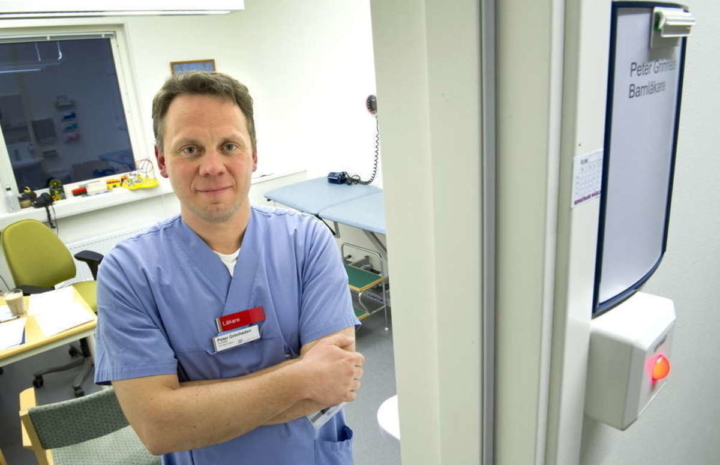
Jan 25, 2018 | Non categorizzato
 Peter Grimheden has an oval face with two blue, piercing eyes. I met him for the first time in Lund, Sweden, for the historical encounter between Catholics and Lutherans for the 500 years of the Reformation. Peter is a young pediatrician, passionate about his work, to which he is dedicated with great enthusiasm. His singularity is that of being Swedish, Lutheran, a focolarino, and for his having chosen a path of total donation to God. He lives in Stockholm, in a small community with other 4 Catholic focolarinos: a Belgian, an Argentinean and two Italians. Were you raised in a Christian family and environment? I belong to the Swedish Lutheran Church and come from a family which is strongly bound to traditions. As a child, I used to visit my grandparents. We would first go to Mass and then dine together. During dinner, after the women had washed the dishes, we would sit and listen to grandpa who would read one of Luther’s sermons. As if that of the Mass was not enough! The only thing I remember is that I would play at holding my breath. My record was to resist breathing for a minute. It was a strict and severe education. All was either black or white and I could never ever go to the cinema or play ice hockey. How did you meet the Focolare? I was dating a girl who invited me to a concert of Gen Verde, a musical band inspired by the Focolare. I liked the music, the words, and the atmosphere they created. The brother of a singer had been killed in a civil war and she had been able to forgive. I liked positive Christianity, not based on prohibitions and things one shouldn’t do. The people of the Focolare became my friends and I would frequent them with my girlfriend. But after some time, this relationship was too tight for me, so I left her. I continued to frequent the Focolare and I was strongly attracted by the people who gave themselves completely to God, living in a community. For me it was like slipping on a banana peel rather than making a big choice. It was like falling in love. So at 21, I went to Loppiano, Italy, close to Florence to attend the focolarini training school. It was a unique occasion to meet people from all over the world, even if I felt a bit “exotic” since almost all were Catholics. Today you live in a community in Stockholm. Is it difficult to live with people of another Church? Belonging to one Church or the other does not impact on our daily lives since we share the same ideals. We have a Christian life in common and I don’t feel any difference among us. I used to feel lonely upon frequenting my Lutheran Church but now my friends accompany me once in a while since they want to know my Church better, the same way in which I want to know about their church. We try to live in the presence of Jesus in our midst and are all his disciples. Source: New City
Peter Grimheden has an oval face with two blue, piercing eyes. I met him for the first time in Lund, Sweden, for the historical encounter between Catholics and Lutherans for the 500 years of the Reformation. Peter is a young pediatrician, passionate about his work, to which he is dedicated with great enthusiasm. His singularity is that of being Swedish, Lutheran, a focolarino, and for his having chosen a path of total donation to God. He lives in Stockholm, in a small community with other 4 Catholic focolarinos: a Belgian, an Argentinean and two Italians. Were you raised in a Christian family and environment? I belong to the Swedish Lutheran Church and come from a family which is strongly bound to traditions. As a child, I used to visit my grandparents. We would first go to Mass and then dine together. During dinner, after the women had washed the dishes, we would sit and listen to grandpa who would read one of Luther’s sermons. As if that of the Mass was not enough! The only thing I remember is that I would play at holding my breath. My record was to resist breathing for a minute. It was a strict and severe education. All was either black or white and I could never ever go to the cinema or play ice hockey. How did you meet the Focolare? I was dating a girl who invited me to a concert of Gen Verde, a musical band inspired by the Focolare. I liked the music, the words, and the atmosphere they created. The brother of a singer had been killed in a civil war and she had been able to forgive. I liked positive Christianity, not based on prohibitions and things one shouldn’t do. The people of the Focolare became my friends and I would frequent them with my girlfriend. But after some time, this relationship was too tight for me, so I left her. I continued to frequent the Focolare and I was strongly attracted by the people who gave themselves completely to God, living in a community. For me it was like slipping on a banana peel rather than making a big choice. It was like falling in love. So at 21, I went to Loppiano, Italy, close to Florence to attend the focolarini training school. It was a unique occasion to meet people from all over the world, even if I felt a bit “exotic” since almost all were Catholics. Today you live in a community in Stockholm. Is it difficult to live with people of another Church? Belonging to one Church or the other does not impact on our daily lives since we share the same ideals. We have a Christian life in common and I don’t feel any difference among us. I used to feel lonely upon frequenting my Lutheran Church but now my friends accompany me once in a while since they want to know my Church better, the same way in which I want to know about their church. We try to live in the presence of Jesus in our midst and are all his disciples. Source: New City
Jan 24, 2018 | Non categorizzato
House Arrest December 2016 I received a telephone call from a desperate mother who asked help for one of her sons. The lawsuit against him had been heard in court and he was sentenced to 11 month under house arrest. She couldn’t take him in because she didn’t have a house and nobody else wanted to have him. I was her only hope, and I just couldn’t look the other way in front of this request. What to do? Three days later when I was about to make a few phone calls to find somebody who could help me out, someone knocked on the door. It was someone who comes often to see us. I welcomed him in, made him a cup of coffee and we began to talk. Then he asked me: “What were you doing just now?” Something inside me made me tell him about the situation. And he says: “But couldn’t I do it?” He had a small apartment, but he would sleep in the living room and leave his bed to the boy. The next day he took care of all the bureaucratic matters. The months flew by. We took food to them twice a week, since he wasn’t very well-off financially. And all it took for God to perform veritable miracles was a yes from me. (N.C. – Italy) I could look him in the eyes One day, while I was on my way to school, I was mugged by a group of boys in an underpass. They kicked me and punched me and threw me on the ground. They wanted my cell phone. When they finally went away, I couldn’t get up because of the pain in my body and in my soul. I wondered: “Why me?” My anger and resentment mounted. I told some friends at school about the incident, but none of them appreciated my pain, and that bothered me. The next few nights I couldn’t sleep, almost crying with anger as I watched that scene in the underpass playing out over and over again in my mind as if in a film. It was only some time later that I was able to talk about it with some friends who, like me, are trying to live the Gospel. Confiding it to them helped me to do what at first seemed impossible: to my aggressors. When I went to court to identify them at the trial, I felt I had forgiven them in my heart without any difficulty, I could look them straight in the eyes. (From T. Minuta’s blog) Appearances can be deceiving I had to go downtown to do some shopping and didn’t have much time. Suddenly I heard somebody asking me for money. I generally don’t give money. You can’t help everyone, and they might spend it on drugs. The boy’s head was shaven, and he had a dark gaze. I had the feeling he was one of the boys who had mugged me years before. I walked faster. But, a block later, I began to wonder: How can I think I’m cultivating union with God and, at the same time, neglect this boy who asked me for help?” I turned around and looked for the boy. “What is it you need?” I asked him. Totally surprised, he told me that he was thirsty. I invited him to have a seat in a coffee shop. He answered all my questions with a dry “yes” or “no”. I thought I might tell him about my own experiences and effort at getting used to a new country. He didn’t seem interested, and I was a bit discouraged. When I stood up to go, he said: “Why don’t you keep on talking? No one has ever told me the story of their life? It’s a new experience for me, and I have to get used to it. Tell me about your country. Why did you come here?” I ordered another hot chocolate and we sat there for another two hours. In the end we gave each other a hug. On my way home I entrusted to Jesus that kid whose name I didn’t even know. (U.K. – Argentina)
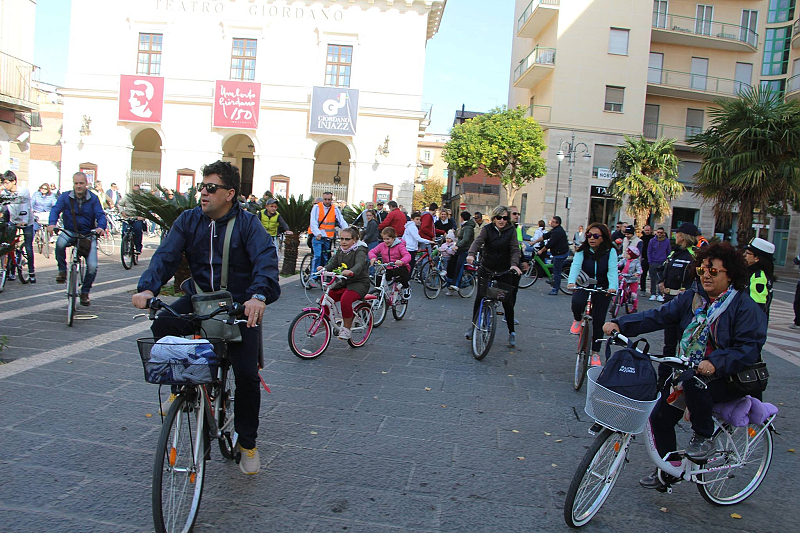
Jan 23, 2018 | Non categorizzato
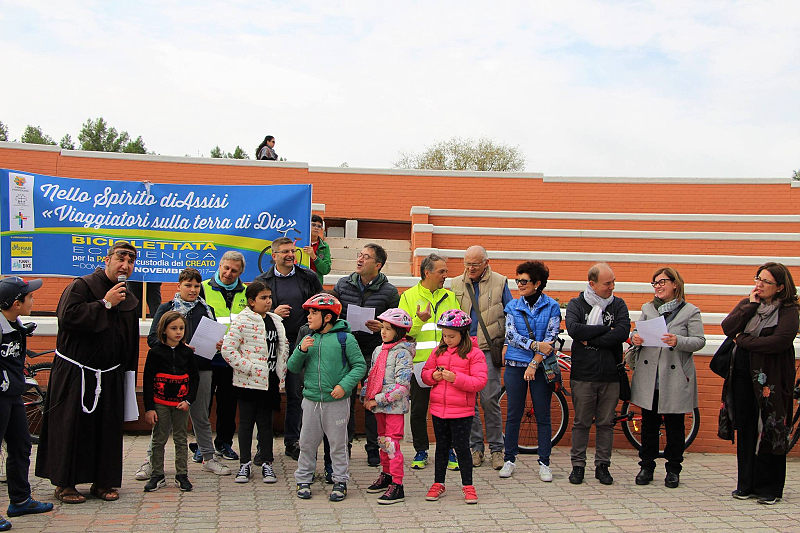 In Foggia, a commercial city in southern Italy an amazing flow of bikes crossing the city’s roads aroused the curiosity of passersby. Many citizens, also due to the sunny day, were on the road on their traditional Sunday outing, while the ladies catering to the feast day lunch watched from the balconies. Family bikes equipped with children’s chairs, tandems with blind people onboard as second paddlers, two wheels equipped with mikes, loudspeakers and banners, bikes of all shapes and sizes, a long trail of hard hats and helmets and a joyful bell: this was the ecumenical biking event organised by the Ecumenical Council of Foggia together with the Franciscans of the parish of Gesù e Maria, and the Group of Lay Associations joined by the Focolare Movement, the Fanny Bike Association and the Bike-lovers’ Association, on the occasion of the anniversary of the Spirit of Assisi and the Day for the Protection of Creation.
In Foggia, a commercial city in southern Italy an amazing flow of bikes crossing the city’s roads aroused the curiosity of passersby. Many citizens, also due to the sunny day, were on the road on their traditional Sunday outing, while the ladies catering to the feast day lunch watched from the balconies. Family bikes equipped with children’s chairs, tandems with blind people onboard as second paddlers, two wheels equipped with mikes, loudspeakers and banners, bikes of all shapes and sizes, a long trail of hard hats and helmets and a joyful bell: this was the ecumenical biking event organised by the Ecumenical Council of Foggia together with the Franciscans of the parish of Gesù e Maria, and the Group of Lay Associations joined by the Focolare Movement, the Fanny Bike Association and the Bike-lovers’ Association, on the occasion of the anniversary of the Spirit of Assisi and the Day for the Protection of Creation.  The initiative which took place some months ago was the occasion for the city of the Puglia region, together with men of good will and the faithful of various religious confessions, to reflect on the importance of protecting creation, the gift of God entrusted to mankind for the good of all, and raise the awareness of citizens in assuming more ecological lifestyles starting from their own daily lives, and make the municipal administration commit to undertake political decisions that would allow the healing of the city, making it more beautiful, liveable and less polluted. The bike itinerary started symbolically from the Square where the Archbishop’s Curia is situated, with the delivery to the Mayor of a pact made between citizens and the administration, containing the mutual commitment. According to the competences of each, inspiring motifs were created for the event, with the route that made stopovers at the places of worship of all the Christian confessions existing on the territory, which adhered to the initiative: the Church of San Domenico for the Greek Orthodox community, the Church of Gesù e Maria for the Romanian Orthodox community, the ADI Evangelical Church, and the Waldensian Church. The event ended up with a brief moment of ecumenical prayer at the San Felice Park, the green lung and meeting place of the city..
The initiative which took place some months ago was the occasion for the city of the Puglia region, together with men of good will and the faithful of various religious confessions, to reflect on the importance of protecting creation, the gift of God entrusted to mankind for the good of all, and raise the awareness of citizens in assuming more ecological lifestyles starting from their own daily lives, and make the municipal administration commit to undertake political decisions that would allow the healing of the city, making it more beautiful, liveable and less polluted. The bike itinerary started symbolically from the Square where the Archbishop’s Curia is situated, with the delivery to the Mayor of a pact made between citizens and the administration, containing the mutual commitment. According to the competences of each, inspiring motifs were created for the event, with the route that made stopovers at the places of worship of all the Christian confessions existing on the territory, which adhered to the initiative: the Church of San Domenico for the Greek Orthodox community, the Church of Gesù e Maria for the Romanian Orthodox community, the ADI Evangelical Church, and the Waldensian Church. The event ended up with a brief moment of ecumenical prayer at the San Felice Park, the green lung and meeting place of the city..
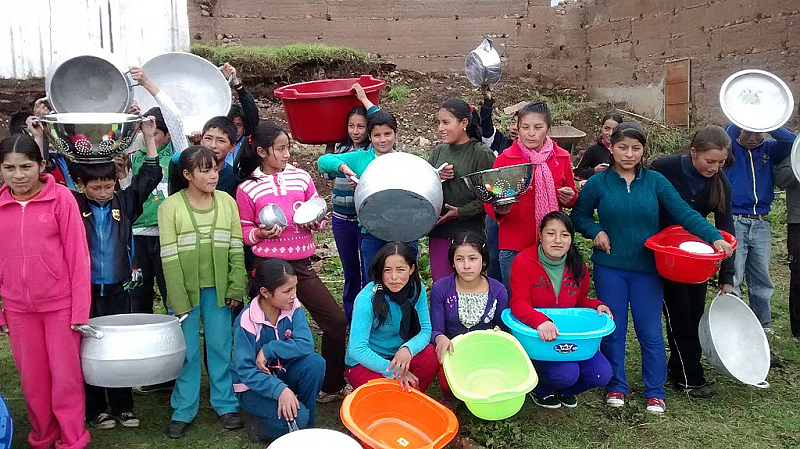
Jan 22, 2018 | Senza categoria
“The attraction of modern times” conference material: (3 March 2018, Castelgandolfo – Rome) can be found at: http://chiaralubich.10anni.focolare.org
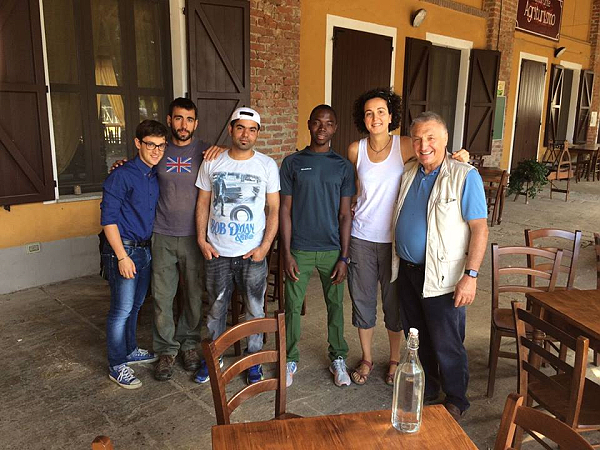
The migrants’ project in Sicily

In Bolivar, in the Peruvian Andes
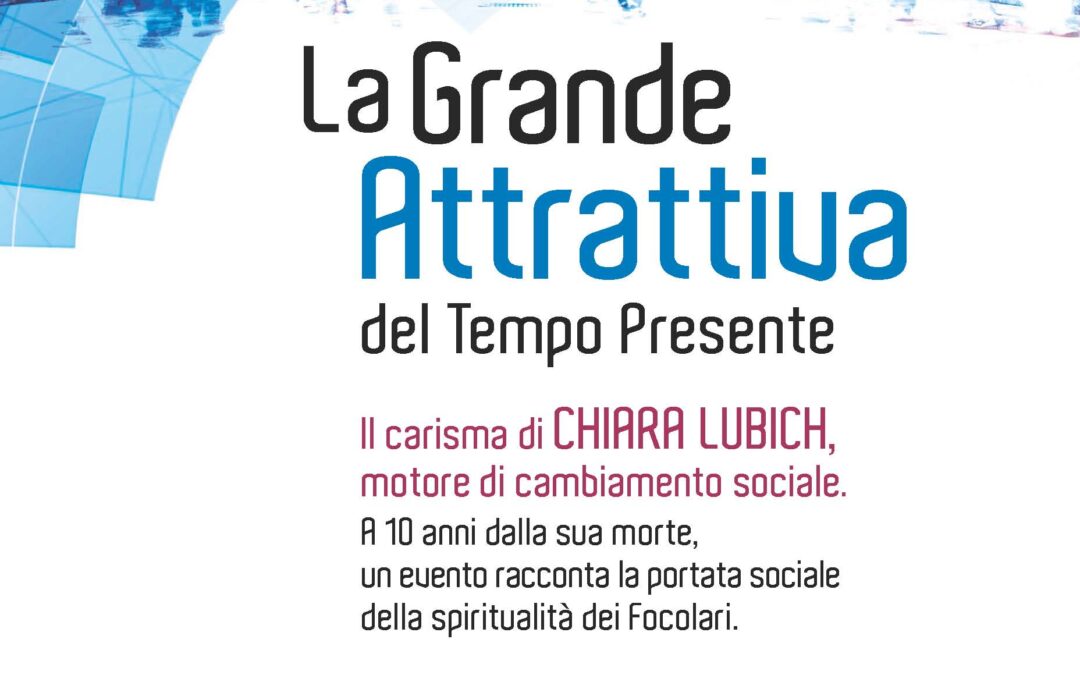
Jan 22, 2018 | Non categorizzato
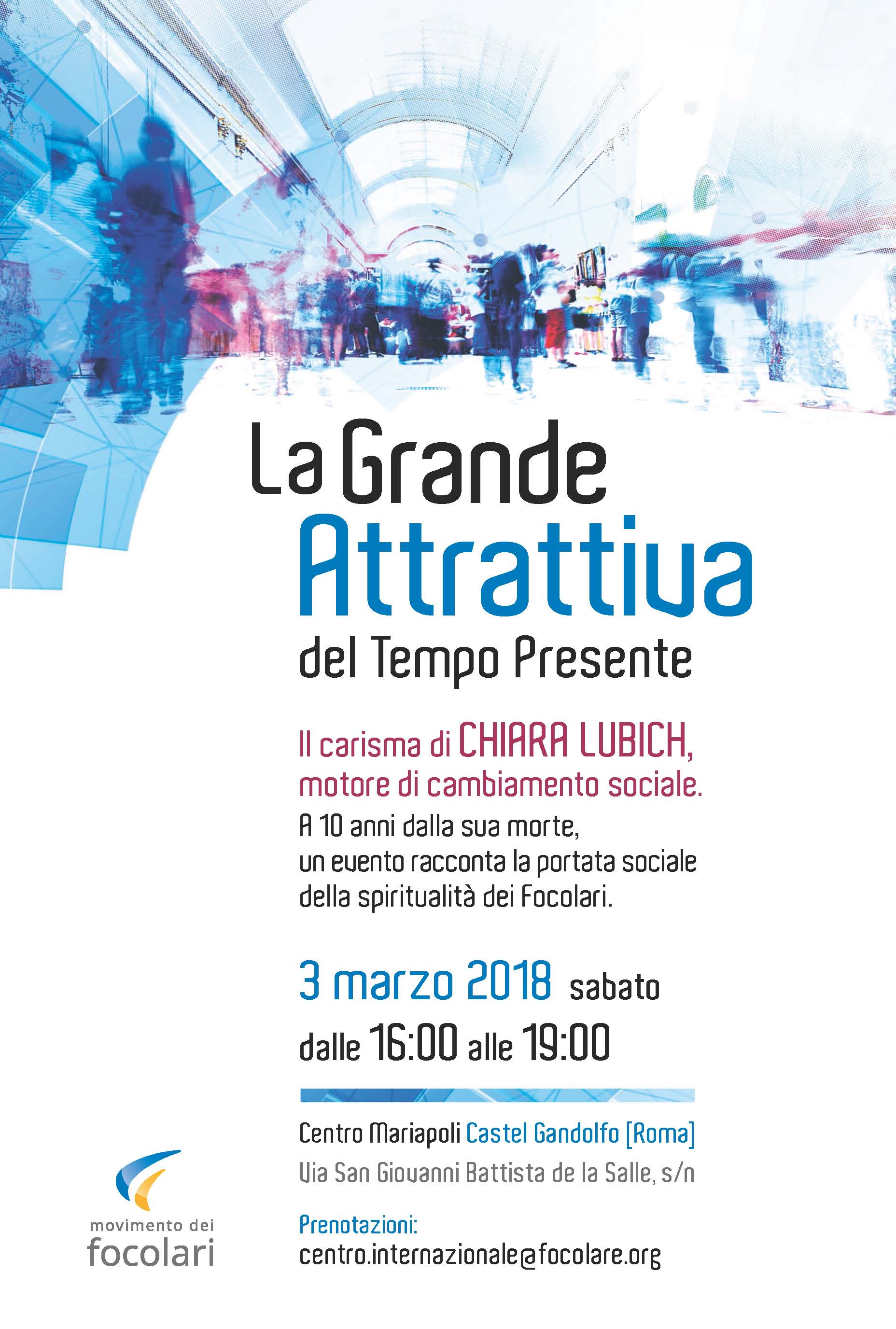
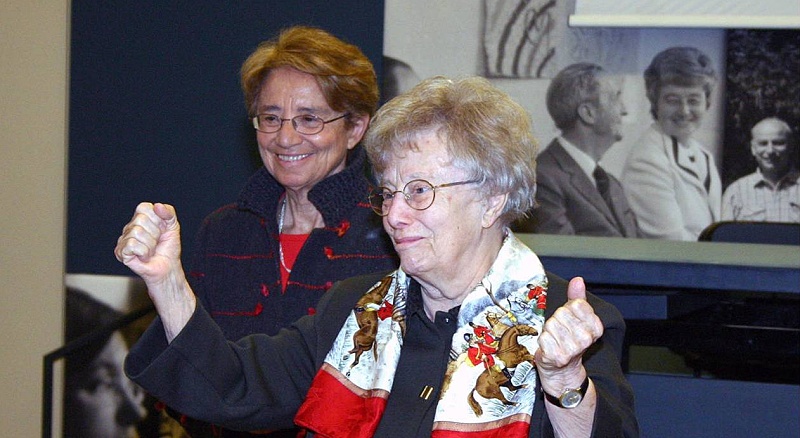
Jan 20, 2018 | Non categorizzato
 With gratitude for “her example of heroic faithfulness to God’s plan for her,” Focolare president Maria Voce, informed Focolare members around the world of her death following a long life spent in its entirety for unity. “Even in the pain of this huge loss,” said Maria Voce, “we are forever one heart and one soul with her.” Gisella Calliari had been born in Lavis, Trent, Italy on April 18, 1920. She was simply known as Gis, one of the first young women, along with her sister, to follow Chiara Lubich in the “adventure of unity,” which led to the starting of the Focolare Movement and its expansion around the world. She was the youngest of three sisters and met Chiara in 1944 in that tiny apartment that lodged the first hearth in Piazza Cappuccini,Trent. The next day, she decided to follow Chiara along the same path. The first hostile reaction from her family was softened when her mother met Igino Giordani who hired Gisella to be his secretary in Rome. During her long life, Gis spent more than 40 years living with Chiara. After living in several focolares in Italy – in Trent, Rome, Milan and Florence, she took charge of the women’s section of the focolarinas. Then, she worked alongside the foundress and Oreste Basso in following the development of the Work of Mary worldwide. This provided her with the opportunity to visit Focoare communities around the world. Her whole life was very profoundly linkded to the charism of unity, to which she was faithful until the last. Focolare.org will soon publish a more extensive biography.
With gratitude for “her example of heroic faithfulness to God’s plan for her,” Focolare president Maria Voce, informed Focolare members around the world of her death following a long life spent in its entirety for unity. “Even in the pain of this huge loss,” said Maria Voce, “we are forever one heart and one soul with her.” Gisella Calliari had been born in Lavis, Trent, Italy on April 18, 1920. She was simply known as Gis, one of the first young women, along with her sister, to follow Chiara Lubich in the “adventure of unity,” which led to the starting of the Focolare Movement and its expansion around the world. She was the youngest of three sisters and met Chiara in 1944 in that tiny apartment that lodged the first hearth in Piazza Cappuccini,Trent. The next day, she decided to follow Chiara along the same path. The first hostile reaction from her family was softened when her mother met Igino Giordani who hired Gisella to be his secretary in Rome. During her long life, Gis spent more than 40 years living with Chiara. After living in several focolares in Italy – in Trent, Rome, Milan and Florence, she took charge of the women’s section of the focolarinas. Then, she worked alongside the foundress and Oreste Basso in following the development of the Work of Mary worldwide. This provided her with the opportunity to visit Focoare communities around the world. Her whole life was very profoundly linkded to the charism of unity, to which she was faithful until the last. Focolare.org will soon publish a more extensive biography.

Jan 20, 2018 | Non categorizzato
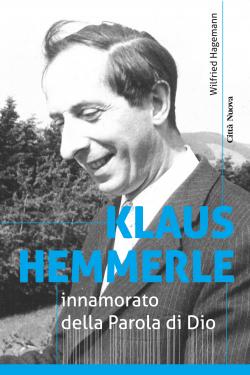 “There’s only one way to be able to have the most unity and communion possible among us right here and now, and I for one can see no other. This way coincides with […] us, you and me, all of you and me and all of us together, day by day, in all the situations of our life and in every situation that comes between us, staying anchored in His Word.” (266) “The Word of God goes beyond the barriers between us and creates communion. […] Nobody can take this away from us. Nobody can prohibit us from doing it. We can never turn back now. This is the essential point where the road opens for us to move on. […] If we live the Word to the extreme and in a spirit of reciprocity so that what you live and what I live are the same Word, both of them His Word, then the unity between us grows […] We can ask ourselves: But how are we to live in the one Spirit which is the deepest and most intimate reality of God, and the deepest and most intimate reality of me? It’s because of the Spirit whom I seek in you with patient endurance, the gifts of the Spirit that lie in you, a believer and a Christian like me. I question you at great length until I find the Spirit in you. I’m never content myself with compromises saying: ‘Deep down you’re not bad, nor am I. I’m able to find a halfway point where we can meet!’
“There’s only one way to be able to have the most unity and communion possible among us right here and now, and I for one can see no other. This way coincides with […] us, you and me, all of you and me and all of us together, day by day, in all the situations of our life and in every situation that comes between us, staying anchored in His Word.” (266) “The Word of God goes beyond the barriers between us and creates communion. […] Nobody can take this away from us. Nobody can prohibit us from doing it. We can never turn back now. This is the essential point where the road opens for us to move on. […] If we live the Word to the extreme and in a spirit of reciprocity so that what you live and what I live are the same Word, both of them His Word, then the unity between us grows […] We can ask ourselves: But how are we to live in the one Spirit which is the deepest and most intimate reality of God, and the deepest and most intimate reality of me? It’s because of the Spirit whom I seek in you with patient endurance, the gifts of the Spirit that lie in you, a believer and a Christian like me. I question you at great length until I find the Spirit in you. I’m never content myself with compromises saying: ‘Deep down you’re not bad, nor am I. I’m able to find a halfway point where we can meet!’  I don’t even say: ‘I take something of yours and something of mine to come up with a formula that we can both agree on without having to change any fundamentals.’ Rather, I ask myself: ‘Where is the Spirit in you?’ The insistence in my questioning never constrains you, limits you, but it frees you, so that you can offer me the gifts of the Spirit in you. I’m prepared to let myself be interrogated by you to extreme, so that, trusting in the Spirit, I can also offer and give to you my gifts as gifts from God. Giving our gifts to one another, discovering in reciprocity the gifts of the Spirit in one another – this is the only path for the one Spirit.” (265, 266) (June 15, 1979, From a dialogue with Evangelical Lutheran pastor Lukas Vischer) Anyone who has been living the spirituality of unity for a long time can never stop and say: Is what the other saying to me appropriate? What isn’t appropriate? In what way is what they are saying compatible with my thinking? And with regard to what isn’t compatible? I try to make myself one with the other person, I try to have the other person as my starting point, not as a way to deny what I affirm with certainty based on Christ, but in the sense that in front of the person, I ask: What light are they trying to convey to me? So, I look at myself from the perspective of that other person. I make myself one with the other, trying to re-read my truth through the light of the other.” (268) (Extracts from dialogue session during the Ecumenical School in Ottmaring, Germany) Winfried Hagemann: KLAUS HEMMERLE, innamorato della Parola di Dio (Città Nuova 2013).
I don’t even say: ‘I take something of yours and something of mine to come up with a formula that we can both agree on without having to change any fundamentals.’ Rather, I ask myself: ‘Where is the Spirit in you?’ The insistence in my questioning never constrains you, limits you, but it frees you, so that you can offer me the gifts of the Spirit in you. I’m prepared to let myself be interrogated by you to extreme, so that, trusting in the Spirit, I can also offer and give to you my gifts as gifts from God. Giving our gifts to one another, discovering in reciprocity the gifts of the Spirit in one another – this is the only path for the one Spirit.” (265, 266) (June 15, 1979, From a dialogue with Evangelical Lutheran pastor Lukas Vischer) Anyone who has been living the spirituality of unity for a long time can never stop and say: Is what the other saying to me appropriate? What isn’t appropriate? In what way is what they are saying compatible with my thinking? And with regard to what isn’t compatible? I try to make myself one with the other person, I try to have the other person as my starting point, not as a way to deny what I affirm with certainty based on Christ, but in the sense that in front of the person, I ask: What light are they trying to convey to me? So, I look at myself from the perspective of that other person. I make myself one with the other, trying to re-read my truth through the light of the other.” (268) (Extracts from dialogue session during the Ecumenical School in Ottmaring, Germany) Winfried Hagemann: KLAUS HEMMERLE, innamorato della Parola di Dio (Città Nuova 2013).
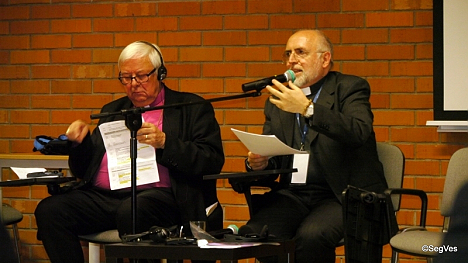
Jan 19, 2018 | Non categorizzato
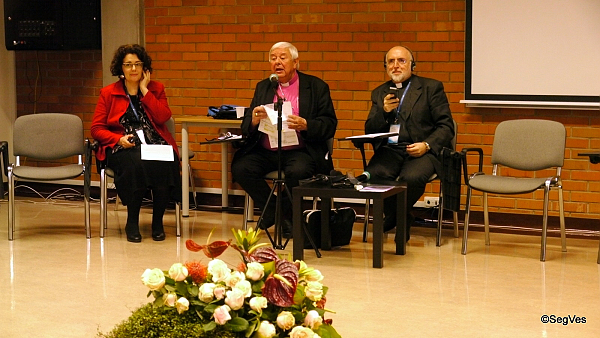
 Moran explained: “The charism God had gifted Chiara has its roots in an ecclesial dimension that can be shared by all the confessions, because it draws inspiration from the heart of the Gospel. And this can be related to the nature of the spirituality which arose from this charism: a spirituality that sets a ‘dialogue of life’ as the pre-condition to ecumenical dialogue. It is an ecumenism of ‘love,’ ‘truth,’ and ‘of the heart,’ terms which also recur today to underline a reciprocity of love that does not replace theological dialogue, but gives the opportunity to grow closer, in a profound ‘exchange of gifts’ that enrich one and the other.” Unity and reconciliation start in the heart, in the encounter between people in a warm reception, Morán underlined. But “the unity we live or seek,” he argued “is not uniformity, it is the Holy Spirit himself who generates diversity.” Therefore, it is not a theoretical approach, but a dynamic experience of evangelical love, an ecumenical laboratory which, in the experience of the Focolare, now binds Christians belonging to over 300 Churches, and which spread, at least as a self-awareness within numberless ecclesiastic settings. “Dialogue of life is fruitful” – he added – “also in and among the parishes of various Churches: a twinning that helps to mutually know one another and find new forms of collaboration for social and cultural projects. Also the youths belonging to various Churches are committed in the front line to support primary emergency actions or aid to the most needy.” What are the repercussions at theological level? “Some experts were called to take part in the official theological dialogues. Also at regional and especially diocesan levels, many have personally undertaken the commitment. An example, among many, are the theological symposiums established between the professors of the Rumanian-Orthodox Faculty of Cluj-Naponica (Romania) and the Sophia University Institute of Loppiano (Italy), where last 14 December an ecumenical chair was established, dedicated to Patriarch Athenagoras and Chiara Lubich. Silently but tenaciously, God is tracing an irreversible path to reach universal brotherhood, his design on humanity.” Morán ended his reflection with the words of the “Ottmaring Declaration” with which the Focolare Movement inaugurated the celebrations for the fifth centenary of the Reformation: “With all our hearts we want to support the Churches in the commitment to reach a full and visible communion. We shall do all that is possible to make our activities and initiatives be substantiated by this open and fraternal attitude among Christians.” Read the whole text
Moran explained: “The charism God had gifted Chiara has its roots in an ecclesial dimension that can be shared by all the confessions, because it draws inspiration from the heart of the Gospel. And this can be related to the nature of the spirituality which arose from this charism: a spirituality that sets a ‘dialogue of life’ as the pre-condition to ecumenical dialogue. It is an ecumenism of ‘love,’ ‘truth,’ and ‘of the heart,’ terms which also recur today to underline a reciprocity of love that does not replace theological dialogue, but gives the opportunity to grow closer, in a profound ‘exchange of gifts’ that enrich one and the other.” Unity and reconciliation start in the heart, in the encounter between people in a warm reception, Morán underlined. But “the unity we live or seek,” he argued “is not uniformity, it is the Holy Spirit himself who generates diversity.” Therefore, it is not a theoretical approach, but a dynamic experience of evangelical love, an ecumenical laboratory which, in the experience of the Focolare, now binds Christians belonging to over 300 Churches, and which spread, at least as a self-awareness within numberless ecclesiastic settings. “Dialogue of life is fruitful” – he added – “also in and among the parishes of various Churches: a twinning that helps to mutually know one another and find new forms of collaboration for social and cultural projects. Also the youths belonging to various Churches are committed in the front line to support primary emergency actions or aid to the most needy.” What are the repercussions at theological level? “Some experts were called to take part in the official theological dialogues. Also at regional and especially diocesan levels, many have personally undertaken the commitment. An example, among many, are the theological symposiums established between the professors of the Rumanian-Orthodox Faculty of Cluj-Naponica (Romania) and the Sophia University Institute of Loppiano (Italy), where last 14 December an ecumenical chair was established, dedicated to Patriarch Athenagoras and Chiara Lubich. Silently but tenaciously, God is tracing an irreversible path to reach universal brotherhood, his design on humanity.” Morán ended his reflection with the words of the “Ottmaring Declaration” with which the Focolare Movement inaugurated the celebrations for the fifth centenary of the Reformation: “With all our hearts we want to support the Churches in the commitment to reach a full and visible communion. We shall do all that is possible to make our activities and initiatives be substantiated by this open and fraternal attitude among Christians.” Read the whole text
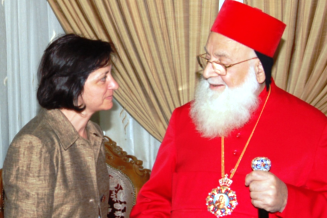
Jan 18, 2018 | Focolare Worldwide
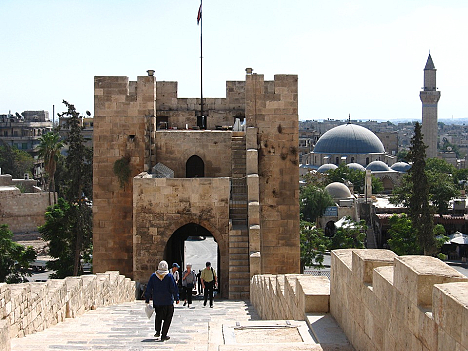 Mirvet Kelly’s grandfather was a deacon: “I remember going with him every Sunday to the Syro-Orthodox Divine Liturgy. I was proud to watch him all dressed in white as he recited his portion of the prayers at the altar.” There are several Christian Churches in Homs, Syria, where Mirvet grew up: Armenian Apostolic, Greek Orthodox and various Catholic Rites, Maronite, Melkite and Syro-Catholic. Before the war, even though we were linked to our own Churches, the faithful attended other Churches without any problem. “As I grew older,” she went on to say, “a lot of things changed: Grandfather died and the Divine Liturgy seemed long and outdated. I was the only Christian at school in the midst a lot of Muslims. At Christmas and Easter I’d be the only one absent and, when I returned, I was bombarded with questions: ‘Why are there so many Churches? Why was your Jesus crucified and rising from the dead on different dates in different Churches? Some friends and I decided to no longer belong to one Church or another, but to be Christians and that’s all. Like many of them, I stopped going to my own Church.” A
Mirvet Kelly’s grandfather was a deacon: “I remember going with him every Sunday to the Syro-Orthodox Divine Liturgy. I was proud to watch him all dressed in white as he recited his portion of the prayers at the altar.” There are several Christian Churches in Homs, Syria, where Mirvet grew up: Armenian Apostolic, Greek Orthodox and various Catholic Rites, Maronite, Melkite and Syro-Catholic. Before the war, even though we were linked to our own Churches, the faithful attended other Churches without any problem. “As I grew older,” she went on to say, “a lot of things changed: Grandfather died and the Divine Liturgy seemed long and outdated. I was the only Christian at school in the midst a lot of Muslims. At Christmas and Easter I’d be the only one absent and, when I returned, I was bombarded with questions: ‘Why are there so many Churches? Why was your Jesus crucified and rising from the dead on different dates in different Churches? Some friends and I decided to no longer belong to one Church or another, but to be Christians and that’s all. Like many of them, I stopped going to my own Church.” A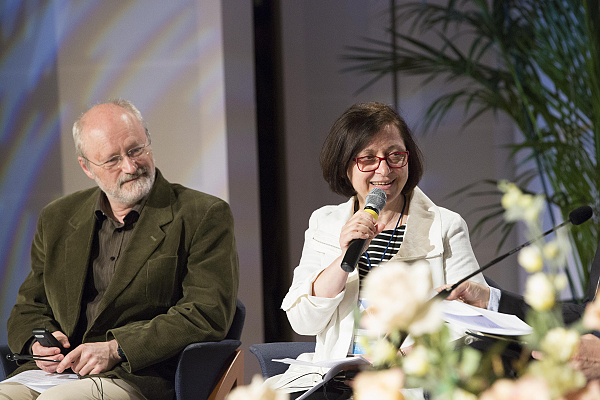 fter a while, Mirvet met a group that was trying to live the Gospel according to the Focolare spirituality. “Through them, I discovered that God is the Father of everyone and that we’re all loved by Him as sons and daughters. My life began to change. Every time I tried to love, going to visit an elderly person or a poor person, for example, my heart would be overcome with peace and joy. One day, I came across a sentence in one of Chiara Lubich’s writings: ‘We should love the other person’s Church as our own.’ Not only did I not love the other person’s Church – I didn’t even love my own Church, which I had criticized and abandoned. At that point, Mirvet’s life, which was already very fruitful both personally and ecumenically, took a new leap. She felt God calling her to give herself entirely to Him. “In the Focolare communities I’ve lived in,” she explained, “I found myself to be the only Orthodox among Catholics of all ages, countries, languages, cultures, Churches and ways of thinking. Trying to live in unity with all the different ideas about things is always a challenge, because each of us has her own tastes and ideas down to the smallest details.
fter a while, Mirvet met a group that was trying to live the Gospel according to the Focolare spirituality. “Through them, I discovered that God is the Father of everyone and that we’re all loved by Him as sons and daughters. My life began to change. Every time I tried to love, going to visit an elderly person or a poor person, for example, my heart would be overcome with peace and joy. One day, I came across a sentence in one of Chiara Lubich’s writings: ‘We should love the other person’s Church as our own.’ Not only did I not love the other person’s Church – I didn’t even love my own Church, which I had criticized and abandoned. At that point, Mirvet’s life, which was already very fruitful both personally and ecumenically, took a new leap. She felt God calling her to give herself entirely to Him. “In the Focolare communities I’ve lived in,” she explained, “I found myself to be the only Orthodox among Catholics of all ages, countries, languages, cultures, Churches and ways of thinking. Trying to live in unity with all the different ideas about things is always a challenge, because each of us has her own tastes and ideas down to the smallest details.  But when we try to appropriate the other person’s reality as our own, we experience that the differences become an enrichment. We often pray for each other’s Churches, in an ongoing growth in the faith and in the relationship with God. And almost without realizing it, we bring the fruit of our communion into our respective Churches, to our jobs and into our daily lives. It seems like a drop in the ocean, but even the tiniest steps united to those of many others in the world, can make a difference. In the countries of the Middle East where I lived, for example, I saw priests helping people, without ever asking what Church they belonged to. They did projects to help out different Churches, to help them meet their needs whether they were Christian – or even Muslim. Last year, Catholics and Orthodox celebrated Easter on the same day. Two Syrian friends who now live in Vienna, Austria, recently reported to me how they and many other Syrians have been helped by a parish priest and some Catholic women focolarini to look for a house, medicine and work. They formed a group in which they live and help each other to share their common Christian experience. In the United States there are more than fifty Syro-Orthodox Christians who meet regularly, once in the Orthodox churches and once in the Catholic churches. They experience that God is always with us and that we have to pray, to live and to love so that Jesus’s testament ‘that all may be one’ is fulfilled as soon as possible.”
But when we try to appropriate the other person’s reality as our own, we experience that the differences become an enrichment. We often pray for each other’s Churches, in an ongoing growth in the faith and in the relationship with God. And almost without realizing it, we bring the fruit of our communion into our respective Churches, to our jobs and into our daily lives. It seems like a drop in the ocean, but even the tiniest steps united to those of many others in the world, can make a difference. In the countries of the Middle East where I lived, for example, I saw priests helping people, without ever asking what Church they belonged to. They did projects to help out different Churches, to help them meet their needs whether they were Christian – or even Muslim. Last year, Catholics and Orthodox celebrated Easter on the same day. Two Syrian friends who now live in Vienna, Austria, recently reported to me how they and many other Syrians have been helped by a parish priest and some Catholic women focolarini to look for a house, medicine and work. They formed a group in which they live and help each other to share their common Christian experience. In the United States there are more than fifty Syro-Orthodox Christians who meet regularly, once in the Orthodox churches and once in the Catholic churches. They experience that God is always with us and that we have to pray, to live and to love so that Jesus’s testament ‘that all may be one’ is fulfilled as soon as possible.”
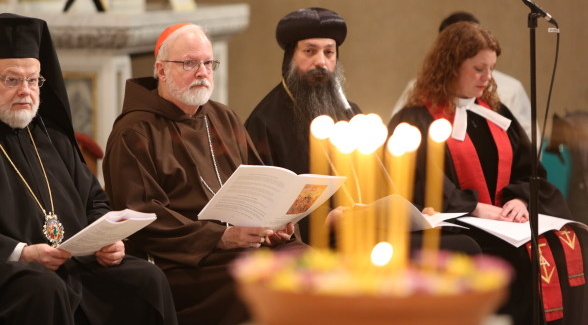
Jan 17, 2018 | Non categorizzato
 The Week of Prayer for Christian Unity has been celebrated for 110 years. It was an ecumenical initiative held between the feasts of Saint Peter on January 18th and the Conversion of Saint Paul on January 25th. It was first promoted by Reverend Paul Wattson, founder of Graymoor in New York. In the Southern Hemisphere it is celebrated during the Season of Pentecost. The event has a precedent in Scotland, in 1740 with a Pentecostal Evangelical preacher who invited all to a day of prayer for unity. The same invitation was extended by the Ecumenical Patriarch of Constantinople, Joachim III in 1902. In 1894 Pope Leo XIII encouraged an Octave of Prayer for Unity. During the Second Vatican Council the Catholic Church highlighted prayer as the soul of the Ecumenical Movement. In 1966, the Pontifical Council for the Promotion of Christian Unity and the Faith Constitution of the Ecumenical Council of the Church called for the joint preparation of the official texts for the Week of Prayer, a task that has been entrusted for over thirty years to different local ecumenical teams. For 2018, the Churches of the Caribbean were chosen, and the team was comprised of Roman Catholics, Baptists, Anglicans, and Methodists. The Focolare Movement is committed to promoting this important event, which is in accordance with Jesus’s prayer to the Father “that all may be one” (Jn 17:21).
The Week of Prayer for Christian Unity has been celebrated for 110 years. It was an ecumenical initiative held between the feasts of Saint Peter on January 18th and the Conversion of Saint Paul on January 25th. It was first promoted by Reverend Paul Wattson, founder of Graymoor in New York. In the Southern Hemisphere it is celebrated during the Season of Pentecost. The event has a precedent in Scotland, in 1740 with a Pentecostal Evangelical preacher who invited all to a day of prayer for unity. The same invitation was extended by the Ecumenical Patriarch of Constantinople, Joachim III in 1902. In 1894 Pope Leo XIII encouraged an Octave of Prayer for Unity. During the Second Vatican Council the Catholic Church highlighted prayer as the soul of the Ecumenical Movement. In 1966, the Pontifical Council for the Promotion of Christian Unity and the Faith Constitution of the Ecumenical Council of the Church called for the joint preparation of the official texts for the Week of Prayer, a task that has been entrusted for over thirty years to different local ecumenical teams. For 2018, the Churches of the Caribbean were chosen, and the team was comprised of Roman Catholics, Baptists, Anglicans, and Methodists. The Focolare Movement is committed to promoting this important event, which is in accordance with Jesus’s prayer to the Father “that all may be one” (Jn 17:21).
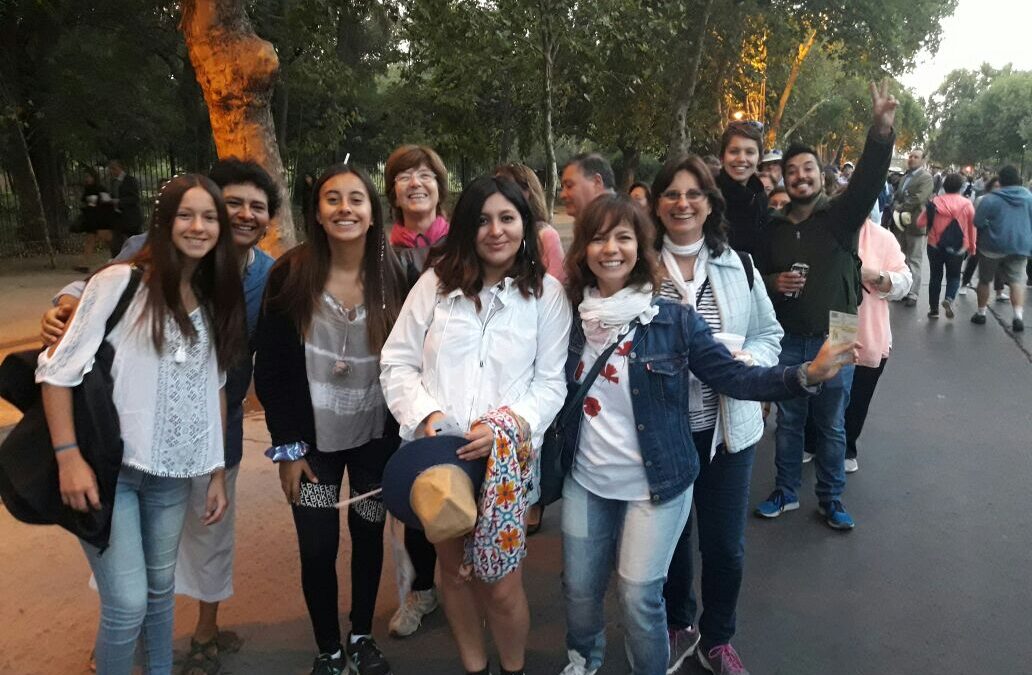
Jan 17, 2018 | Focolare Worldwide
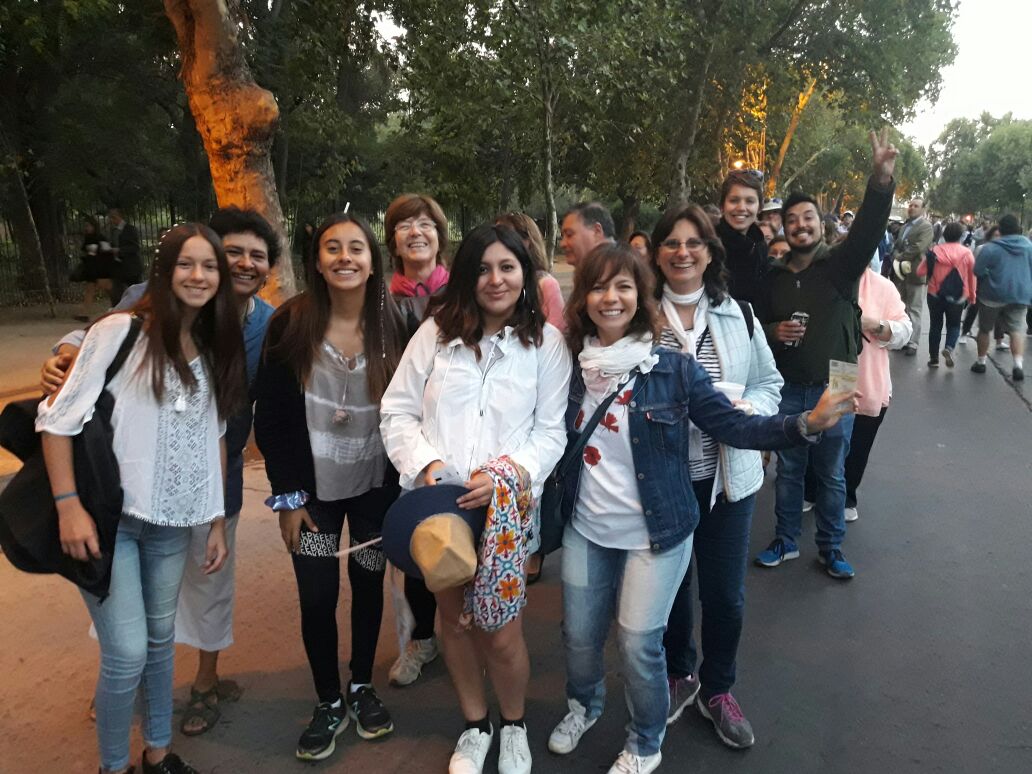 It is the second day of Pope Francis in “their” land, after he landed in the evening of 15 January at the Airport of Santiago, to start a journey that in two weeks will touch base with two South American countries. “I want to look into your eyes, face to face,” he had said before setting out on his journey. About 15,000 volunteers are at work, offering their talents, time and commitment, to provide a fundamental service in the various events that will be held during the first lap in Chile. “This experience breaks the limits of a task we are entrusted with: in fact, it is the sincere expression of a commitment which will mark our lives forever,” some of them said. “In contrast with the apathy expressed by some of the media, the youths of Chile offer a note of enthusiasm and emotion for the Pope’s arrival,” well expressed by the song composed by Claudio González Carrasco, of the Focolare community in Temuco (southern Chile). Welcomed by the outgoing President, Michelle Bachelet, the Pope then proceeded towards the Apostolic Nunciature, where he will stay during this first lap. Among the many fundamental moments of the journey in Chile, will be the meeting with Chilean mapuches populations, who are battling to safeguard their own identity, and the Mass of 17 January for the indigenous populations of the region.
It is the second day of Pope Francis in “their” land, after he landed in the evening of 15 January at the Airport of Santiago, to start a journey that in two weeks will touch base with two South American countries. “I want to look into your eyes, face to face,” he had said before setting out on his journey. About 15,000 volunteers are at work, offering their talents, time and commitment, to provide a fundamental service in the various events that will be held during the first lap in Chile. “This experience breaks the limits of a task we are entrusted with: in fact, it is the sincere expression of a commitment which will mark our lives forever,” some of them said. “In contrast with the apathy expressed by some of the media, the youths of Chile offer a note of enthusiasm and emotion for the Pope’s arrival,” well expressed by the song composed by Claudio González Carrasco, of the Focolare community in Temuco (southern Chile). Welcomed by the outgoing President, Michelle Bachelet, the Pope then proceeded towards the Apostolic Nunciature, where he will stay during this first lap. Among the many fundamental moments of the journey in Chile, will be the meeting with Chilean mapuches populations, who are battling to safeguard their own identity, and the Mass of 17 January for the indigenous populations of the region.
Jan 16, 2018 | Non categorizzato
“Various circumstances had pointed out that we could no longer remain in Venezuela, our country. Armando had been fired and a letter from Perù had sparked a glimmer of hope. It seemed that God was calling us there.” With these words Ofelia and Armando started to recount their adventure, forced to leave behind their already adult sons Daniel and Felix, to find a home, work, and a future for all in another country. “Without a dime we started to prepare ourselves. We also received a sum to allow us to cover the costs of the journey. It’s traumatic to leave one’s own country. Our daughter had already left for Peru in October, but at the frontier they had taken away her PC and money. On this premise we headed off for the border.” Armando and Ofelia left everything but brought along a photo of Domenico Mangano: a person of great faith, committed to the Focolare community in central Italy, and a pugnacious politician who died in 2001 and for whom cause for beatification had been initiated recently. “We asked him to take care of our journey.” «Crossing the border incredibly did not cause any particular difficulties. We crossed over almost as if we were invisible, and a young woman, like an angel, instructed us on what we had to do. After just one check on our baggage we passed, without the pressing crowd that had amassed at the border the days before. We could hardly believe it. We thought that it was due to the help of Domenico, and once again we entrusted ourselves to him. Due to a slight mishap we arrived in Quito and spent the night in the women’s Focolare house. Some members of the local community brought us to dinner and a walk in the day time. After a journey of seven days, we finally got to Lima.” In Lima, Ofelia and Armando were hosted in the house of Elba and Mario, besides receiving clothing, a food bag and cash. “We visited both focolare houses, and went to Centro Fiore to help prepare Christmas lunch which the communities of Lima offer to girls saved from white slavery, and are guests of the nuns. They were happy. We also met again, Silvano and Nilde, who had left Venezuela before us. Everyone received us with love, and we felt like a real family.” “On Christmas day a family invited us to their home and after lunch we went for a walk. Now we pray to the Lord to help us find a house and a job. We have undergone so many experiences and we know that Domenico and Chiara Lubich continue to help us from above. “One night, while we were sleeping,” continued Ofelia “a barefooted girl holding a babe in her arms knocked on our door. It was not our house, but we decided to open just the same, since it seemed that Jesus himself was asking our help. It was the neighbour on the floor above, whose husband was drunk and maltreating her. She told us that up until then she had never dared to knock on another door of the condominium, but that she had seen us some day earlier while we were going down the stairs, and in her heart thought that she could trust us. And now there she was before us. Armando went to speak to her husband, while I tried to console the young woman. A few days later she was able to return to her apartment and now Armando and that man are continually in contact. We are overjoyed in having loved Jesus in that family. As to us, God will guide us to understand what he wants from us.” But with a renewed hope: “We are certain that the detachment from our family, our country and friends, will bear fruit.” Gustavo Clariá
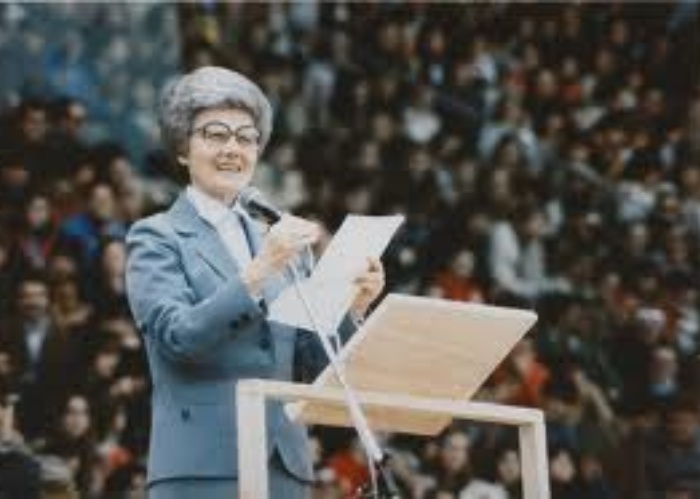
Jan 15, 2018 | Non categorizzato
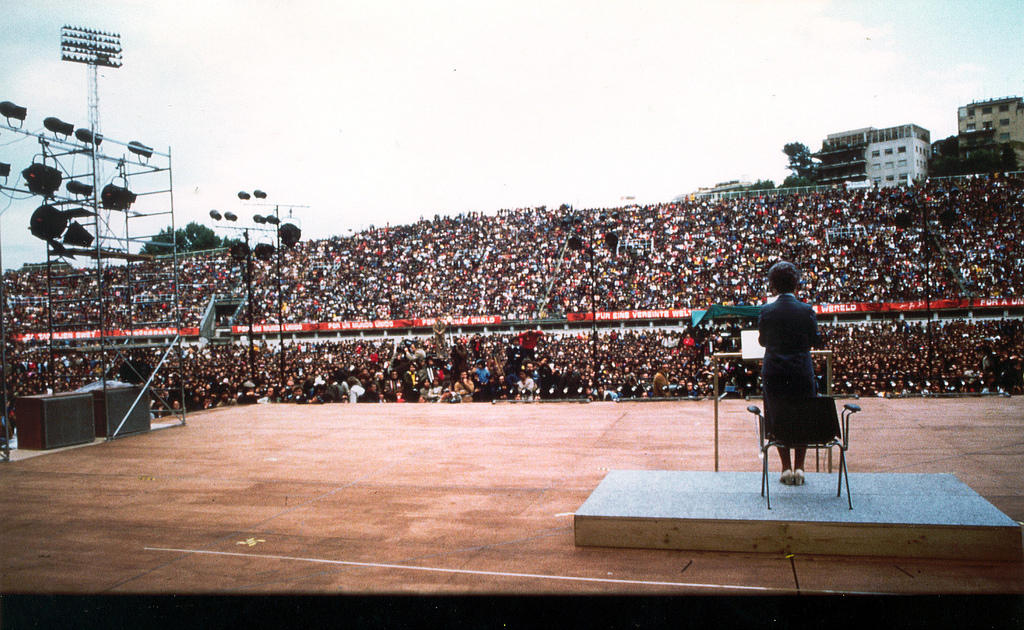 I was born and grew up in Macau, a former Portuguese colony is now part of Continental China, where I got to know the Ideal of unity at a Mariapolis. Macau is a small city that can be visited in few hours, so the invitation to take part in a Genfest in Rome, with thousands of young people from around the world – really appealed to me, even though I didn’t have least idea of what it was. We had just begun to live this ideal of unity, with other young people and a few women focolarini who often came to visit us and bring us the news and the concrete life of the Gospel that is lived in the Movement around the world. That world that I had known only through my geography lessons, but that now, with the Ideal of unity, had become smaller and nearer. Just arrived in Rome, several days earlier, we found ourselves in a house with lots of young people from Philippines, Hong Kong, Australia, Latin America…. How could I live with all of them? We Asians were a bit shy and, not knowing the language, we didn’t know how to communicate. Instead, there was no need to talk in order to understand one another, because we had same joy in common and from the very first, there as a very strong mutual understanding among all of us. After only a couple days, we already felt like we were one family. Then we learned that the title of the Genfest was: For A United World. The Genfest was going to be held at an open stadium, so I remember us praying a lot that it wouldn’t rain. Hundreds of buses from Europe were awaiting us. We learned that Chiara Lubich (whom I had not yet met in person) wanted the Genfest to be a moment of God. More than to the fest, Chiara brought us to the essential.
I was born and grew up in Macau, a former Portuguese colony is now part of Continental China, where I got to know the Ideal of unity at a Mariapolis. Macau is a small city that can be visited in few hours, so the invitation to take part in a Genfest in Rome, with thousands of young people from around the world – really appealed to me, even though I didn’t have least idea of what it was. We had just begun to live this ideal of unity, with other young people and a few women focolarini who often came to visit us and bring us the news and the concrete life of the Gospel that is lived in the Movement around the world. That world that I had known only through my geography lessons, but that now, with the Ideal of unity, had become smaller and nearer. Just arrived in Rome, several days earlier, we found ourselves in a house with lots of young people from Philippines, Hong Kong, Australia, Latin America…. How could I live with all of them? We Asians were a bit shy and, not knowing the language, we didn’t know how to communicate. Instead, there was no need to talk in order to understand one another, because we had same joy in common and from the very first, there as a very strong mutual understanding among all of us. After only a couple days, we already felt like we were one family. Then we learned that the title of the Genfest was: For A United World. The Genfest was going to be held at an open stadium, so I remember us praying a lot that it wouldn’t rain. Hundreds of buses from Europe were awaiting us. We learned that Chiara Lubich (whom I had not yet met in person) wanted the Genfest to be a moment of God. More than to the fest, Chiara brought us to the essential.

Chiara Lubich
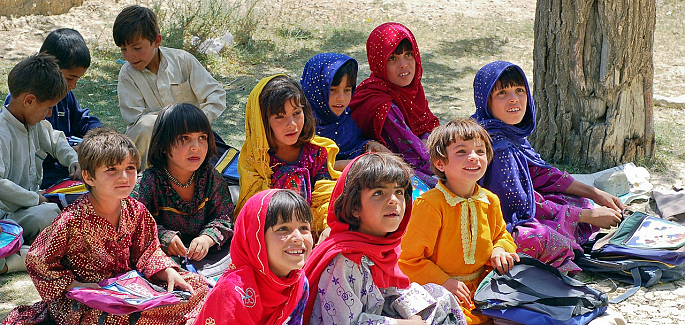
Jan 13, 2018 | Non categorizzato

Foto: Pixabay
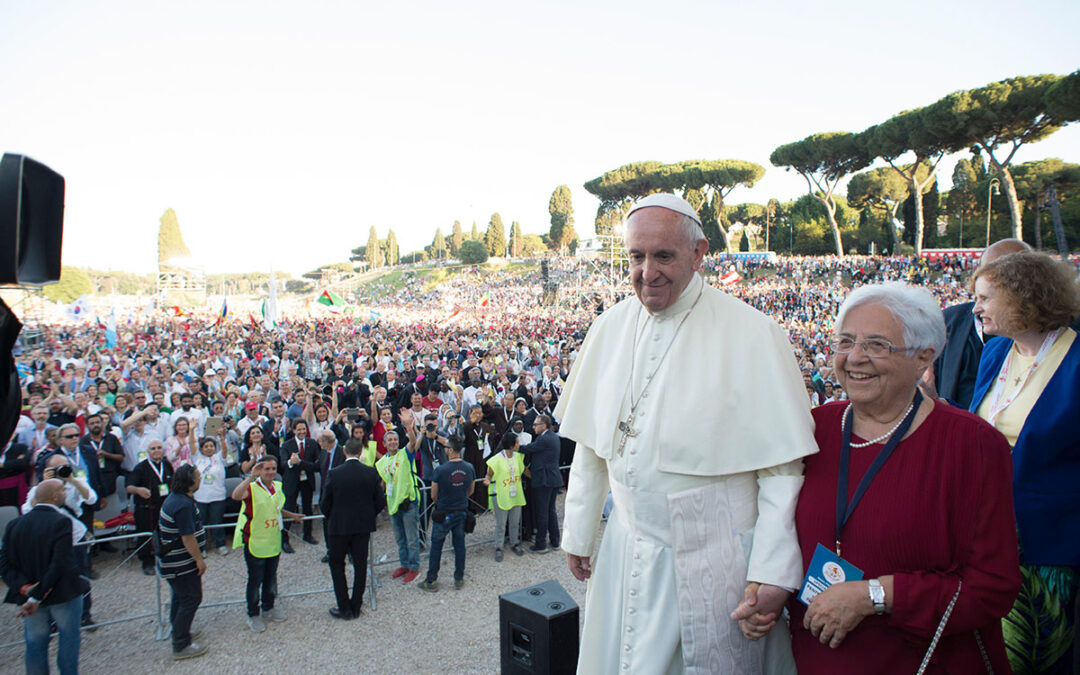
Jan 12, 2018 | Non categorizzato
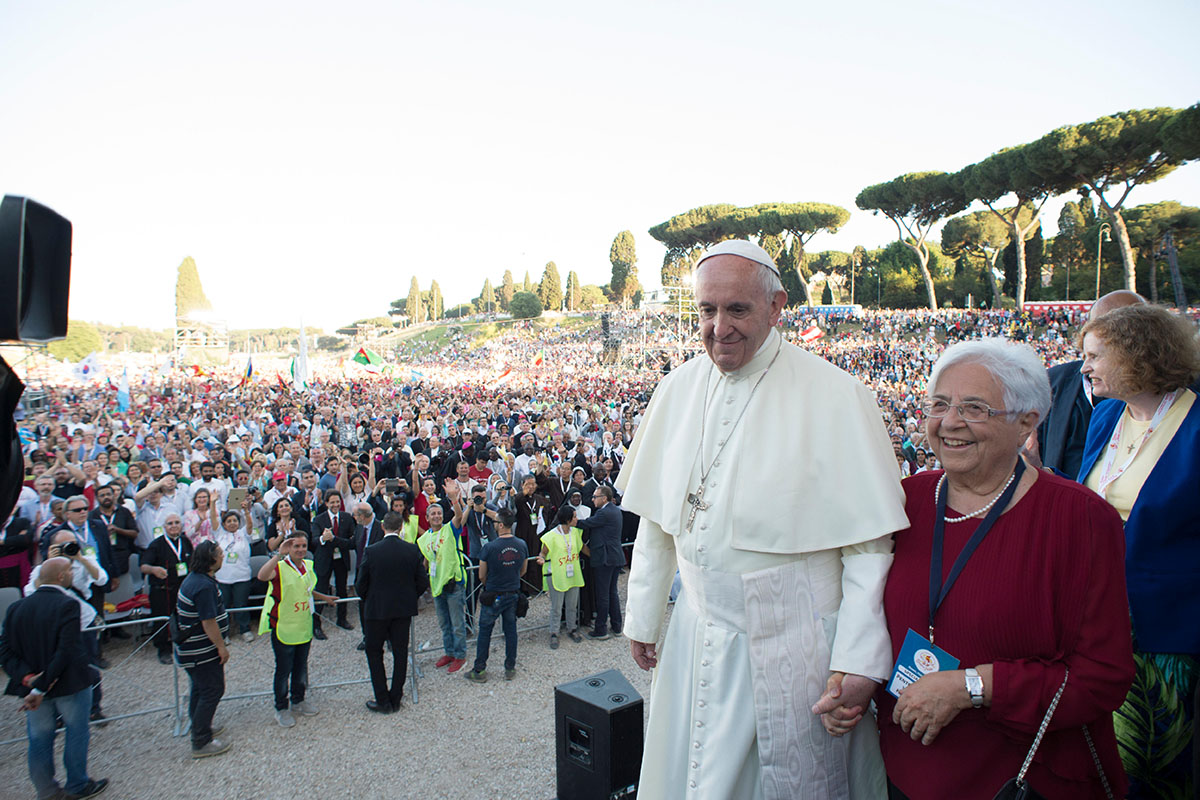
© Osservatore Romano
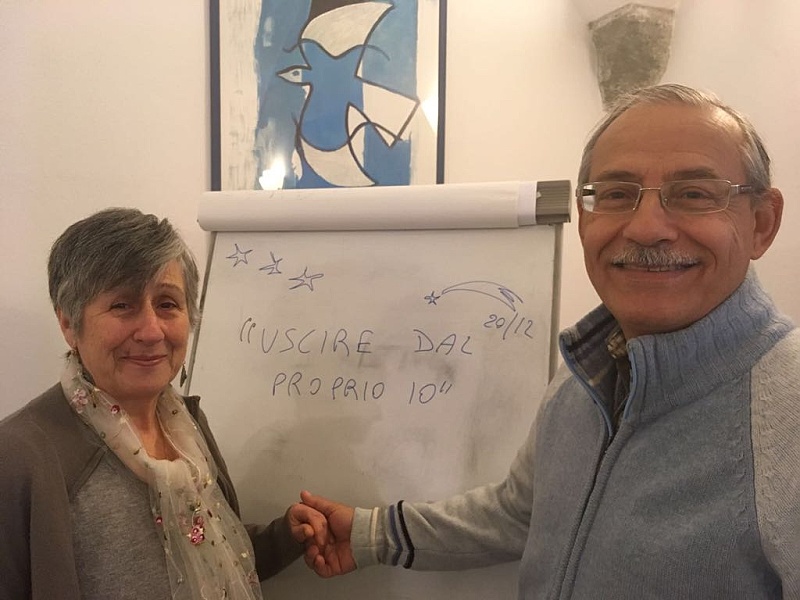
Jan 11, 2018 | Focolare Worldwide
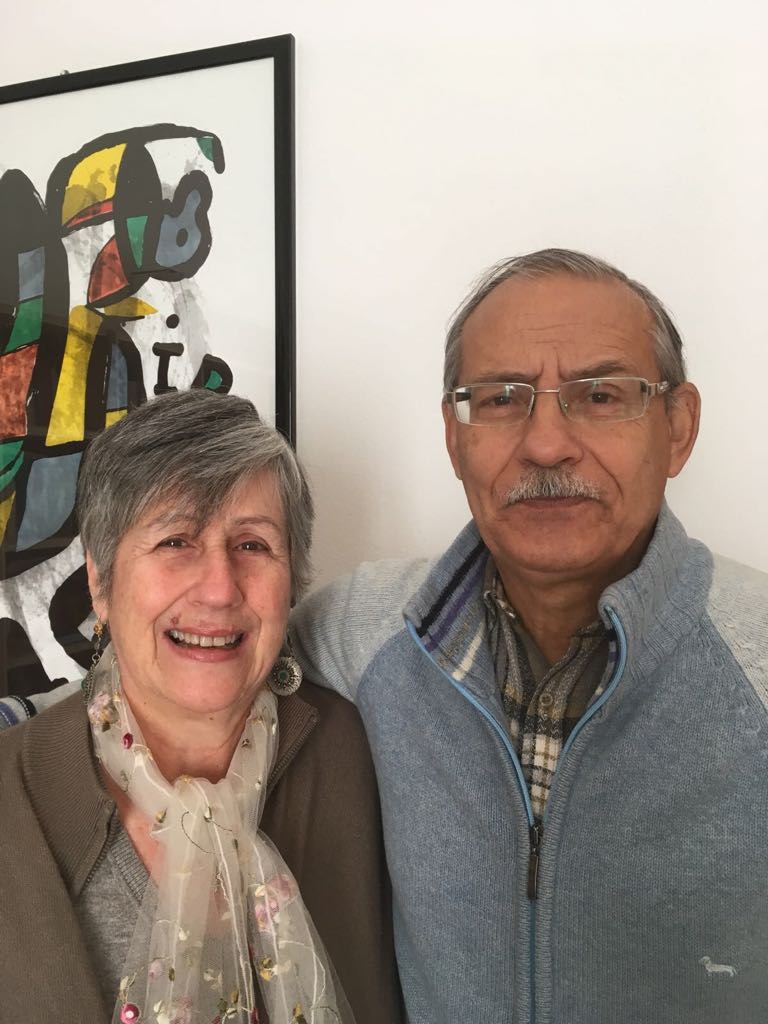 Rosy and Leo Prisco are from Naples, Italy. He’s a railroad worker and she’s an accountant. They’re retired. Their story began 40 years ago at a time when couples who opted for a civil ceremonies were very few. They were agnostics and went to city hall for their wedding. They were so different from each other that no one was betting on their staying together. At the birth of their first child they had a doubt: Should they baptize him or not? They spoke with the parish priest. “For us, adamant Marxists and agnostics, it was unthinkable that a priest should welcome us in such a warm, friendly and open way. Father Salvatore didn’t express a single judgement towards us regarding our situation as a couple, but he became a friend to the point that we were even able to tell him about our constant fighting. Yes, because it was easy to be a revolutionary when we were outside the house, inside the house I was the one doing all the cooking and cleaning. I remember how – to get Leo to listen to me (I was a bit crazy, but at least it worked sometimes!) – I’d do what we did when we held protests on the town square: I’d hang signs on the kitchen walls that said: ‘You’re a tyrant,’ ‘You’re treading on the equality of women,’ and so on. Father Salvatore introduced us to other couples. They were also having problems but had learned to dialogue, and they also had a secret: apologizing and beginning again. We began doing the same, which helped to improve our relationship one day at a time. Meanwhile, Father Salvatore agreed to celebrate Francesco’s baptism and, six years later, the baptism of Nunzio.” “Thanks to Father Salvatore and the other families,” Leo explains, “we had an encounter with God and with God’s love and, little by little, the desire grew in us to be children in accordance with God’s heart.” We came to realize that even though we had turned our backs on him, He never stopped speaking to us, because He is Love. Just as He had in 1993, inside a mortuary room at a hospital. There, by chance, we had come across the pain of two parents whose little angel, a boy of three years, had died. That was a powerful message to us. What if that happened to us? They were the same parents that we met again at a Focolare meeting, invited by Father Salvatore. Yet, from that pain of theirs three family homes were opened for children in difficulty.”
Rosy and Leo Prisco are from Naples, Italy. He’s a railroad worker and she’s an accountant. They’re retired. Their story began 40 years ago at a time when couples who opted for a civil ceremonies were very few. They were agnostics and went to city hall for their wedding. They were so different from each other that no one was betting on their staying together. At the birth of their first child they had a doubt: Should they baptize him or not? They spoke with the parish priest. “For us, adamant Marxists and agnostics, it was unthinkable that a priest should welcome us in such a warm, friendly and open way. Father Salvatore didn’t express a single judgement towards us regarding our situation as a couple, but he became a friend to the point that we were even able to tell him about our constant fighting. Yes, because it was easy to be a revolutionary when we were outside the house, inside the house I was the one doing all the cooking and cleaning. I remember how – to get Leo to listen to me (I was a bit crazy, but at least it worked sometimes!) – I’d do what we did when we held protests on the town square: I’d hang signs on the kitchen walls that said: ‘You’re a tyrant,’ ‘You’re treading on the equality of women,’ and so on. Father Salvatore introduced us to other couples. They were also having problems but had learned to dialogue, and they also had a secret: apologizing and beginning again. We began doing the same, which helped to improve our relationship one day at a time. Meanwhile, Father Salvatore agreed to celebrate Francesco’s baptism and, six years later, the baptism of Nunzio.” “Thanks to Father Salvatore and the other families,” Leo explains, “we had an encounter with God and with God’s love and, little by little, the desire grew in us to be children in accordance with God’s heart.” We came to realize that even though we had turned our backs on him, He never stopped speaking to us, because He is Love. Just as He had in 1993, inside a mortuary room at a hospital. There, by chance, we had come across the pain of two parents whose little angel, a boy of three years, had died. That was a powerful message to us. What if that happened to us? They were the same parents that we met again at a Focolare meeting, invited by Father Salvatore. Yet, from that pain of theirs three family homes were opened for children in difficulty.”  For Rosy and Leo, who in 1995 said their yes in the Sacrament of Marriage, finding Gino and Elisa within the context of the Focolare appeared to be no small coincidence. “Right away a bond was established,” Rosy recounts, “which led us to offer our full-time help as foster parents in a home for families who came to stay at Casa Sorriso for longer or shorter time periods, depending on their family situations.” “This experience,” Leo confides, “gave us an awareness of being merely instruments in God’s hands, and being able to be of help wasn’t a matter of having any special gifts. Today, as then, we’re not the perfect family. We just want to place ourselves at the service of Jesus in the people we meet. Like those little Russian children that we took into our home: a relationship that continues until today now that they’re adults.” In the beginning of 2017, already retired, they wanted to celebrate the 50th anniversary of the New Families Movement by being actively involved in some of the celebratory events. They also took part in a meal for young people. The year came to an end, but not their determination to give more. Last October they moved to Loppiano, planning to stay until July and be able to follow things more closely: practical things like transportation for the families that go there from around the world.
For Rosy and Leo, who in 1995 said their yes in the Sacrament of Marriage, finding Gino and Elisa within the context of the Focolare appeared to be no small coincidence. “Right away a bond was established,” Rosy recounts, “which led us to offer our full-time help as foster parents in a home for families who came to stay at Casa Sorriso for longer or shorter time periods, depending on their family situations.” “This experience,” Leo confides, “gave us an awareness of being merely instruments in God’s hands, and being able to be of help wasn’t a matter of having any special gifts. Today, as then, we’re not the perfect family. We just want to place ourselves at the service of Jesus in the people we meet. Like those little Russian children that we took into our home: a relationship that continues until today now that they’re adults.” In the beginning of 2017, already retired, they wanted to celebrate the 50th anniversary of the New Families Movement by being actively involved in some of the celebratory events. They also took part in a meal for young people. The year came to an end, but not their determination to give more. Last October they moved to Loppiano, planning to stay until July and be able to follow things more closely: practical things like transportation for the families that go there from around the world.
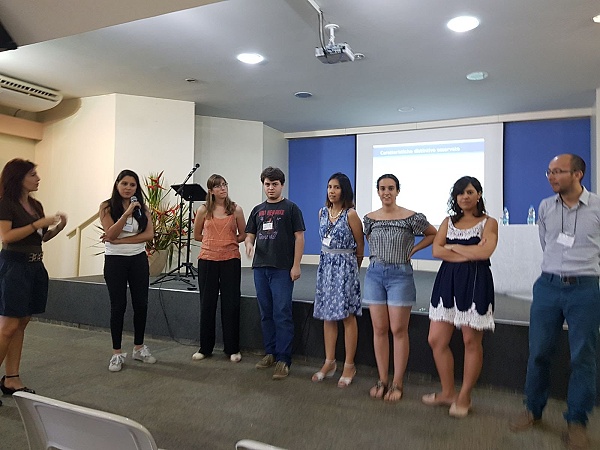
Jan 10, 2018 | Focolare Worldwide
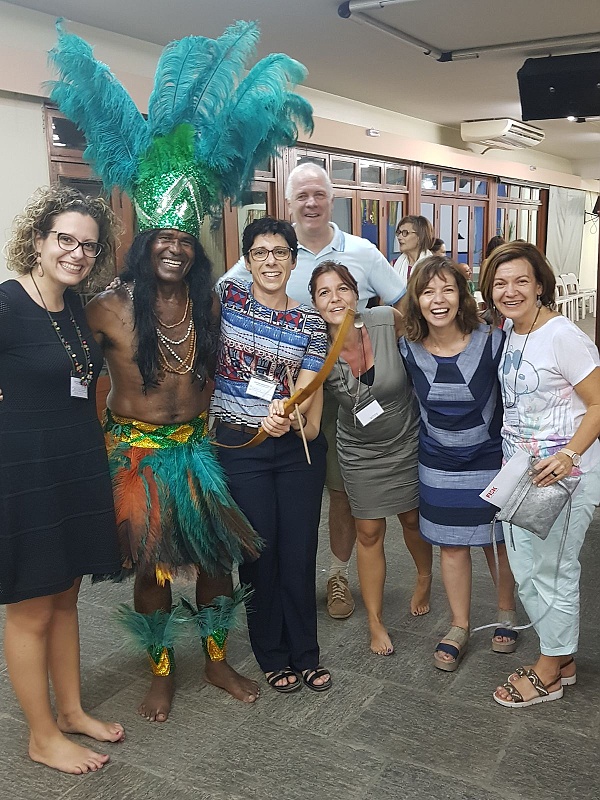 A warm summer atmosphere of the Southern Hemisphere was the framework of an encounter with the sociology of Latin America, which some of the participants described as “dazzling”. Every time we love, every time we give, it’s Christmas, claims the book “Love in the Time of Globalization”, written by Social-One Secretary, Silvia Cataldi, researcher at La Sapienza University of Rome, along with Vera Araujo and Gennaro Iorio who wrote Toward a new conception of sociology (Città Nuova, 2015). Sociologists pondered that same agape dimension during study sessions and in workshops.
A warm summer atmosphere of the Southern Hemisphere was the framework of an encounter with the sociology of Latin America, which some of the participants described as “dazzling”. Every time we love, every time we give, it’s Christmas, claims the book “Love in the Time of Globalization”, written by Social-One Secretary, Silvia Cataldi, researcher at La Sapienza University of Rome, along with Vera Araujo and Gennaro Iorio who wrote Toward a new conception of sociology (Città Nuova, 2015). Sociologists pondered that same agape dimension during study sessions and in workshops.
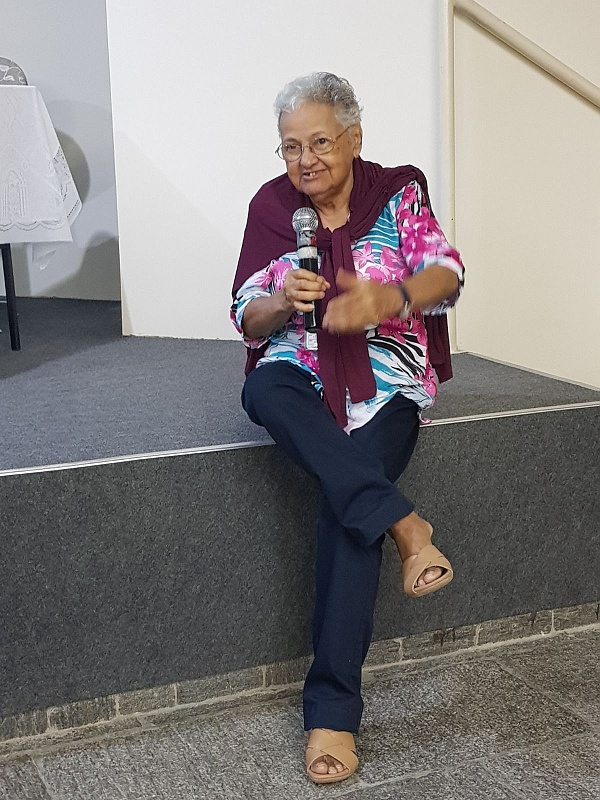
Vera Araujo
 One Brazilian student and social worker commented: “The summer school was a confirmation for me of the importance of interdisciplinary approaches. I’m a social worker in contact with suffering people who have had their human dignity taken away. A new understanding of what it means to be a human person generates new practices that can activate dormant aspects of human nature.” A professor from Recife: “Agape is not only a sociological concept, but crosses over into the fields of philosophy and metaphysics. I saw that love is at work in your group too. From this standpoint, a loving and generous dialogue has been started.” Giuseppe Pellegrini, from the University of Padua: “The encounter with the Latin American culture is always enriching. For me, it’s a way to know my own country better. The need of testing our categories and concepts, the ability to read the social reality and its changes were some of the most stimulating elements I found here. At a distance of thirty years from my first experience in Brazil, I felt the same vibrations, the same energy that animates this very diverse people in the ways of manifesting communitarian life. The effort put forth by so many people that live according to the ideal of Chiara Lubich has produced genuine and respectable fruits in Latin American life. Agapic behavior is one manifestation of mutual love, a generative and contagious element, both theoretical and practical, at a level that is capable of influencing social, cultural and political change.” The next step for Social-One will be a conference on the 7th and 8th of June at the Italian University of Salerno, Italy. The continuing dialogue with contemporary sociology, but also to host a “social” Expo of best practices of associations and institutes that work in the field of society.
One Brazilian student and social worker commented: “The summer school was a confirmation for me of the importance of interdisciplinary approaches. I’m a social worker in contact with suffering people who have had their human dignity taken away. A new understanding of what it means to be a human person generates new practices that can activate dormant aspects of human nature.” A professor from Recife: “Agape is not only a sociological concept, but crosses over into the fields of philosophy and metaphysics. I saw that love is at work in your group too. From this standpoint, a loving and generous dialogue has been started.” Giuseppe Pellegrini, from the University of Padua: “The encounter with the Latin American culture is always enriching. For me, it’s a way to know my own country better. The need of testing our categories and concepts, the ability to read the social reality and its changes were some of the most stimulating elements I found here. At a distance of thirty years from my first experience in Brazil, I felt the same vibrations, the same energy that animates this very diverse people in the ways of manifesting communitarian life. The effort put forth by so many people that live according to the ideal of Chiara Lubich has produced genuine and respectable fruits in Latin American life. Agapic behavior is one manifestation of mutual love, a generative and contagious element, both theoretical and practical, at a level that is capable of influencing social, cultural and political change.” The next step for Social-One will be a conference on the 7th and 8th of June at the Italian University of Salerno, Italy. The continuing dialogue with contemporary sociology, but also to host a “social” Expo of best practices of associations and institutes that work in the field of society.
Jan 9, 2018 | Non categorizzato
On its 50th birth anniversary, the international Gen Verde band has recorded “TURN IT UP!” “It is an invitation,” they said, “to raise the volume of unity.” And this calls for a concrete, universal love that is able to take the initiative. This idea has toured the globe with the group, echoing in squares, schools and homes throughout the world. It has contaminated many and has become a life commitment. “As the year is about to end,”he artists added, “the idea has returned ’in a million hues’, sung by numberless voices, and danced with the fantasy of different peoples. And these 465 boys and girls from 31 cities of 21 countries in 5 continents are the protagonists of the video clip, ‘TURN IT UP!’ with their passion, enthusiasm and joy.” https://youtu.be/DKoodP6IYqg?t=40
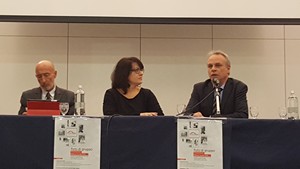
Jan 8, 2018 | Focolare Worldwide
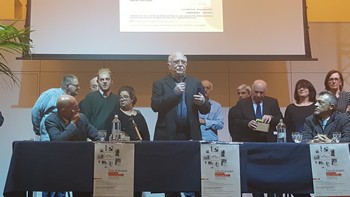 It was a very unique “group photo” taken during a public presentation of the social budget of the Tassano Group in the presence of some of the protagonists and authorities. Over time the Group was transformed from a cooperative into a consortium, and from a consortium into a group of consortia. It is complex and made up of different parts, currently comprised of 33 cooperatives that offer diversified services to 4,700 direct users and 100 thousand indirect users in the northwest region of Italy, which arrives from a brief stretch away at the sea and Mediterranean farmland all the way to the snow-covered mountains of winter. It involves 700 employees formed in the spirit of the economy of communion. “It’s an economic approach that the world doesn’t follow,” Luigino Bruni explained, “but it exists. Businesses who follow it try to destine profits in three directions: a part for creating jobs, a part for helping the poor, and a part for spreading this culture. The Tassano story is a love story made of employees and work that generated wealth and values.”
It was a very unique “group photo” taken during a public presentation of the social budget of the Tassano Group in the presence of some of the protagonists and authorities. Over time the Group was transformed from a cooperative into a consortium, and from a consortium into a group of consortia. It is complex and made up of different parts, currently comprised of 33 cooperatives that offer diversified services to 4,700 direct users and 100 thousand indirect users in the northwest region of Italy, which arrives from a brief stretch away at the sea and Mediterranean farmland all the way to the snow-covered mountains of winter. It involves 700 employees formed in the spirit of the economy of communion. “It’s an economic approach that the world doesn’t follow,” Luigino Bruni explained, “but it exists. Businesses who follow it try to destine profits in three directions: a part for creating jobs, a part for helping the poor, and a part for spreading this culture. The Tassano story is a love story made of employees and work that generated wealth and values.” 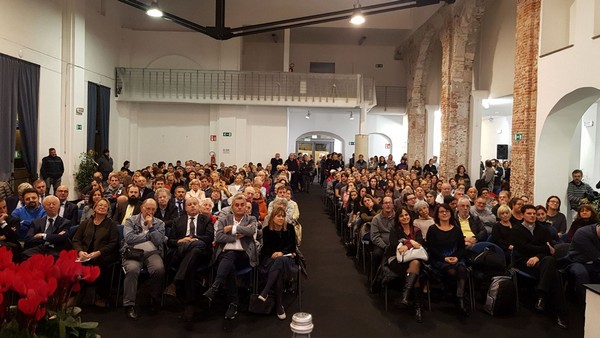 It’s a story that began a long time ago when, in 1989, two friends, small local businessmen, Gicaomo Linaro and Piero Cattani, together with 24 volunteer partners adherents to the Focolare Movement, started a cooperative to respond to the many cases of social poverty in the region. The cooperative grew and gradually won the trust of several interlocutors, including public ones, which led to the acquisition of new services. Two years later, the members of Tassano felt that their objectives were in perfect harmony with the Economy of Communion Project begun by Chiara Lubich in Brazil so that it spread solidarity at a global level. They joined the project at once. Little by little, the diversified growth of the different activities and the consequent growth of new specialized cooperatives gave rise to a Consortium of businesses that remain independent administratively, but are united in the experience, all operating with the same spirit in the social, educational and assistance field, with services geared towards the weakest strands of the population, elderly who are alone, the disabled, mentally ill, unemployed, but also families, children and young people, as well as a view towards the maintenance and appreciation of the region. In 1997, Tassano became a Group of Business Cooperatives, with the intent of unifying the difference business and social experiences that already existed, but also to act as an incubator of new production agencies. In the future, all the strategic areas will flow into consortia that will be able to consolidate growth and favour further development.
It’s a story that began a long time ago when, in 1989, two friends, small local businessmen, Gicaomo Linaro and Piero Cattani, together with 24 volunteer partners adherents to the Focolare Movement, started a cooperative to respond to the many cases of social poverty in the region. The cooperative grew and gradually won the trust of several interlocutors, including public ones, which led to the acquisition of new services. Two years later, the members of Tassano felt that their objectives were in perfect harmony with the Economy of Communion Project begun by Chiara Lubich in Brazil so that it spread solidarity at a global level. They joined the project at once. Little by little, the diversified growth of the different activities and the consequent growth of new specialized cooperatives gave rise to a Consortium of businesses that remain independent administratively, but are united in the experience, all operating with the same spirit in the social, educational and assistance field, with services geared towards the weakest strands of the population, elderly who are alone, the disabled, mentally ill, unemployed, but also families, children and young people, as well as a view towards the maintenance and appreciation of the region. In 1997, Tassano became a Group of Business Cooperatives, with the intent of unifying the difference business and social experiences that already existed, but also to act as an incubator of new production agencies. In the future, all the strategic areas will flow into consortia that will be able to consolidate growth and favour further development.  Maurizio Cantamessa, president of the Group, explains: “We’re quite a cohesive group, sharing the same values and understanding at the level of every day work. It was the right moment to group together, to consolidate and start again. The fact of being concentrated on the region is very important, because it favours relationships. We work side by side every day with local institutions every day. Being in the business of serving people, it’s important to be here in person. Business and solidarity together. Even with all the changes, the mission of the Group has always stayed the same: to promote a concept of business dealing geared towards the integral and solidarity promotion of the human person and of society, while not neglecting a strong orientation towards the market, through the individuation of objectives and business development plans that can lead to the creation of new businesses and new jobs. In demonstration of the fact that the values and ideas of the cooperative can be translated into concrete work actions in favour of the region and its citizens.
Maurizio Cantamessa, president of the Group, explains: “We’re quite a cohesive group, sharing the same values and understanding at the level of every day work. It was the right moment to group together, to consolidate and start again. The fact of being concentrated on the region is very important, because it favours relationships. We work side by side every day with local institutions every day. Being in the business of serving people, it’s important to be here in person. Business and solidarity together. Even with all the changes, the mission of the Group has always stayed the same: to promote a concept of business dealing geared towards the integral and solidarity promotion of the human person and of society, while not neglecting a strong orientation towards the market, through the individuation of objectives and business development plans that can lead to the creation of new businesses and new jobs. In demonstration of the fact that the values and ideas of the cooperative can be translated into concrete work actions in favour of the region and its citizens.
Jan 6, 2018 | Non categorizzato
These three wise men from the East, the Magi who hurried across the desert in search of a small boy, prefigure the march of Christianity to rediscover its innocence. That small boy was a king, albeit a king without lodgings. But they went anyway, walking in by starlight, guided by a star. That is the miracle of the Christ, who forces people out from their fixed spots, peels away from their hearts the interests that turn them to stone, pushes them beyond the perceived boundaries of the sacred so as to have them recommence their search for unity among all people, in every circumstance. And so to his crib they come from every plague of prophet, Hebrew and Greek philosophes, art and literature, speculation and custom, stripping from themselves along the way whatever is particularly idolatrous and wrong, unreasonable and inhumane. And everything gathers around Christ, who is the reason for everything. The Magi brought perfume and treasure from the far reaches of Arabia and Mesopotamia: affects and effects. Love drew them out from far away to bring them close to Christ, who was the poor person par excellence and is forever to be found in the poor. That trek of the Magi represents the effort to draw near from every distance, to rise from the rubbish and with an offering of hearts and material goods, through the deserts of egoism, to arrive at unity with God, because “God became what we are so that we could become what God is,” as St Augustine would say: the one who descended so that others might ascend. But it’s a long trek, and it happens at night, amid trials and tribulations: Truth is never achieved without effort. God is a prize for those who put the effort into finding him: but whoever seeks finds. Igino Giordani, I Re magi, La Via n.97, January 6, 1951, p.4.
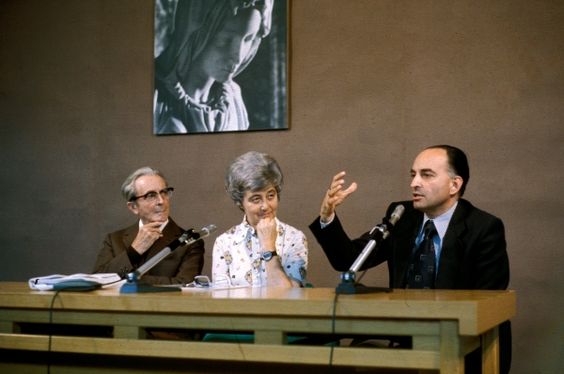
Jan 5, 2018 | Non categorizzato
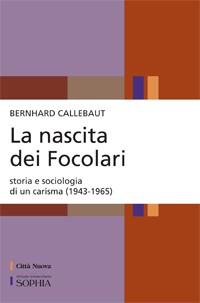 From a small city in northern Italy to five continents: an ample sociological dossier outlines the history of the Focolare, from its birth up to the definitive approval of the Church in 1965. It is a detailed reconstruction, encouraged by the founder of the Focolare herself already in the 1980s, and published for the first time in 2010 in a French edition, and lately translated into Italian by Città Nuova. Piero Coda, Rector of Sophia University Institute, introduces Callebaut’s study in the preface, with these words: “Up to today, there has never been an overall scientific approach to the history of the Focolare […] this current research for the first time constructs and institutes a historical and interpretative dossier of the important phenomenon represented by the Focolare Movement. […] The work is accurate, precise, and as thorough as can be […] exemplary and excellent under the historical profile.” Interviewed by Lorenzo Prezzi for settimananews.it, Bernhard Callebaut (Bruges, 1953) explained the sense of the book: ”I think that the purely testimonial narration, in which the person is strongly felt, is always valid. I think that a book like mine could cancel from my story the beneficial shock experienced in the reading of some pages of Lubich’s first (Meditations) pages that stimulated the actualisation of the messages they contained. On this premise, I think that at a second moment, we have to respect the need to understand, contextualize, link the phenomenon in itself to a previous story and gather some of the future prospects.” With studies in law, philosophy and sociology at the Catholic University of Lovanio, Bernhard Callebaut is currently a professor at Sophia University Institute in Florence, of which he is also Program Director of the Religions in a Global World research group.
From a small city in northern Italy to five continents: an ample sociological dossier outlines the history of the Focolare, from its birth up to the definitive approval of the Church in 1965. It is a detailed reconstruction, encouraged by the founder of the Focolare herself already in the 1980s, and published for the first time in 2010 in a French edition, and lately translated into Italian by Città Nuova. Piero Coda, Rector of Sophia University Institute, introduces Callebaut’s study in the preface, with these words: “Up to today, there has never been an overall scientific approach to the history of the Focolare […] this current research for the first time constructs and institutes a historical and interpretative dossier of the important phenomenon represented by the Focolare Movement. […] The work is accurate, precise, and as thorough as can be […] exemplary and excellent under the historical profile.” Interviewed by Lorenzo Prezzi for settimananews.it, Bernhard Callebaut (Bruges, 1953) explained the sense of the book: ”I think that the purely testimonial narration, in which the person is strongly felt, is always valid. I think that a book like mine could cancel from my story the beneficial shock experienced in the reading of some pages of Lubich’s first (Meditations) pages that stimulated the actualisation of the messages they contained. On this premise, I think that at a second moment, we have to respect the need to understand, contextualize, link the phenomenon in itself to a previous story and gather some of the future prospects.” With studies in law, philosophy and sociology at the Catholic University of Lovanio, Bernhard Callebaut is currently a professor at Sophia University Institute in Florence, of which he is also Program Director of the Religions in a Global World research group.  The first 20 years of the history of the Focolare are fathomed starting from the “enlightenments” of Chiara Lubich, which later became the core of her spirituality. “The charism is always granted to someone in particular, also here,” Callebaut explains. “Only after a certain time, Lubich realised that actually that gift had been bestowed on her and nobody else, at least, not in such a strong, limpid and overwhelming manner. But with time, she realized that also her first companions, who were sent elsewhere – first to Italy, then Europe and the continents – also became in some way, harbingers, multipliers of the charism, ’springs’ in turn. As of today – and in my book it is amply demonstrated – the core of Lubich’s charism is linked to having identified – as a gift – and later developed, and as never before in the two millenniums of Christian life, the meaning of that apex of the passion that constitutes the moment of that cry of abandonment of Man-God.” The history of the Focolare at the start of the story is made up also of a long and suffered wait for the formal recognition of the Church. “At the start of the 1950s the Holy Office examined the papers on the Focolare and initiated a series of meetings with the young founder. To put her and her followers to the test and measure their faithfulness to the Church, they asked her to take a step back, and no longer act as head of the Movement. Her followers would have never hidden who was really the soul of the Movement and there was no leadership crisis during those years, until Paul VI definitively resolved the issue. In 1965 Lubich signed her first letter as president of the Focolare. Today, after a certain time, we are beginning to see that behind her stature as a bearer of spirituality, there was also a rather unusual density of thought.” In more recent years, the charismatic intuition of the founder translates also into a series of concrete proposals as a contribution to the resolution of social and cultural issues. Some of these were Economy of Communion, “which actuates the preferential choice for the poor, and at the same time, values those who are able to contribute to economical life with the not common talent of entrepreneurship,” or the founding of the Sophia Institute, “as an interesting contribution to the debates and ordeals of contemporary thought.” Today, all the members of the Focolare, in some way bring ahead and multiply the charism of Chiara Lubich to fulfill the prayer of Jesus: ‘that all may be one’. And Callebaut concludes: “We need to continue working for some centuries more, it seems.”
The first 20 years of the history of the Focolare are fathomed starting from the “enlightenments” of Chiara Lubich, which later became the core of her spirituality. “The charism is always granted to someone in particular, also here,” Callebaut explains. “Only after a certain time, Lubich realised that actually that gift had been bestowed on her and nobody else, at least, not in such a strong, limpid and overwhelming manner. But with time, she realized that also her first companions, who were sent elsewhere – first to Italy, then Europe and the continents – also became in some way, harbingers, multipliers of the charism, ’springs’ in turn. As of today – and in my book it is amply demonstrated – the core of Lubich’s charism is linked to having identified – as a gift – and later developed, and as never before in the two millenniums of Christian life, the meaning of that apex of the passion that constitutes the moment of that cry of abandonment of Man-God.” The history of the Focolare at the start of the story is made up also of a long and suffered wait for the formal recognition of the Church. “At the start of the 1950s the Holy Office examined the papers on the Focolare and initiated a series of meetings with the young founder. To put her and her followers to the test and measure their faithfulness to the Church, they asked her to take a step back, and no longer act as head of the Movement. Her followers would have never hidden who was really the soul of the Movement and there was no leadership crisis during those years, until Paul VI definitively resolved the issue. In 1965 Lubich signed her first letter as president of the Focolare. Today, after a certain time, we are beginning to see that behind her stature as a bearer of spirituality, there was also a rather unusual density of thought.” In more recent years, the charismatic intuition of the founder translates also into a series of concrete proposals as a contribution to the resolution of social and cultural issues. Some of these were Economy of Communion, “which actuates the preferential choice for the poor, and at the same time, values those who are able to contribute to economical life with the not common talent of entrepreneurship,” or the founding of the Sophia Institute, “as an interesting contribution to the debates and ordeals of contemporary thought.” Today, all the members of the Focolare, in some way bring ahead and multiply the charism of Chiara Lubich to fulfill the prayer of Jesus: ‘that all may be one’. And Callebaut concludes: “We need to continue working for some centuries more, it seems.”
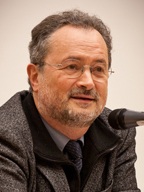 Callebaut Bernhard, Tradition, charisme et prophétie dans le Mouvement international des Focolari. Analyse sociologique, Paris, Nouvelle Cité, 2010, LXXXIII + 537 p. Italian translation La nascita dei Focolari. Storia e sociologia di un carisma (1943-1965), New City – Sophia, Rome 2017, p. 640. Entire interview by Lorenzo Prezzi
Callebaut Bernhard, Tradition, charisme et prophétie dans le Mouvement international des Focolari. Analyse sociologique, Paris, Nouvelle Cité, 2010, LXXXIII + 537 p. Italian translation La nascita dei Focolari. Storia e sociologia di un carisma (1943-1965), New City – Sophia, Rome 2017, p. 640. Entire interview by Lorenzo Prezzi
Jan 4, 2018 | Non categorizzato
The Wrinkles of Disenchantment “After years of marriage I realized that the man living beside me was no longer the one I had gone head over heals for when I was young. But there were the children and life went on. One day a friend said to me: ‘I see you aging badly. Instead of growing in love, the wrinkles of disenchantment have grown.’ It was true, in place of loving and giving, I had insisted on being just and fair. I tried to change my attitude towards my husband and I discovered that he needed me more than ever. Things are different now. There’s a greater love flowing among all of us. (M.F. – Polond) The Pharmacy “The employees of the pharmacy I worked at before, were fired. All of them, except me. The new owners, however, were motivated more by self interest than the good of the customers. The atmosphere also changed quickly. For several months I did what I could to improve the relationships among employees and with customers. It was time well spent, during which I learned to be more merciful. Then, dismissal was also proposed for me. In spite of that, I trusted in providence, which didn’t disappoint: Unexpectedly another pharmacy offered me the position of another employee who had retired.” (C.T. – Hungary) My “Difficult” Patients “For several years now I’ve been working in an institute specializing in patients who are in a vegetable state, usually as a result of an accident. The process of recuperating from a coma is very complex and not even sure to happen. To the relatives who ask if their loved one will wake up, I usually answer that we can’t foresee what will happen, and that only God knows the future. We workers are only the instruments in His hands. It’s impossible to stay indifferent in front of such tragedies. At times my Christian faith has wavered. But I think that these “difficult” patients play an important social role: they gather people together and bring out the capacity of giving in them.” (Elio – Italy) Resurrection “Drugs and prostitution… For two years I stood by my friend, Mario, through his Calvary. He had drifted away from God, but respected the way I lived the faith. When he wound up in the hospital, I visited him faithfully. He asked: ‘Why do you do it? I come from a completely different world from yours!’ During his stay he had time to reflect, and one day he said: ‘I tried to convince myself that God didn’t exist, because it would have forced me to change the way I was living. But now I can’t go on like this anymore. You’re the only person I’m truly happy to have ever met. I would so much like to live like you.’ I suggested that he try to put the Gospel into practice one sentence at a time. I tried to do the same and it worked! Since he trusted me, he agreed to give it a try. It was hard for him to change the meaning of “love” in his mind, which for him meant to prostitute himself for money. It was a difficult journey, filled with failures and new beginnings. One day he went to the Sacrament of Confession. Afterwards he was radiant. Then there was the accident in which he lost his life. God was waiting for him there. But he was already prepared..” (S.V. – Switzerland)
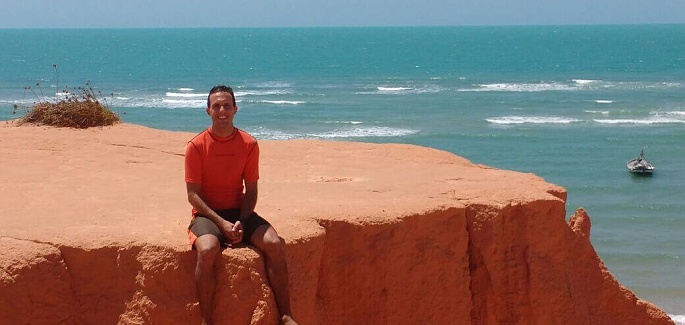
Jan 3, 2018 | Focolare Worldwide
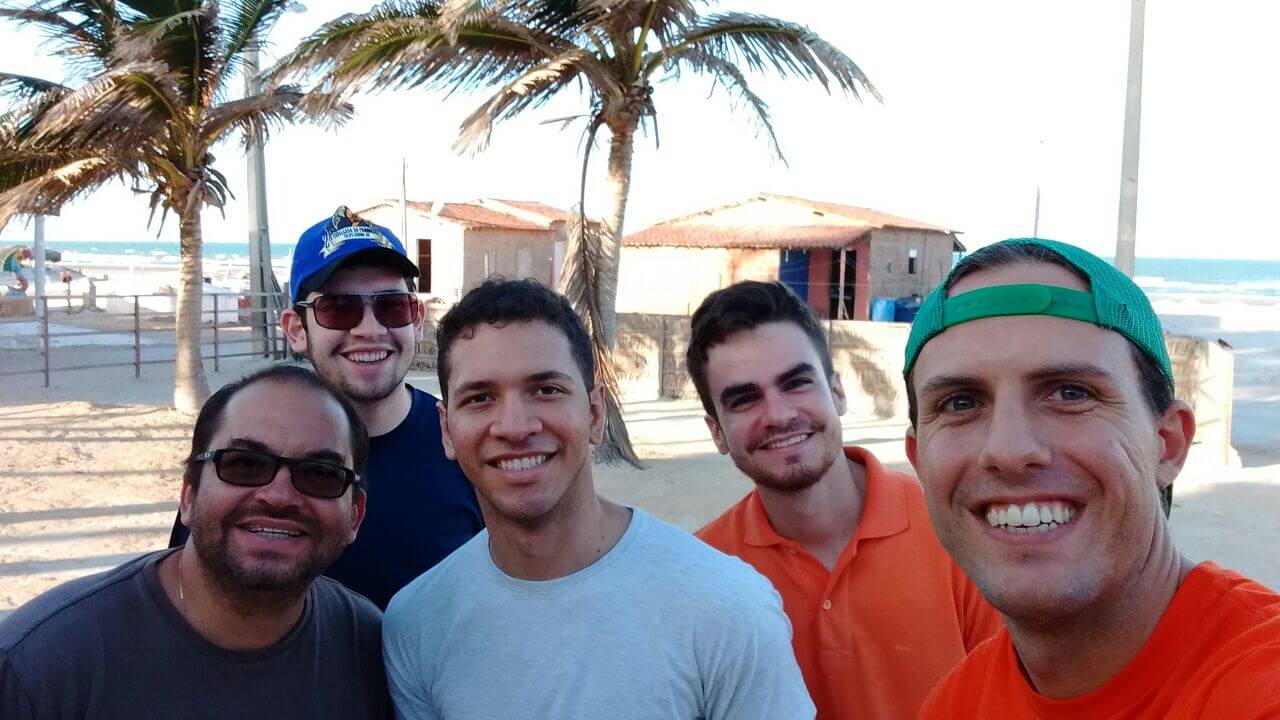 “Without giving it much thought, we had chosen the title together, “Building Bridges,” which could not have been more suitable: we couldn’t distinguish the youths of the wealthier districts from those of the poorer communities. The teams were composed of boys and girls from 10 to 18 altogether. The bigger kids took care of the smaller ones and the smaller ones enlivened the older ones. The participation of the poor communities did not imbue minimally an aspect of social assistance: all benefited from this interaction.” Renzo Megli, who had taken part right from the beginning in the organization of the Olympic games for kids, immediately laid down the foundations and success of the project, and described the preparatory activities with a passionate tone. “It seemed the winds were blowing against it. The idea of perfection and the memory of the “professional” or “semi-professional” sports fields of the previous editions deterred out spirits, blocked our minds, and saddened our thoughts. On the contrary, I was happy because of all the doors that closed on us and the slow and tiring change of direction: the only possibility that remained was to bring the Olympic games to the CEU, the Condominio Espiritual Uirapuru. We started to work on the project, determined to make the event a reality. But the conflicts remained evident; the compasses were still disoriented by old magnetic fields. Stop! We had to choose: shall we go ahead as one or stop? Would it be better to achieve something less perfect, but together, or something perfect in disunity? These will be different types of Olympic games, less professional, and perhaps less “trendy.” But perhaps it is precisely the breeze of the Spirit that is leading us to do something new, and different. We decided to go towards a common north. Even those who first were contrary have started to row in the same direction. Only then did I remember a conversation I had much earlier on with a focolarino who is older than me. He had given me this advice: “To lose an idea you must first possess it, and possibly, it must be really yours, as if it were your child, flesh of your flesh. Imagine a bottle of champagne: it must be full before you can remove its cap and let its bubbles flow.” That was how I felt, “father” to my idea, but ready to lose it. Each of us, upon “losing” our own idea, have become together, “parents” of a better idea, which has been polished along the way.
“Without giving it much thought, we had chosen the title together, “Building Bridges,” which could not have been more suitable: we couldn’t distinguish the youths of the wealthier districts from those of the poorer communities. The teams were composed of boys and girls from 10 to 18 altogether. The bigger kids took care of the smaller ones and the smaller ones enlivened the older ones. The participation of the poor communities did not imbue minimally an aspect of social assistance: all benefited from this interaction.” Renzo Megli, who had taken part right from the beginning in the organization of the Olympic games for kids, immediately laid down the foundations and success of the project, and described the preparatory activities with a passionate tone. “It seemed the winds were blowing against it. The idea of perfection and the memory of the “professional” or “semi-professional” sports fields of the previous editions deterred out spirits, blocked our minds, and saddened our thoughts. On the contrary, I was happy because of all the doors that closed on us and the slow and tiring change of direction: the only possibility that remained was to bring the Olympic games to the CEU, the Condominio Espiritual Uirapuru. We started to work on the project, determined to make the event a reality. But the conflicts remained evident; the compasses were still disoriented by old magnetic fields. Stop! We had to choose: shall we go ahead as one or stop? Would it be better to achieve something less perfect, but together, or something perfect in disunity? These will be different types of Olympic games, less professional, and perhaps less “trendy.” But perhaps it is precisely the breeze of the Spirit that is leading us to do something new, and different. We decided to go towards a common north. Even those who first were contrary have started to row in the same direction. Only then did I remember a conversation I had much earlier on with a focolarino who is older than me. He had given me this advice: “To lose an idea you must first possess it, and possibly, it must be really yours, as if it were your child, flesh of your flesh. Imagine a bottle of champagne: it must be full before you can remove its cap and let its bubbles flow.” That was how I felt, “father” to my idea, but ready to lose it. Each of us, upon “losing” our own idea, have become together, “parents” of a better idea, which has been polished along the way.  Renzo continued his story: “The CEU Director has promised space and the equipment. All the work we had performed up to then was based on this available place. But then the cancellation arrived: we could no longer use that facility. The “dynamics of losing” and of placing in God all our worries has become almost like a daily event that after a few moments of dismay we took this adversity as a clear sign of the spirit. Inviting the children of the CEU community was the most important thing, but time was flying and the enrollments proceeded slowly, leaving us with a lump in the throat: will we reach a minimum number of participants? We decided to open the enrollments also to those who cannot participate due to economic difficulties. We wanted to entrust ourselves to Providence. Many supporters popped up, and all the expenses, even the unforeseen, were covered. The smile of the numerous CEU children became the icon of our Olympics. An extraordinary joy was evident in all, animators, parents, and players. A child of one of the CEU communities said: “I found my father here.” This was a bigger boy who really had shown him love. Among the participants were also the girls of the Lar Santa Mônica community that hosts adolescent victims of domestic sexual abuse. They had become a bit surly and wanted to go home immediately. Instead they participated up to the end. We saw them leave happy. This transformation was one of the most beautiful victories of our Olympics.”
Renzo continued his story: “The CEU Director has promised space and the equipment. All the work we had performed up to then was based on this available place. But then the cancellation arrived: we could no longer use that facility. The “dynamics of losing” and of placing in God all our worries has become almost like a daily event that after a few moments of dismay we took this adversity as a clear sign of the spirit. Inviting the children of the CEU community was the most important thing, but time was flying and the enrollments proceeded slowly, leaving us with a lump in the throat: will we reach a minimum number of participants? We decided to open the enrollments also to those who cannot participate due to economic difficulties. We wanted to entrust ourselves to Providence. Many supporters popped up, and all the expenses, even the unforeseen, were covered. The smile of the numerous CEU children became the icon of our Olympics. An extraordinary joy was evident in all, animators, parents, and players. A child of one of the CEU communities said: “I found my father here.” This was a bigger boy who really had shown him love. Among the participants were also the girls of the Lar Santa Mônica community that hosts adolescent victims of domestic sexual abuse. They had become a bit surly and wanted to go home immediately. Instead they participated up to the end. We saw them leave happy. This transformation was one of the most beautiful victories of our Olympics.”

Jan 2, 2018 | Non categorizzato
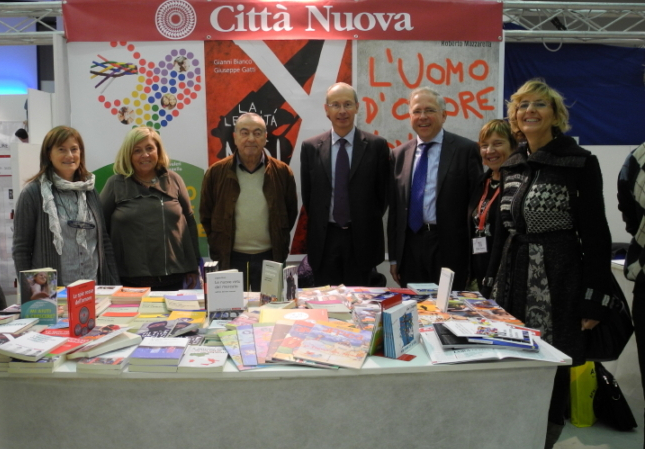 Pisa is known all over the world for its Square of Miracles, UNESCO World Heritage Centre, where the Leaning Tower of Pizza is located. Every year since 2003 the Pisa Book Festival is held in that Tuscan city at the national book show which gathers publishers, writers, translators, illustrators, Italian and foreign artists. It is an ideal setting for sharing ideas, innovative proposals, quality books and magazines, but also writing workshops, seminars, readings and shows. Città Nuova was there again this year with the support of the local Focolare community. “This is fifth year that we have taken part in Pisabook, a truly special edition because of the variety of presentations and the people involved,” explain Rita and Francesco. “For the first time we got to run the workshop in the Junior section where we worked and played with ‘BIG’ and ‘feelings’.”
Pisa is known all over the world for its Square of Miracles, UNESCO World Heritage Centre, where the Leaning Tower of Pizza is located. Every year since 2003 the Pisa Book Festival is held in that Tuscan city at the national book show which gathers publishers, writers, translators, illustrators, Italian and foreign artists. It is an ideal setting for sharing ideas, innovative proposals, quality books and magazines, but also writing workshops, seminars, readings and shows. Città Nuova was there again this year with the support of the local Focolare community. “This is fifth year that we have taken part in Pisabook, a truly special edition because of the variety of presentations and the people involved,” explain Rita and Francesco. “For the first time we got to run the workshop in the Junior section where we worked and played with ‘BIG’ and ‘feelings’.” 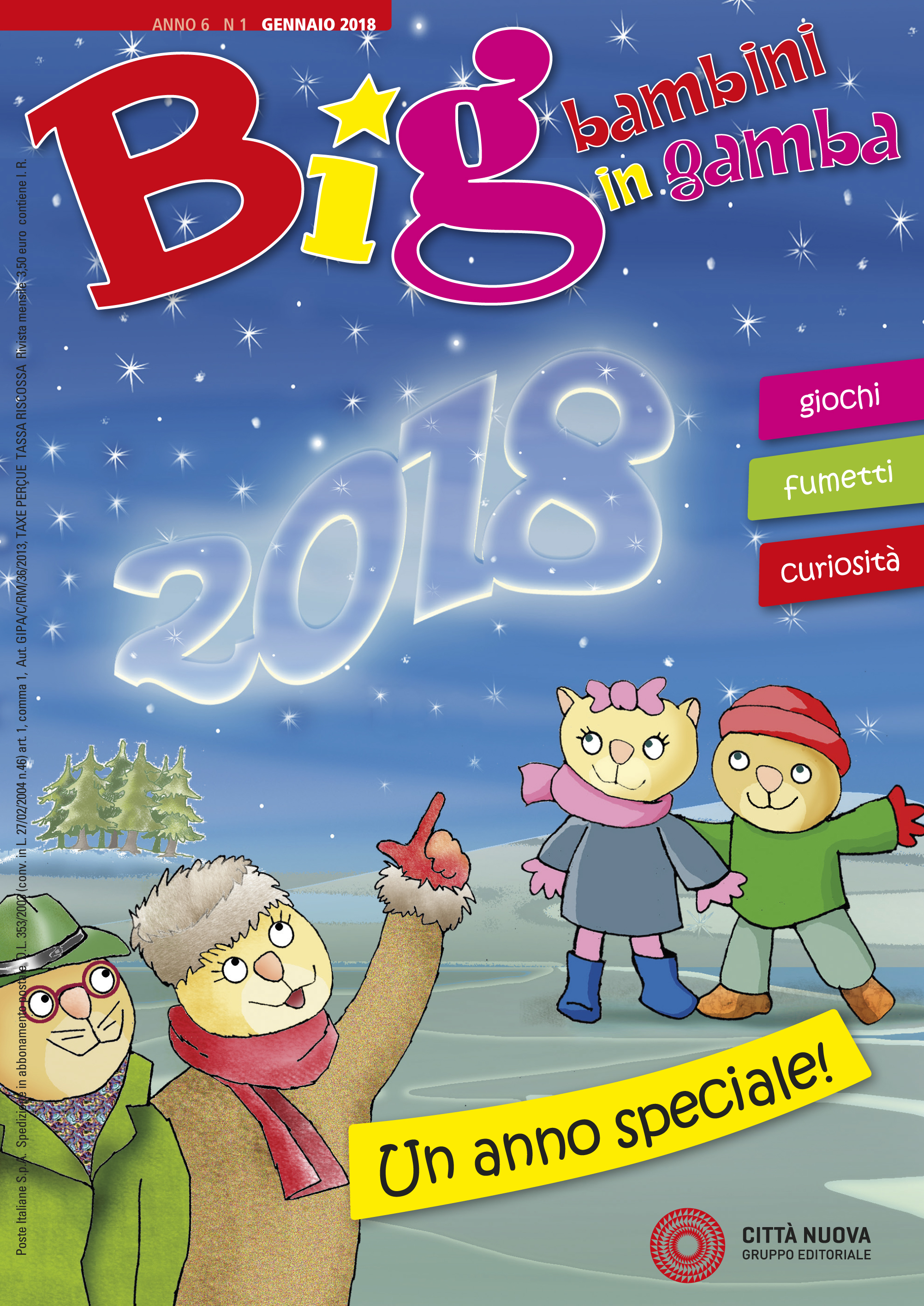 BIG is an Italian monthly children magazine published by Città Nuova. Among the new offerings was a kit that would help teachers discuss the topic of feelings, such as fear, disgust, anger, sadness and happines with children up to ten years old. “During the festival we visited a school on the outskirts of the city where it would be possible to accompany the children in Pisabook’s main office. They were all invited to help promote BIG and now the teachers want to subscribe to the magazine.” Among Città Nuova’s offerings in the Hall was an autobiography of Salvatore Striano, a story of redemption and transformation – from a drug dealer in a suburban criminal district of southern Italy to a writer and actor. In between, ten years of jail time in Madrid and Rome. It is story of salvation through books and the theatre, but mostly through meeting the right people at the right time. In his autobiographic novel, Giù le maschere, (Città Nuova, 2017), a group of disadvantaged and rebellious teenagers from a halfway home discovers a love for theatre and finds on the stage, a road to salvation and redemption. It is a deep story that teaches to look at life, every life, especially the lives of vulnerable youth, with eyes of hope. “During the three presentations of the book and the breaks,” Rita and Francesco explain, “a feeling was created among everyone: Striano opened up and talked about his troubled life. He was particularly impressed by the young people who were there, whom he invited as personal guests to his show in Naples. At the end he remarked: If my friends in prison could see your eyes, your smiles … they would change their lives.” The author had a deep discussion with the teens from the school who had prepared for the event by reading his book. The discussion seemed to have “removed the distances, making everyone feel like they were at home in their living-room.” Now the students are involved in a school project inside several prisons. “Seeing so many people moving to the booth and not going away made Salvatore say that he had never had a similar experience before and that he wants to write more books with Città Nuova. “Lucia Della Porta, creator and director of Pisabook, couldn’t stop thanking us for our contribution to the success of the event! But we thanked her for putting so much trust in us. Many people passed by our booth, we made many contacts and tried to give our testimony. It was also a financial success.” The local Focolare community concluded: Città Nuova is even more ours.
BIG is an Italian monthly children magazine published by Città Nuova. Among the new offerings was a kit that would help teachers discuss the topic of feelings, such as fear, disgust, anger, sadness and happines with children up to ten years old. “During the festival we visited a school on the outskirts of the city where it would be possible to accompany the children in Pisabook’s main office. They were all invited to help promote BIG and now the teachers want to subscribe to the magazine.” Among Città Nuova’s offerings in the Hall was an autobiography of Salvatore Striano, a story of redemption and transformation – from a drug dealer in a suburban criminal district of southern Italy to a writer and actor. In between, ten years of jail time in Madrid and Rome. It is story of salvation through books and the theatre, but mostly through meeting the right people at the right time. In his autobiographic novel, Giù le maschere, (Città Nuova, 2017), a group of disadvantaged and rebellious teenagers from a halfway home discovers a love for theatre and finds on the stage, a road to salvation and redemption. It is a deep story that teaches to look at life, every life, especially the lives of vulnerable youth, with eyes of hope. “During the three presentations of the book and the breaks,” Rita and Francesco explain, “a feeling was created among everyone: Striano opened up and talked about his troubled life. He was particularly impressed by the young people who were there, whom he invited as personal guests to his show in Naples. At the end he remarked: If my friends in prison could see your eyes, your smiles … they would change their lives.” The author had a deep discussion with the teens from the school who had prepared for the event by reading his book. The discussion seemed to have “removed the distances, making everyone feel like they were at home in their living-room.” Now the students are involved in a school project inside several prisons. “Seeing so many people moving to the booth and not going away made Salvatore say that he had never had a similar experience before and that he wants to write more books with Città Nuova. “Lucia Della Porta, creator and director of Pisabook, couldn’t stop thanking us for our contribution to the success of the event! But we thanked her for putting so much trust in us. Many people passed by our booth, we made many contacts and tried to give our testimony. It was also a financial success.” The local Focolare community concluded: Città Nuova is even more ours.
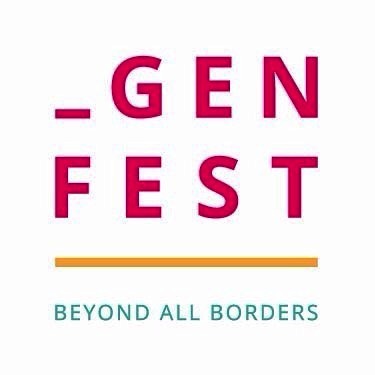
Jan 1, 2018 | Non categorizzato
 The title BEYOND ALL BORDERS intends to highlight the boundaries that need to be overcome at personal and social levels. It was chosen with the purpose of opening the minds and hearts of the participants in the Genfest. This eleventh edition aims to inspire participants to feel capable of building a happier and a united world. To breathe, love, work and live with concern for everyone. This is why the Genfest values artistic manifestations, music, dances, expositions, forums, etc., to enable everyone to think differently and to transform life into something more beautiful.
The title BEYOND ALL BORDERS intends to highlight the boundaries that need to be overcome at personal and social levels. It was chosen with the purpose of opening the minds and hearts of the participants in the Genfest. This eleventh edition aims to inspire participants to feel capable of building a happier and a united world. To breathe, love, work and live with concern for everyone. This is why the Genfest values artistic manifestations, music, dances, expositions, forums, etc., to enable everyone to think differently and to transform life into something more beautiful.
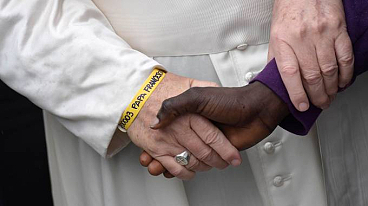
Jan 1, 2018 | Non categorizzato
 “Men and women, children, young people and the elderly seek a place where they can live in peace. To find it, many of them are willing to risk their lives on a journey that in most cases is long and dangerous, to undergo suffering and hardship, to come face to face with barbed wire and walls that are raised to keep them far from their goal.” On the first day of the New Year, Pope Francis’s greetings are extended especially to the 250 million immigrants, 22 and a half million of whom are refugees. His message is filled with proposals, which are offered to the international community for its analysis and study. Why are there so many refugees and immigrants in the world? Francis recalls: “Saint John Paul II pointed to the growing number of refugees among the consequences of the interminable and horrendous series of conflicts, genocide and “ethnic cleansing” that marked the twentieth century. The new century wasn’t a real turning point. Armed conflicts and other forms of organized violence continue to provoke movements of populations within national confines and beyond. But people migrate for other reasons as well; primarily for a better life.” Those who foment fear in the face of global migrations – perhaps for political reasons rather than building peace – sow violence. “Instead,” the Pope says, “I invite you to see them as opportunities for building a future of peace.” Migrants and refugees never come empty-handed. They “come loaded with courage, abilities, energy and aspirations besides the treasures of their own cultures. In this way they enrich the life of the nations that receive them.” In his usual style, Francis doesn’t limit himself to a list of generic “guidelines,” but presents a complex strategy, comprised of four actions: receive, protect, promote and integrate. Accept primarily means “expand ways of legal entry, do not turn them back to places where persecution and violence awaits them, and balance concern for national security with the protection of basic human fundamental rights.” Regarding protection, Francis recommends that, in respect for the dignity of the person, migrants and refugees should be allowed freedom of movement, opportunities for employment and, in particular, the prevention of exploitation of women and children, “the ones who are most exposed to the risks and abuses.” Promotion stands for the promotion and support of “integral human development.” Among the many tools, he underscores “the importance of ensuring access to education for children and young people at every level of instruction. In that way they will not only cultivate and bring to fruition their own skills, but will also be better able to reach out to others and cultivate a spirit of dialogue instead of evasiveness or confrontation.” Integration is not synonymous with assimilation, the complete sacrifice of one roots and loss of identity; on the contrary, it represents “allowing the refugee and immigrant to take full share in the life of the society that receives them, in a dynamic of mutual enrichment and fruitful collaboration in the promotion of the integral human development of the local communities.” The message contains a clear call to the leaders of States of the whole world. Pope Francis looks forward in 2018, to the global double accord in favour of secure, orderly and lawful migrations that ensure the protection of refugees, inspired “by compassion, long=sightedness and courage, in order to seize every opportunity to advance the construction of peace. Only in this way will the necessary realism of international politics not become surrender to cynicism and global indifference.” Recalling the words of St John Paul II, Pope Francis intends to entrust a message of new hope to the world, even in difficult times: “If the ‘dream’ of a world at peace is shared by many, and the contribution of migrants and refugees is acknowledged, the human race can more and more become a common home.” Read message
“Men and women, children, young people and the elderly seek a place where they can live in peace. To find it, many of them are willing to risk their lives on a journey that in most cases is long and dangerous, to undergo suffering and hardship, to come face to face with barbed wire and walls that are raised to keep them far from their goal.” On the first day of the New Year, Pope Francis’s greetings are extended especially to the 250 million immigrants, 22 and a half million of whom are refugees. His message is filled with proposals, which are offered to the international community for its analysis and study. Why are there so many refugees and immigrants in the world? Francis recalls: “Saint John Paul II pointed to the growing number of refugees among the consequences of the interminable and horrendous series of conflicts, genocide and “ethnic cleansing” that marked the twentieth century. The new century wasn’t a real turning point. Armed conflicts and other forms of organized violence continue to provoke movements of populations within national confines and beyond. But people migrate for other reasons as well; primarily for a better life.” Those who foment fear in the face of global migrations – perhaps for political reasons rather than building peace – sow violence. “Instead,” the Pope says, “I invite you to see them as opportunities for building a future of peace.” Migrants and refugees never come empty-handed. They “come loaded with courage, abilities, energy and aspirations besides the treasures of their own cultures. In this way they enrich the life of the nations that receive them.” In his usual style, Francis doesn’t limit himself to a list of generic “guidelines,” but presents a complex strategy, comprised of four actions: receive, protect, promote and integrate. Accept primarily means “expand ways of legal entry, do not turn them back to places where persecution and violence awaits them, and balance concern for national security with the protection of basic human fundamental rights.” Regarding protection, Francis recommends that, in respect for the dignity of the person, migrants and refugees should be allowed freedom of movement, opportunities for employment and, in particular, the prevention of exploitation of women and children, “the ones who are most exposed to the risks and abuses.” Promotion stands for the promotion and support of “integral human development.” Among the many tools, he underscores “the importance of ensuring access to education for children and young people at every level of instruction. In that way they will not only cultivate and bring to fruition their own skills, but will also be better able to reach out to others and cultivate a spirit of dialogue instead of evasiveness or confrontation.” Integration is not synonymous with assimilation, the complete sacrifice of one roots and loss of identity; on the contrary, it represents “allowing the refugee and immigrant to take full share in the life of the society that receives them, in a dynamic of mutual enrichment and fruitful collaboration in the promotion of the integral human development of the local communities.” The message contains a clear call to the leaders of States of the whole world. Pope Francis looks forward in 2018, to the global double accord in favour of secure, orderly and lawful migrations that ensure the protection of refugees, inspired “by compassion, long=sightedness and courage, in order to seize every opportunity to advance the construction of peace. Only in this way will the necessary realism of international politics not become surrender to cynicism and global indifference.” Recalling the words of St John Paul II, Pope Francis intends to entrust a message of new hope to the world, even in difficult times: “If the ‘dream’ of a world at peace is shared by many, and the contribution of migrants and refugees is acknowledged, the human race can more and more become a common home.” Read message

Dec 30, 2017 | Non categorizzato
 It seems to me that in order to give back to the family its true countenance, in order to restore its splendour, instead of focusing on discussions and directives (…) it’s worth pondering on that luminous and universal example that Eternal Wisdom devised: the family of Nazareth. All present and future families the world over can look to it as a model. And not just families: the individual components of this model can inspire us to know what behaviours and attitudes we should adopt, the relationships and virtues we should cultivate. Every man on earth who is husband and father can always find in Joseph, the Spouse of Mary, the considered father of Jesus, a light, an encouragement, a source of inspiration. In him, one can emulate the same faithfulness in all trials, heroic chastity, strength, silent activity, respect, veneration, protection for the mother of his children, participation in family concerns … And every woman, who is wife and mother, can discover in Mary her own potential, equality with man and her own identity. She can see fulfilled in the Bride of Joseph the desire to also be a protagonist; she can understand how to go beyond the family circle to spread, for the good of many, the riches that are her own: self-sacrifice, the inner strength that gives her confidence, the religious life that distinguishes her from others, the innate need to rise above her situation and to elevate others, radiating light, purity and beauty. Similarly the children will find in Jesus, the son of Mary and Joseph, who together compose a marvellous unity, the two troubling challenges: the need to establish themselves as a generation which can launch a new chapter in history, and the desire to find refuge in their loved ones through love and in obedience. Yes, may the Holy Family, the jewel of humanity it is associated with, which reflects the life of the Trinity, where love generates one God, be before us today, may it stay with us all (…) for the good of the family in the world, of the family in the Church and for the glory of God. From: Chiara Lubich – Messagge to FamilyFest 1981
It seems to me that in order to give back to the family its true countenance, in order to restore its splendour, instead of focusing on discussions and directives (…) it’s worth pondering on that luminous and universal example that Eternal Wisdom devised: the family of Nazareth. All present and future families the world over can look to it as a model. And not just families: the individual components of this model can inspire us to know what behaviours and attitudes we should adopt, the relationships and virtues we should cultivate. Every man on earth who is husband and father can always find in Joseph, the Spouse of Mary, the considered father of Jesus, a light, an encouragement, a source of inspiration. In him, one can emulate the same faithfulness in all trials, heroic chastity, strength, silent activity, respect, veneration, protection for the mother of his children, participation in family concerns … And every woman, who is wife and mother, can discover in Mary her own potential, equality with man and her own identity. She can see fulfilled in the Bride of Joseph the desire to also be a protagonist; she can understand how to go beyond the family circle to spread, for the good of many, the riches that are her own: self-sacrifice, the inner strength that gives her confidence, the religious life that distinguishes her from others, the innate need to rise above her situation and to elevate others, radiating light, purity and beauty. Similarly the children will find in Jesus, the son of Mary and Joseph, who together compose a marvellous unity, the two troubling challenges: the need to establish themselves as a generation which can launch a new chapter in history, and the desire to find refuge in their loved ones through love and in obedience. Yes, may the Holy Family, the jewel of humanity it is associated with, which reflects the life of the Trinity, where love generates one God, be before us today, may it stay with us all (…) for the good of the family in the world, of the family in the Church and for the glory of God. From: Chiara Lubich – Messagge to FamilyFest 1981
Dec 29, 2017 | Focolare Worldwide
“If it hadn’t been for a group of friends – teachers at a school for street children – I would never have known about this side of my city: the poor. And yet, Saigon – or as they now call it – Ho Chi Minh City, also has it: poverty, disadvantage and suffering. On Christmas and all the big holidays some people like to go out for walks, perhaps around some of the famous breweries, to look for some poor, or better, very poor families who live in stinking rat-infested slums. I thought I had seen all the poverty in Thailand among the Karen refugees and migrants from the mountains in the North, as well as along the dirty canals of Bangkok. But what I saw today in Saigon, in the ‘Milan of Vietnam,’ I had never even imagined. Small rooms with twelve people living inside them, along with three dogs perhaps. I become so nauseous in such places that I could hardly force myself to stay there. But then, the faces of the children lit up, the intense gazes of the mothers looked at us and seemed to say ‘thank you’ when we placed in front of them a sack with 5kg of rice in it. That gaze was all the thanks we needed, along with a will to live and the joy to dry ourselves off after such a drenching rain. And then there are Nativity Scenes in Saigon and Christmas stars over the homes of many families. Some alleyways are lit up, which gives a bit of warmth to the city which is by no means cold, impersonal and indifferent – nor even atheist. You notice the stars and Nativity Scenes, because they’re everywhere and appear on many street corners: they take you by surprise. The ones I found most striking were the ones in the public markets, at night, almost covered under the day’s trash; or else, the ones that were lost along the outskirts of the market, but illuminated by two huge Manger Scenes set up right on the road. Then, on the tops of the houses, at night, there are the fluorescent stars that blink off and on. Returning home tonight, after the visit to the poor, I looked at this scene that had filled me with such a feeling of gratitude: even though far from home, I wasn’t at all missing the real sense of Christmas. Last year Pope Francis said that ‘Christmas is the feast day of weakness, because it celebrates a child, the symbol of fragility, smallness, humility and love.’ Today I understood those words a little more. This night that I now leave behind because it’s already morning, was illumined by the love that I saw among the people that went to help, to lift up, to show their closeness with those who suffer. Once again, the cultural darkness in which we live is illuminated by these living Nativity Scenes, by people who have made that Boy the reason for their lives. And I realized that the real message of Christmas hasn’t died. It’s message of love, tenderness and understanding is alive and I saw it. It was all there in that gesture of taking a small disabled three-year-old and hugging him as close as possible. And that little boy let himself be raised up by that face that unknown face. All the technology of present and future robots, the commercial frontier that everyone is talking about in Asia, will never be able do this miracle: love. Because love is free. Love is never a duty, and nobody can program it or order it. It’s a gift that comes from inside. I saw faces brighten and believe that life, tomorrow morning, will go forward and be more beautiful than yesterday. I don’t miss my Europe this Christmas. Because wherever there is love, there is also my home. Saigon is also my home.”
Dec 28, 2017 | Non categorizzato, Word of
The word of life for this month comes from a verse in the Song of Moses, part of the Old Testament in which the Israelites exalt God’s intervention in their history. The song proclaims God’s decisive action for the salvation of this people, on the long journey from their liberation from slavery in Egypt to their arrival in the Promised Land. Although the Israelites encountered difficulties and sufferings on the way, this all happened under the steadfast guidance of God and through the collaboration of men like Moses and Joshua, who put themselves at the service of God’s plan of salvation. “Your right hand, O Lord, glorious in power.” When we think of power, we can easily associate it with the power of might that is often the cause of oppression and conflict among people and nations. Instead, God’s word reveals to us that true power is love, as was manifested in Jesus. He went through all human experience, until death, to open for us the path to freedom and to our encounter with the Father. Thanks to him, God’s powerful love for humankind was revealed. “Your right hand, O Lord, glorious in power.” If we look at ourselves, we have to admit frankly that we are limited. Human fragility, in all its aspects — physical, moral, psychological and social — is a reality we cannot deny. However, it is actually there, in our limitations, that we can experience God’s love. In fact, he wants happiness for all people, who are his children. He is always ready to help those who put themselves humbly in his hands for the sake of the common good, peace and fraternity. This text is a wise choice for this month’s celebration of the Week of Prayer for Christian Unity, considering how much suffering we have inflicted on one another down through the centuries, creating divisions and sowing suspicion, dividing communities and families. “Your right hand, O Lord, glorious in power.” Through prayer, we need to ask the grace of unity, as a gift from God. At the same time, we can build bridges by offering ourselves as instruments of God’s love. During an event held at the World Council of Churches in Geneva in 2002, Chiara Lubich was invited to share her thoughts and experience. “Dialogue is carried out first by putting ourselves on the same level as our partner, whoever he or she may be,” she said. “Then we listen to our dialogue partner, being completely empty of ourselves … This enables us to receive the other person within ourselves and to understand him or her … Because they have been listened to with love, they are ready to listen to what we have to say.” This month, let us take advantage of our day-to-day contacts, to deepen or reestablish relationships of esteem and friendship with individuals, families or groups who belong to other Christian churches. Moreover, why not extend our prayer and action to the divisions within our own ecclesial community, or to those in politics, in civil society or in families? We too can witness with joy to “your right hand, O Lord, glorious in power.” Letizia Magri
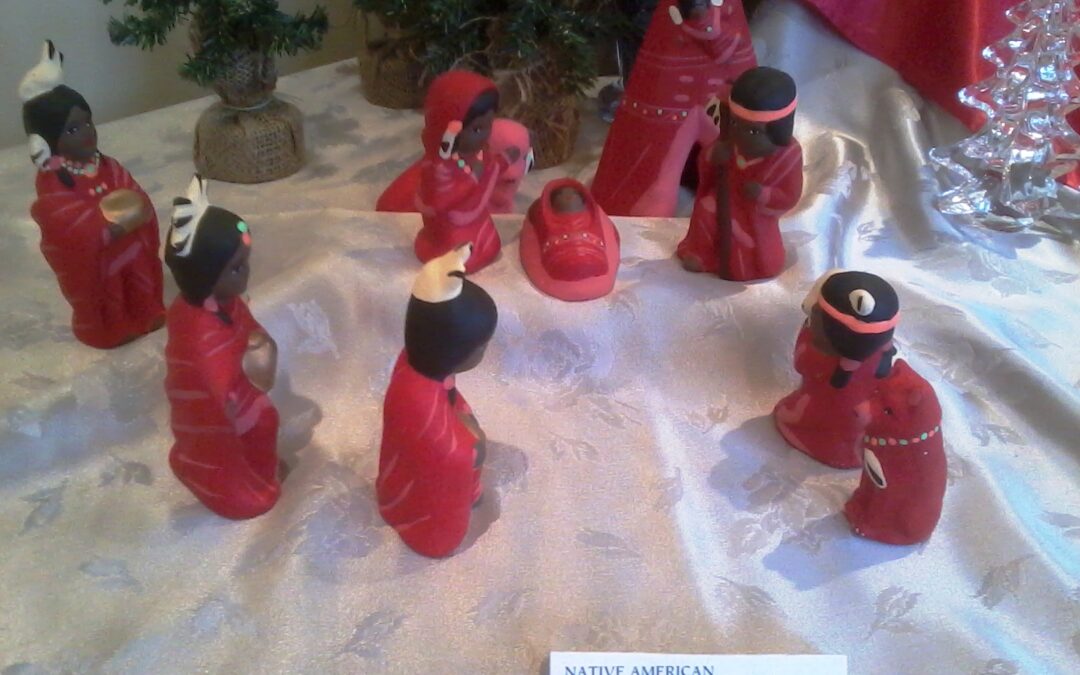
Dec 28, 2017 | Non categorizzato
In the summer of 1962, Chiara Lubich had the first insight of what the “towns” or the “permanent Mariapolis” would be today. “It was in Einsedeln (Switzerland) that I saw, upon viewing from the top of a hill, the basilica and its surroundings, that in the Movement there would be a city one day, which would not be formed by an abbey or hotels, but by houses, work places, and schools like a common city,” Chiara wrote in her diary (March 1967).
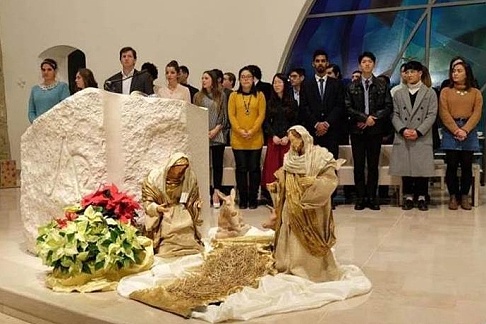
Christmas in Loppiano
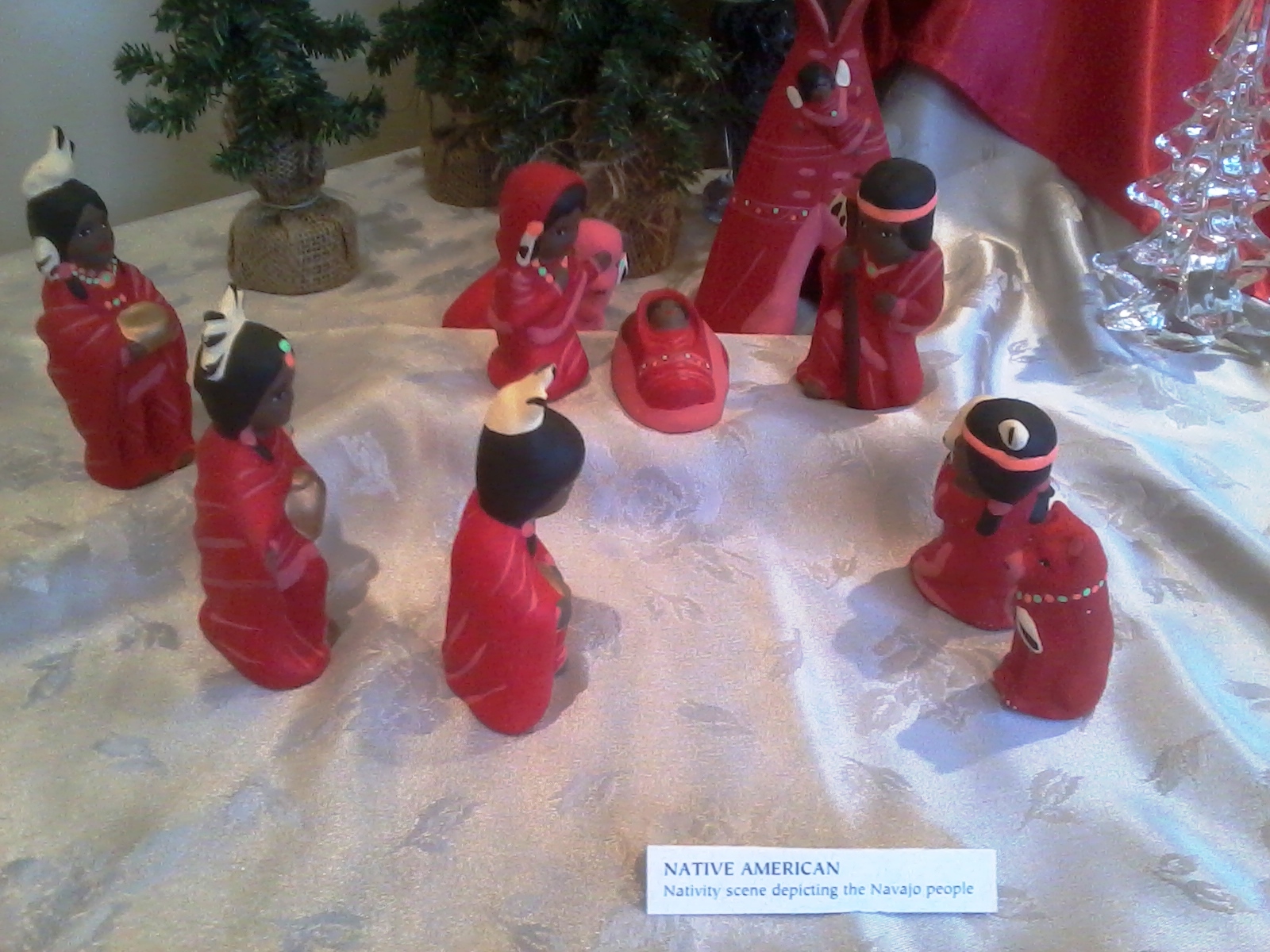
Crib display at Mariapolis Luminosa
Dec 27, 2017 | Non categorizzato
Dec 26, 2017 | Non categorizzato
“Christian doesn’t have any religious meaning in my family, even though we always eat together on the evening of December 24th. But this year everything will be different for me. I celebrated my first real Christmas! “Giselle, I’ll introduce you to some girls who live the Gospel in Santiago,” a friend told me last month. Through them – the Gen – I got to know Jesus and that encounter changed my life. I even received a Christmas Crib as a gift and it became a part of my house for the first time. I knew I still would be able to celebrate Christmas as I would have liked, because most of my parents still think like before. But, this year, I wanted to do something different. I spent Christmas Eve preparing supper like every year, but unlike other years I went to Mass with some friends after supper. In spite of all the cooking and preparing, nobody showed up for supper. At first I felt really bad and even thought they had perhaps done it on purpose to make fun of me. But then a thought came to me: What is important for me don’t necessarily have to be important to others; on the contrary, it was obvious that it wasn’t! How much I would liked to share with my relatives the joy of Jesus’s birth! Before supper, I silently recited Grace before meals. It was my first Christmas supper. Then I went to Mass. I thought perhaps they weren’t ready yet, and perhaps they never would be. But I wanted to do all I could so that they might also receive the gift I received, which changed my life: getting to know Jesus. It’s what I want the most for the people I love. One time at home, when everybody had already gone to bed, I wrapped some small presents, just little things, to surprise my relatives. I placed them under the tree with a note that said: “Happy Christmas! Follow the arrow and find your present.” My father woke up at five thirty, my father was the first to wake up and notice the note. So he woke up my mother. Around nine they woke me up, and my very strong brother carried me in his arms to the living room. I couldn’t wait any longer from the joy to wrap a present for me too! I was very touched. It was beautiful to see what Love does, even in those who don’t how to call it by name. Christmas still doesn’t have any meaning for my family, but they felt all the love I left for them under the tree. And there’s no one who can resist against Love.”
Dec 25, 2017 | Non categorizzato
It was in the plans of Providence that the Word become flesh, that a word, the Word, be written on earth in flesh and blood; and this Word needed a background. Out of love for us, the heavenly harmonies longed to transfer their peerless concert within our tents; and so they needed a silence. The Protagonist of all humanity, who gave meaning to centuries past, and enlightened and drew after him the centuries to come, had to appear on this world’s stage, but he needed a white background to make him alone stand out. The greatest design that Love-God could invent, had to be drawn, majestic and divine and all the colours of virtue had to be found gathered in a heart ready to serve him. This wondrous shade that contains the sun, losing and finding itself therein; this white background almost an immense abyss that contains the Word which is Christ immersing itself in him, light in the Light; this lofty silence that is silent no more, for within it sing the Word’s divine harmonies and in him becomes the note of notes, almost setting the tone for heaven’s endless song; this majestic scene, as fair as nature, summarising the beauty lavished by the Creator throughout the universe, this little universe for the Son of God, which is seen no more because it yields its interests and its parts to the One who was to come, and has come, for what he had to do, and did; this rainbow of virtue that says “peace” to the whole world because Peace it has given the world; this creature, first thought of in the mysterious depths of the Trinity, and given to us, was Mary. Cf Chiara Lubich Mary, The Transparency of God, New City London 2003 p11-13
Dec 23, 2017 | Non categorizzato
A child who gets lost winds up in a place that’s not home. Yes, at Christmas time God got lost – not only like a boy child, but as a child – in a place where he was no longer at home. He didn’t remain within the enclosed happiness of Heaven, or within the confines of our devotional space. He got lost for the little ones and the poor, for those who are sick and in mourning, for sinners, for those we consider far from God, those we think have nothing to do with God. God got lost right where the prodigal son got lost – far from his father’s home – so he could return to the Father in him and with him. God got lost as a child not by mistake, but by the most divine gesture God could make. God is the God of all, or else he isn’t God. God is the God of the little ones and the ones far off, or else he isn’t God. “Let yourself be found where you, God, were lost as a child. Yes, let us become a child in whom you lose yourself for others, for everybody!” Klaus Hemmerle. La luce dentro le cose (Rome: Città Nuova, 1998) 395.
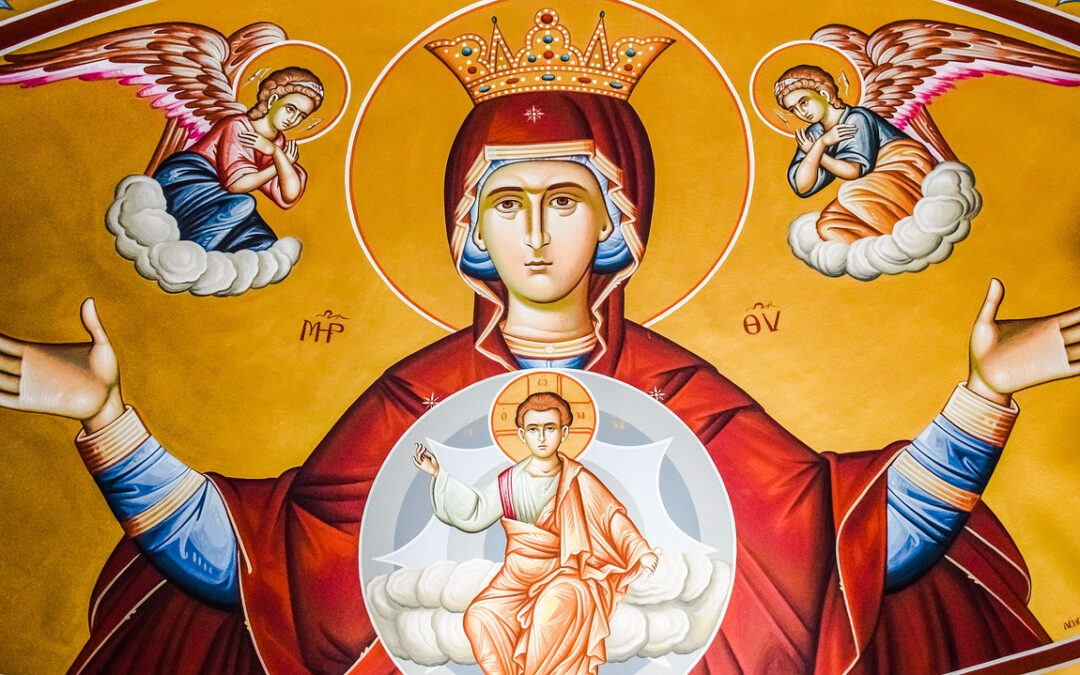
Dec 22, 2017 | Non categorizzato
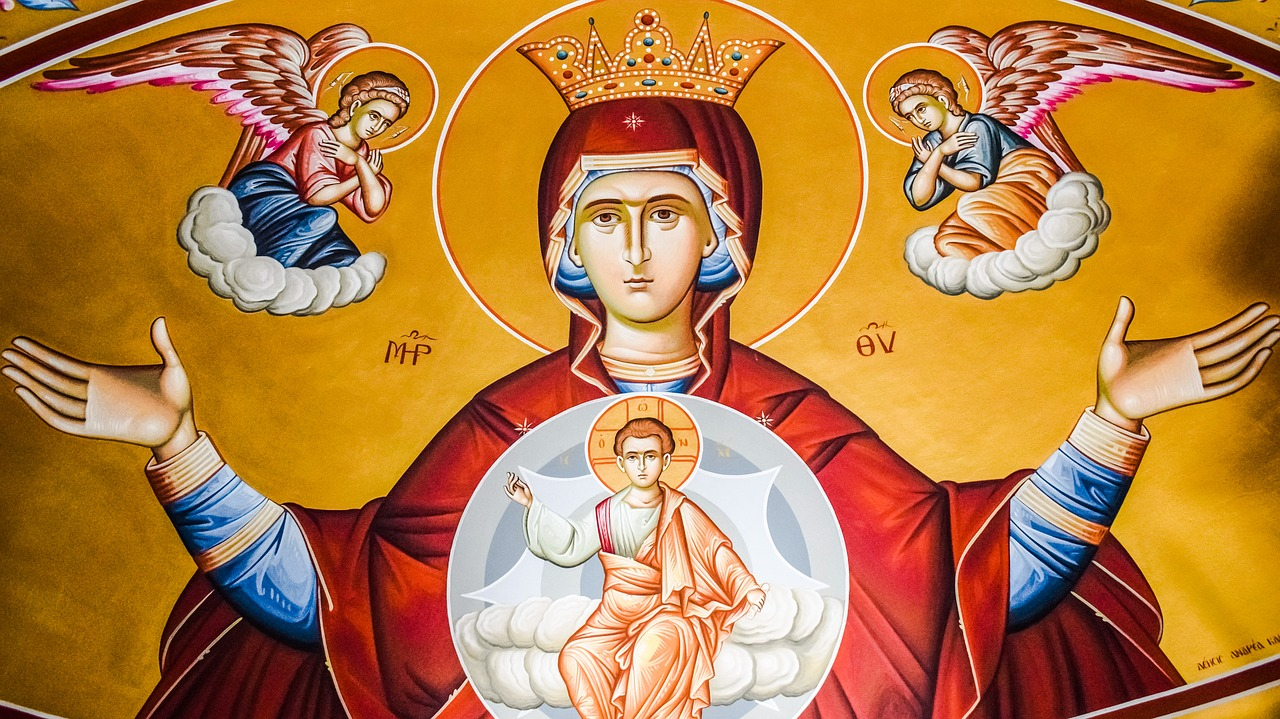 |
| “Rejoice, highly favoured one! The Lord is with you” (Lk 1:28) Humankind is galvanised by joyful news: God has become a child in Mary’s womb. God has become man and chosen to stay with us, forever! He comes into history and gives us his Mother, Mary, as a star to guide our path. It is a mystery of infinite love! May the joy of that night fill our hearts and make us bearers of this great message of love to humanity. Merry Christmas! |
Dec 20, 2017 | Focolare Worldwide
Towards Christmas “I knew that the company I was working for would soon close shop and I would soon be jobless. Despite this, as Christmas neared, my colleagues and I thought of setting aside a part of our salary for the poorer people. So we went to visit a family that lived in a shanty, deprived of all necessities. Besides the envelope with the money we also brought toys for the children. We departed happily: it seemed to us that it was best preparation for the birth of the Lord. But before the day ended, some good news arrived: we were ensured that we would work for another five months.” (J.L.V. – Mexico) Hunger «One day at school, I saw a little girl who was all alone in a corner. I immediately went and asked her, “Why are you crying?” She told me that she had stomach ache because she had not had breakfast and had nothing for lunch. I thought: “It is Jesus who is hungry” and gave her my sandwich. After a while that girl said to me: “Now my stomach is no longer aching.” I was so happy. (S.S – Philippines) I forgive! «I was playing with a friend of mine when a boy arrived and with no reason hit me on the head, and I had to go to the hospital to be treated. On returning home I had only one thought: revenge. The day after, that boy’s father came to ask forgiveness. And he added: “I give you my permission to do to my son what he did to you. Perhaps he will understand how badly he behaved!” At that point I remembered Jesus’s invitation to love one’s enemies and I answered him that I forgave him. Surprised, the father called his son, and so we made up and now live in peace.” (Dionisio – Angola) Stolen drillers While I was working in the office together with my colleague, Benda, who is Muslim, we heard a crash from outside. We went to look: someone had broken the glass of our van and had stolen three drillers. It was the first time a thing like that happened and we were inconsolable. Then the thought of forgiving the author of that act came to my mind, and who probably was pushed by necessity. Recalling a phrase of the Koran Benda added: “When a person forgives, what he was robbed of will be returned by someone else.” That evening, at home, while I was recounting the episode, one of my relatives offered me three drills which he wasn’t using anymore. The next day, he brought them, and one of them was similar to the more expensive drill that had been stolen. (A.G. – Italy)
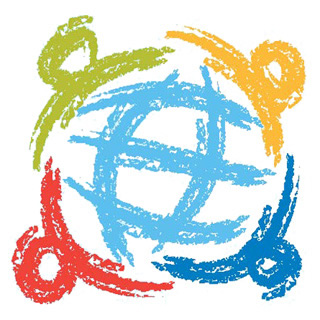
Dec 20, 2017 | Non categorizzato
 Instituted by the United Nations in 2005, and proclaimed on 20 December 2002, the world Solidarity Fund was created with the aim of promoting human and social development in the developing countries. Solidarity Day calls attention to respect for diversity and the importance of solidarity between people. If united and solid, humankind can more effectively oppose social injustice. Solidarity conceived as an understanding of the fundamental and universal values of human existence has to become the basis of the search for global solutions, and may carry out a decisive role in solving the world’s problems. Solidarity is indicated as the protagonist in the Millennium Declaration signed in September 2000 by all the member states of the UN, to counter economic, social, cultural and humanitarian injustice. The declaration elects such values as the pillar of international relationships in the 21st century.
Instituted by the United Nations in 2005, and proclaimed on 20 December 2002, the world Solidarity Fund was created with the aim of promoting human and social development in the developing countries. Solidarity Day calls attention to respect for diversity and the importance of solidarity between people. If united and solid, humankind can more effectively oppose social injustice. Solidarity conceived as an understanding of the fundamental and universal values of human existence has to become the basis of the search for global solutions, and may carry out a decisive role in solving the world’s problems. Solidarity is indicated as the protagonist in the Millennium Declaration signed in September 2000 by all the member states of the UN, to counter economic, social, cultural and humanitarian injustice. The declaration elects such values as the pillar of international relationships in the 21st century.

 “I’m working in Italy working with some other young people my age for the upcoming 2018 Genfest in Manila.” Preparations are in full swing for the first Genfest ever held outside Europe. Nelson joined the international group of teenagers who were already at work, ever since he arrived in Italy in 2017 – first in Loppiano and then at the international Gen2 centre near Rome where we are interviewing him. “I come from El Salvador, the least expansive but most populated country in Central America. It’s a beautiful place, but has recently been hit by a civil war that lasted for 12 years and ended in 1992, leaving the country completely destroyed.” Nelson explains; “After the end of the war, many families found themselves looking for a place to settle and many parents emigrated, leaving their children with relatives or anyone who would take them in. But in the midst of the overall bewilderment, this resulted in an entire generation of boys and teenagers who were left without guidance or direction, or even anyone to show some genuine interest in them. To that was added the complication of getting the money earned outside the country to its destination in El Salvador. Many of these boys were left deprived of everything and began to leave school and roam the streets, seeking in delinquency the attention that they hadn’t found anwhere else. In short, recruiting adolescents, some of them quite young, they formed into many criminall groups who became more and more rooted and dangerous, each with its own name and symbolism, rituals and gestures.” “To uproot what seemed at first a simple problem to solve, the government launched a plan, which was also very violent, inprisoning anyone with a tatoo. The result was an unprecedented escalation of ferocious violence from the gangs that began to kill for no reason, to threaten more and more young people, forcing them into their groups. Before moving to Italy, I worked in San Miguel at a Salesian school which was dedicated to more than a thousand students who come from outside the city every week. Many of them have serious family problems, or parents enlisted in criminal groups, or even worse, they themselves are on the verge of joining. I taught physical education. One day, during swimming class, a boy wanted to jump into the pool without removing his shirt, even though that was against the rules. He was nervous and afraid. So I took him aside so that I could talk to him alone. I asked him the reason why. He told me that he had had himself tattooed with the symbol of a group, and didn’t want anyone to know. I gave him permissioin to get into the water with the shirt on, but afterwards, in class, I returned to the topic and we began to talk about ways of finding alternatives to criminality. Then, for the rest of the year, we tried to explain to him all of us together, that there’s always a way out, another way to live, far from violence. A few months later I saw him proudly wearing a work uniform, he had managed to leave the group which, thanks be to God had left him in peace. Now he’s providing for his family. ‘Thanks Prof. Thanks to all of you who helped me to realize that I could be a different person from what I started out to be. Thank you mostly for helping me to change the direction of my life.’” Chiara Favotti
“I’m working in Italy working with some other young people my age for the upcoming 2018 Genfest in Manila.” Preparations are in full swing for the first Genfest ever held outside Europe. Nelson joined the international group of teenagers who were already at work, ever since he arrived in Italy in 2017 – first in Loppiano and then at the international Gen2 centre near Rome where we are interviewing him. “I come from El Salvador, the least expansive but most populated country in Central America. It’s a beautiful place, but has recently been hit by a civil war that lasted for 12 years and ended in 1992, leaving the country completely destroyed.” Nelson explains; “After the end of the war, many families found themselves looking for a place to settle and many parents emigrated, leaving their children with relatives or anyone who would take them in. But in the midst of the overall bewilderment, this resulted in an entire generation of boys and teenagers who were left without guidance or direction, or even anyone to show some genuine interest in them. To that was added the complication of getting the money earned outside the country to its destination in El Salvador. Many of these boys were left deprived of everything and began to leave school and roam the streets, seeking in delinquency the attention that they hadn’t found anwhere else. In short, recruiting adolescents, some of them quite young, they formed into many criminall groups who became more and more rooted and dangerous, each with its own name and symbolism, rituals and gestures.” “To uproot what seemed at first a simple problem to solve, the government launched a plan, which was also very violent, inprisoning anyone with a tatoo. The result was an unprecedented escalation of ferocious violence from the gangs that began to kill for no reason, to threaten more and more young people, forcing them into their groups. Before moving to Italy, I worked in San Miguel at a Salesian school which was dedicated to more than a thousand students who come from outside the city every week. Many of them have serious family problems, or parents enlisted in criminal groups, or even worse, they themselves are on the verge of joining. I taught physical education. One day, during swimming class, a boy wanted to jump into the pool without removing his shirt, even though that was against the rules. He was nervous and afraid. So I took him aside so that I could talk to him alone. I asked him the reason why. He told me that he had had himself tattooed with the symbol of a group, and didn’t want anyone to know. I gave him permissioin to get into the water with the shirt on, but afterwards, in class, I returned to the topic and we began to talk about ways of finding alternatives to criminality. Then, for the rest of the year, we tried to explain to him all of us together, that there’s always a way out, another way to live, far from violence. A few months later I saw him proudly wearing a work uniform, he had managed to leave the group which, thanks be to God had left him in peace. Now he’s providing for his family. ‘Thanks Prof. Thanks to all of you who helped me to realize that I could be a different person from what I started out to be. Thank you mostly for helping me to change the direction of my life.’” Chiara Favotti


 Cameroon
Cameroon








 “The memory of the honorary citizenship given to Chiara Lubich,” affirmed Mayor Orlando, “is an occasion to see the city’s progress, in the name of respect for the human being and the construction of a community founded on the values of unity and brotherhood: those on which Chiara had founded her movement and which today brings together millions of people worldwide. Today those values are part of the daily life of Palermo, with reception and solidarity which are the testing grounds, but also an extraordinary occasion to confirm the will of the Palermo people to build a city on a human scale and that welcomes others, as is continually demonstrated in civil society’s undertakings.”
“The memory of the honorary citizenship given to Chiara Lubich,” affirmed Mayor Orlando, “is an occasion to see the city’s progress, in the name of respect for the human being and the construction of a community founded on the values of unity and brotherhood: those on which Chiara had founded her movement and which today brings together millions of people worldwide. Today those values are part of the daily life of Palermo, with reception and solidarity which are the testing grounds, but also an extraordinary occasion to confirm the will of the Palermo people to build a city on a human scale and that welcomes others, as is continually demonstrated in civil society’s undertakings.” 
















 Mirvet Kelly’s grandfather was a deacon: “I remember going with him every Sunday to the Syro-Orthodox Divine Liturgy. I was proud to watch him all dressed in white as he recited his portion of the prayers at the altar.” There are several Christian Churches in Homs, Syria, where Mirvet grew up: Armenian Apostolic, Greek Orthodox and various Catholic Rites, Maronite, Melkite and Syro-Catholic. Before the war, even though we were linked to our own Churches, the faithful attended other Churches without any problem. “As I grew older,” she went on to say, “a lot of things changed: Grandfather died and the Divine Liturgy seemed long and outdated. I was the only Christian at school in the midst a lot of Muslims. At Christmas and Easter I’d be the only one absent and, when I returned, I was bombarded with questions: ‘Why are there so many Churches? Why was your Jesus crucified and rising from the dead on different dates in different Churches? Some friends and I decided to no longer belong to one Church or another, but to be Christians and that’s all. Like many of them, I stopped going to my own Church.” A
Mirvet Kelly’s grandfather was a deacon: “I remember going with him every Sunday to the Syro-Orthodox Divine Liturgy. I was proud to watch him all dressed in white as he recited his portion of the prayers at the altar.” There are several Christian Churches in Homs, Syria, where Mirvet grew up: Armenian Apostolic, Greek Orthodox and various Catholic Rites, Maronite, Melkite and Syro-Catholic. Before the war, even though we were linked to our own Churches, the faithful attended other Churches without any problem. “As I grew older,” she went on to say, “a lot of things changed: Grandfather died and the Divine Liturgy seemed long and outdated. I was the only Christian at school in the midst a lot of Muslims. At Christmas and Easter I’d be the only one absent and, when I returned, I was bombarded with questions: ‘Why are there so many Churches? Why was your Jesus crucified and rising from the dead on different dates in different Churches? Some friends and I decided to no longer belong to one Church or another, but to be Christians and that’s all. Like many of them, I stopped going to my own Church.” A














 It was a very unique “group photo” taken during a public presentation of the social budget of the Tassano Group in the presence of some of the protagonists and authorities. Over time the Group was transformed from a cooperative into a consortium, and from a consortium into a group of consortia. It is complex and made up of different parts, currently comprised of 33 cooperatives that offer diversified services to 4,700 direct users and 100 thousand indirect users in the northwest region of Italy, which arrives from a brief stretch away at the sea and Mediterranean farmland all the way to the snow-covered mountains of winter. It involves 700 employees formed in the spirit of the economy of communion. “It’s an economic approach that the world doesn’t follow,” Luigino Bruni explained, “but it exists. Businesses who follow it try to destine profits in three directions: a part for creating jobs, a part for helping the poor, and a part for spreading this culture. The Tassano story is a love story made of employees and work that generated wealth and values.”
It was a very unique “group photo” taken during a public presentation of the social budget of the Tassano Group in the presence of some of the protagonists and authorities. Over time the Group was transformed from a cooperative into a consortium, and from a consortium into a group of consortia. It is complex and made up of different parts, currently comprised of 33 cooperatives that offer diversified services to 4,700 direct users and 100 thousand indirect users in the northwest region of Italy, which arrives from a brief stretch away at the sea and Mediterranean farmland all the way to the snow-covered mountains of winter. It involves 700 employees formed in the spirit of the economy of communion. “It’s an economic approach that the world doesn’t follow,” Luigino Bruni explained, “but it exists. Businesses who follow it try to destine profits in three directions: a part for creating jobs, a part for helping the poor, and a part for spreading this culture. The Tassano story is a love story made of employees and work that generated wealth and values.” 
















